Maps & Merlot

African Safari Travel Tips: 20 Top Things to Know Before Going on Your First Safari
Welcome to the wild and wonderful world of African safaris! If you’re anything like me, you’ve probably dreamed about going on an African safari for as long as you can remember. The thought of being immersed in the breathtaking landscapes, encountering majestic wildlife, and creating unforgettable memories is simply irresistible. Well, guess what? I FINALLY had the opportunity to embark on my first safari, and let me tell you, it was an experience like no other. But here’s the best part: I learned so much along the way, and now I’m here to share my top 20 African safari travel tips with all of you.
From picking the right time to visit to packing the right gear, and from capturing jaw-dropping photographs to avoiding the less pleasant nuisances (dust, malaria), these tips will help ensure that your first safari is nothing short of extraordinary. So, grab your binoculars, pack your khaki, and join me as we delve into the 20 things you need to know before going on your first African safari!
This post may contain affiliate links.
Overview: African Safari Travel Tips
In case you need it, here are your top African safari travel tips and the best things to know before going on your first safari. I get into loads of detail below, but keep this list as a cheat sheet!
- Pick the Best Time to go on Safari
- Plan for At Least 1 Week
- Incorporate a Rest Day After Your Flight
- Plan for Laundry
- Dress the Part
- Prepare for Cold, Heat, Rain, & Sun
- Purchase (or Rent) Quality Camera Gear
- Take lots of Photos
- Bring Binoculars
- Decision Time: Private Guide vs. Group
- Wake Up Early
- Bathroom on Safari
- Prepare for Dust
- Be Medically Prepared
- Enjoy Sundowners
- Patience is Key
- Communicate with Your Guide
- Bring Cash for Tips
1. Pick the Best Time to go on Safari
Choosing the best time to go on safari is a key factor in ensuring an incredible wildlife experience. I went to Tanzania in the first week of September, precisely when the Great Migration of wildebeest was putting on its grand show across the Mara River. From July to October, millions of wildebeest, zebras, and gazelle journey across the Serengeti in the “Great Migration.” But the real showstopper is the river crossing—wildebeest braving crocodile-infested waters and avoiding rampaging hippos. One word of advice, though: during popular times like the Great Migration, top safari lodges and tour operators can fill up over a year in advance.

However, it’s important to note that the best time to go on safari may vary depending on the specific wildlife sightings you desire and the region you plan to visit. Each season and month offers unique experiences and opportunities, from calving season to the epic river crossings.
In general, the dry season, which typically occurs in winter months, tends to be high season; vegetation is thinner and wildlife tends to congregate around water sources, making animals easier to spot. However, it’s worth noting that the dry season can also be the busiest and most expensive period, as it attracts a larger number of tourists.
On the other hand, you have wet season, which typically occurs in the summer months. The landscape becomes lush and vibrant, and you have more newborn animals. For example, wildebeest calving season usually occurs in the Southern Serengeti in the January-March timeframe, so if seeing baby wildebeest is your ultimate goal, this is your time to go! Although game viewing can be more challenging due to thicker foliage, the wet season tends to have fewer crowds and lower rates for accommodations.
2. Plan for At Least 1 Week
Stay longer than you think! When it comes to going on an African safari, it’s crucial to allocate enough time for your adventure. While you may be tempted to squeeze it into a few days, trust me, you’ll want to extend your stay. The captivating landscapes and incredible wildlife sightings deserve more than just a fleeting visit – every day is different and catching sight of the animals in their natural habitats almost becomes addicting!
I’d recommend allocating at least a week to your safari adventure. Plus, the flights from the US tend to be ridiculous (I think ours was around 30 hours), so I definitely was not in any hurry to get back on the plane and rush home. You won’t regret it, and your safari experience will be all the more rewarding.
3. Incorporate a Rest Day
After a long journey to Africa, it’s essential to allow yourself some time to rest and adjust to the new time zone before embarking on your safari adventure. Consider scheduling a rest day upon arrival to recharge your energy and acclimate to the surroundings. Use this day to relax, explore the area, and get a sense of the local culture. It will ensure that you start your safari feeling refreshed and ready for the incredible experiences that lie ahead.
I am usually not one to pencil in a rest day, but I cannot stress this enough. I landed at 10pm the night before and in no way would have been ready to go on safari the following day. Instead, I caught up on sleep, enjoyed a fresh breakfast, and then spent some time at Kikuletwa Hot Springs. If you’re going on safari in Tanzania and flying into Arusha, I would highly recommend this as a chill day 1 option. This is one of the key African safari travel tips for first-timers.
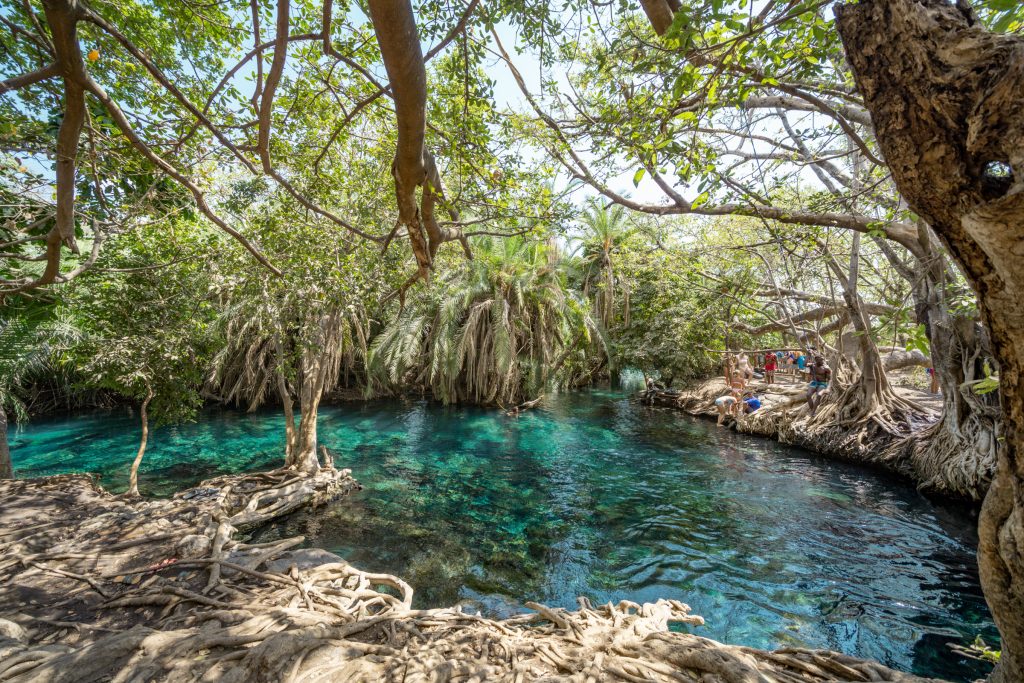
Recommended Tour : Kikuletwa Hot Springs Tour
4. Pack Light
When preparing for your African safari, it’s essential to pack light and efficiently. Keep in mind the baggage allowance on bush planes, as they often have strict weight restrictions. The restrictions also vary by airline. Some allow 15kg (33 lbs), while others allow 20kg (44lbs); some are super strict about hard-sided bags, while others are more lenient. It is definitely worth to investigate in advance.
When packing, choose versatile clothing items that can be easily layered and re-worn. This allows you to maximize your outfit options while minimizing the amount of luggage you need to bring. Plus, some safari camps offer laundry services, so you can refresh your clothes during your stay. I was able to get laundry done mid-trip, so I really only needed a handful of outfits. Plus, you can easily re-wear pants day over day.

5. Plan for Laundry
Speaking of laundry…when it comes to laundry on safari, many hotels offer convenient laundry services to keep your clothes fresh and clean during your adventure. However, it’s important to note that for cultural reasons, the staff do not handle the washing of women’s undergarments, so you’ll need to take care of these items yourselves.
Keep in mind that in more remote or mobile migration camps, laundry facilities might not be readily available, so seize the opportunity to do laundry when it’s offered. I had access to laundry at both of my traditional hotels, but it was not available at the migration camp. Making the most of the available options ensures that you’ll be able to pack minimally and have clean clothing throughout your safari experience.
6. Dress the Part
Dressing the part for a safari is one of the most talked about African safari travel tips. When venturing into the wild, it’s important to dress appropriately to adapt to the environment and weather conditions. Go for lightweight, breathable clothing in neutral colors such as khaki, light grey, light blue, and olive green. These colors help you blend in with the environment. If you’re wondering how in the world to look cute while rocking khaki, don’t worry! I put together a guide on what to wear on safari for women .
Related Post : What to Wear on Safari for Women: 10 Cute Safari Outfit Ideas
Choose long-sleeved shirts and pants to protect yourself from the sun, bugs, and prickly grass. Don’t forget a wide-brimmed hat to shield yourself from the sun’s rays and questionable hair days! Comfortable closed-toe shoes are a must for walking safaris, and I also preferred them even on game drives for whenever I exited the vehicle (bathroom time). Layering is key as temperatures can vary throughout the day, so pack a fleece for chilly mornings or evenings.
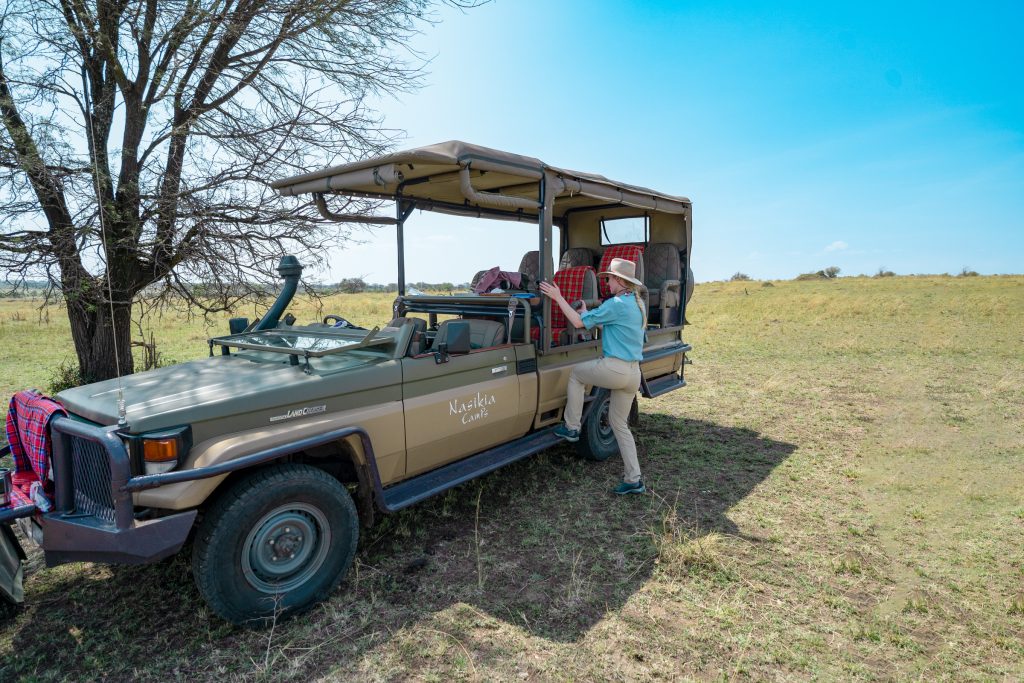
7. Prepare for Cold, Heat, Rain, & Sun
Africa’s climate can be unpredictable, so it’s crucial to come prepared for all types of weather conditions. While the days may be warm and sunny, the evenings and early mornings can get quite chilly. Pack a mix of lightweight and warm clothing, including long-sleeved shirts, fleece jackets, and a good pair of comfortable closed-toe shoes. Don’t forget a hat, sunglasses, and sunscreen to protect yourself from the African sun. Additionally, pack a raincoat in case of sudden rain showers.
During my time in Tanzania, I can confirm that I experienced 40 degree swings in temps during a single day, sudden downpours, tons of dust, and plenty of African heat. Being prepared for various weather scenarios ensures that you can fully enjoy your safari adventure, rain or shine.
8. Purchase (or Rent) Quality Camera Gear
Photography plays a significant role in capturing the magic of your African safari adventure. Invest in quality camera gear to ensure you can capture those memorable moments of hippos yawning, lion cubs playing, and rhinos charging across the Serengeti at sunrise (yes, we saw all of that!)
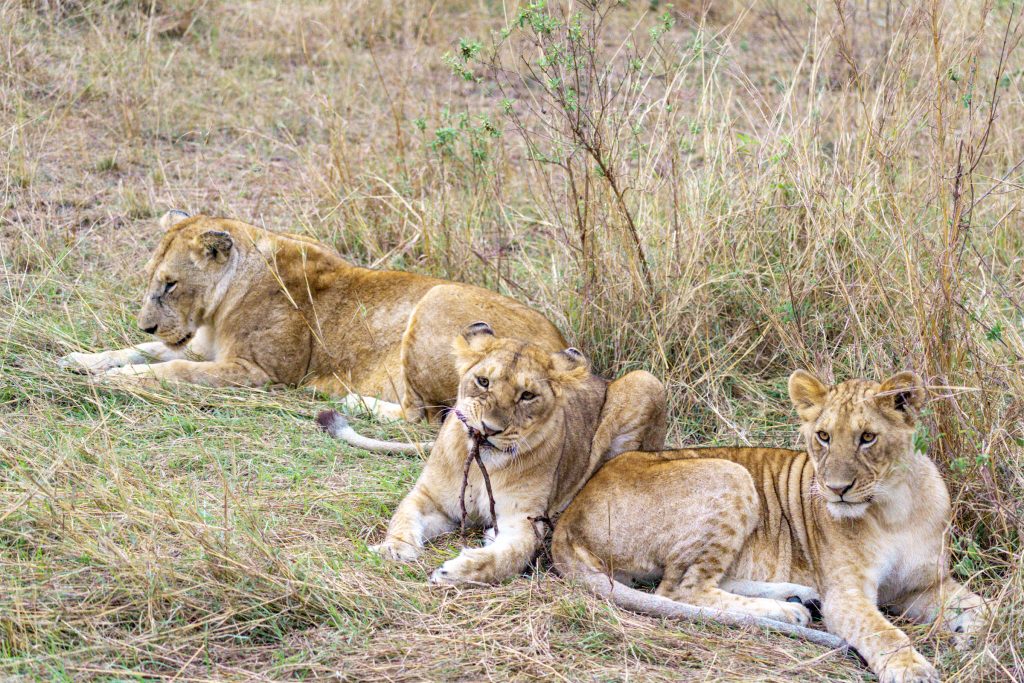
If you don’t have your own equipment, consider renting professional-grade cameras and lenses from reputable providers. Having the right gear will enable you to capture stunning wildlife shots and breathtaking landscapes. You may be tempted to quit your job and become the newest member of the Nat Geo photography team…I know I was! Make sure to familiarize yourself with your equipment before your safari, so you can make the most of every photographic opportunity. Safari photography is very different than my traditional travel photography (people and landscapes), so I’d definitely recommend exploring the best camera settings for safari photography and these African safari photography tips !
Related Post : Best Camera Settings for Safari Photography
9. Take Lots of Photos
Prepare to channel your inner wildlife paparazzi! On the first day of your safari, you might find yourself in a frenzy, snapping away at zebras like a camera-crazed tourist. And that’s perfectly understandable (and definitely what I did)! However, as the days go by and you’ve accumulated numerous wildlife photos, you’ll likely become more selective in snapping pictures. By the last day, the only times a zebra made it onto my camera roll was if it was an adorable baby, all fuzzy and irresistibly cute, and the one time when a zebra walked onto the airport runway in the Serengeti – that was a sight to see!
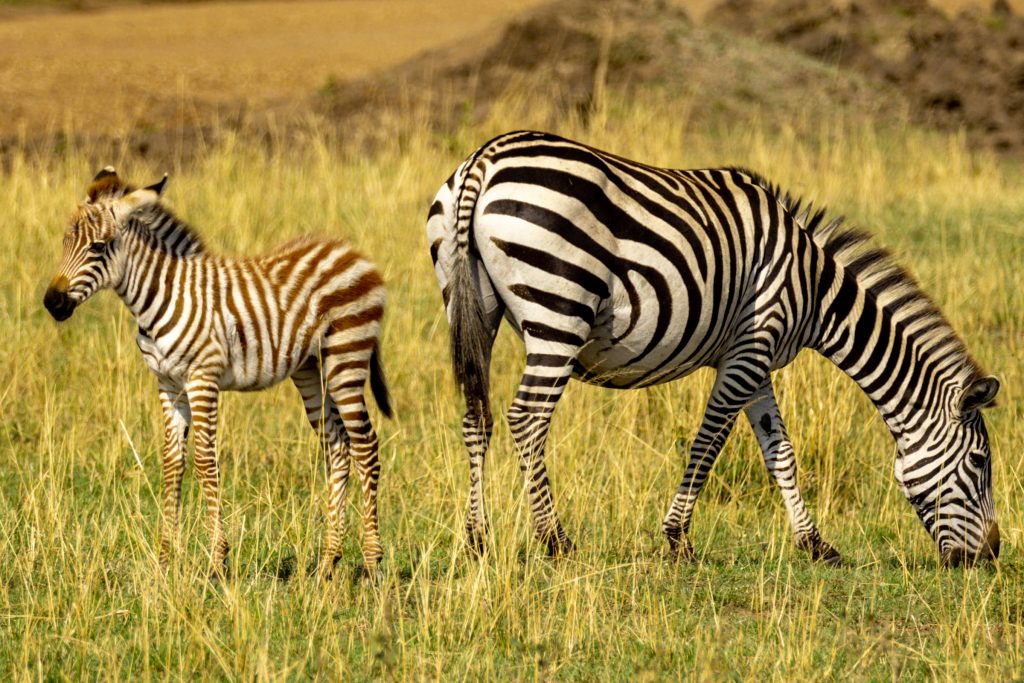
In any case, let your camera lens capture the extraordinary moments, the mischievous antics of wildlife (we got to see two male giraffes in a ridiculous neck-swinging fight over a female giraffe), and the jaw-dropping sunsets over the Serengeti. Get creative, experiment with different angles, and remember to take the time to appreciate the animals in person and not just through your camera’s viewfinder.
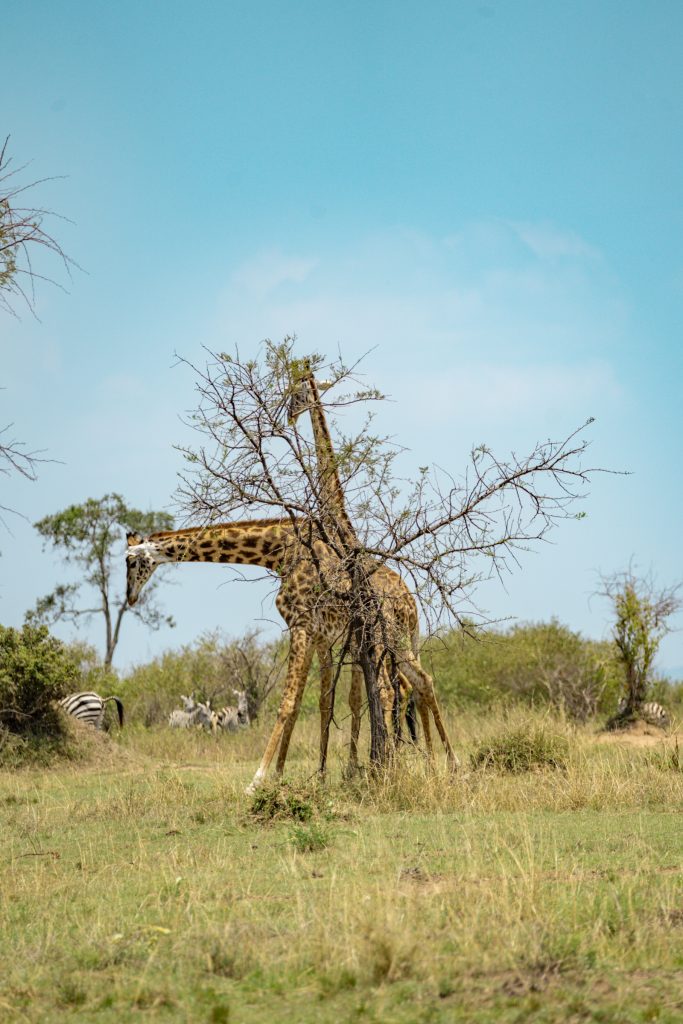
10. Bring Binoculars
Bringing a pair of binoculars on your safari is one of my top African safari travel tips. It allows you to get a closer look at the incredible wildlife that may be far off in the distance. Even with contacts, I have pretty horrendous eyesight, so my binoculars were an absolute lifesaver! We spotted our first lion through the binoculars and caught a good view of a leopard lounging in a tree, as well. Some safaris do provide binoculars for their guests, but it by no means a given, so I would recommend checking in before your safari.
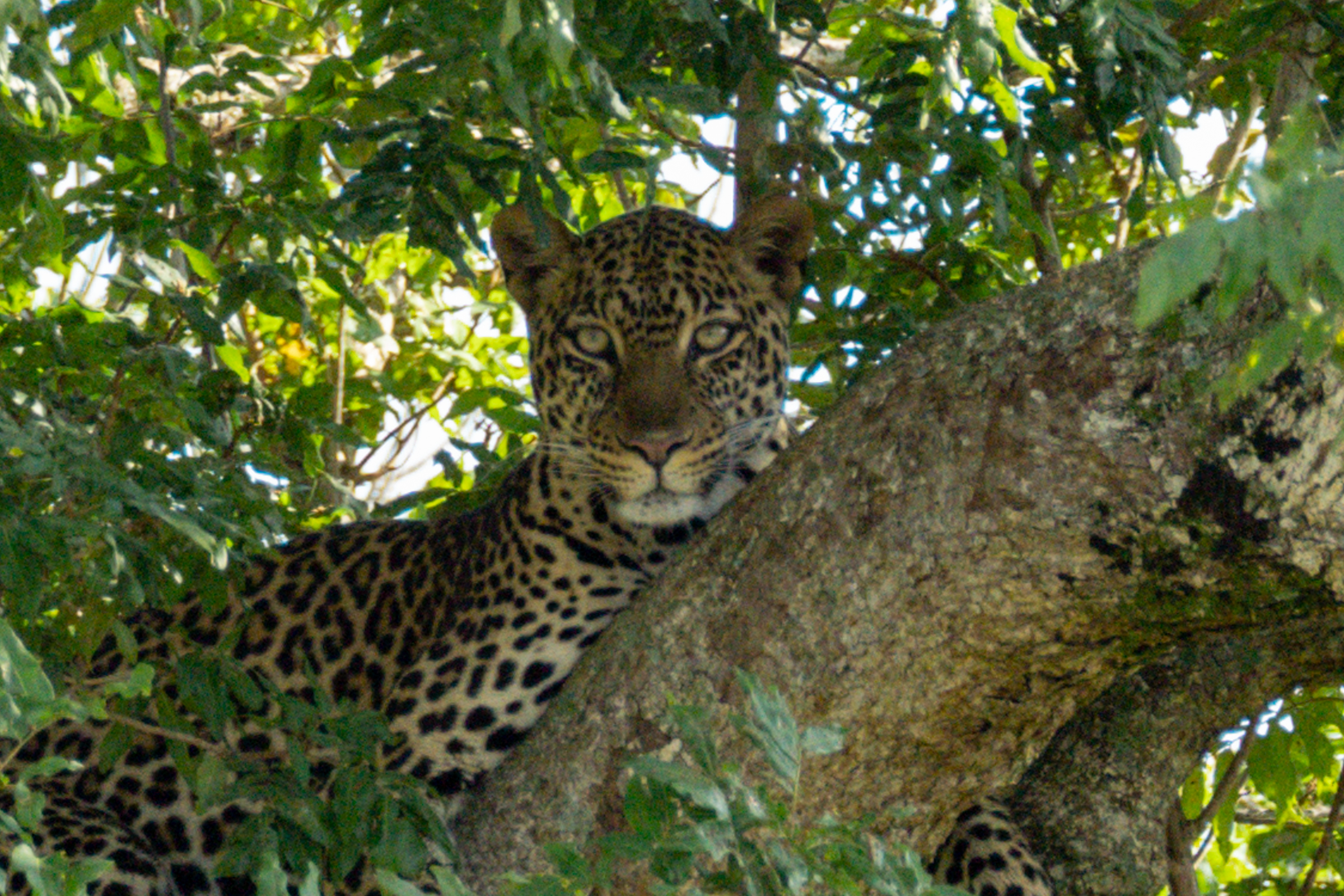
11. Decision Time: Private Guide vs. Group
When planning a safari, one important decision to make is whether to choose a private guide or group safari experience. Group safaris are typically slightly cheaper as the costs are shared among a larger number of participants. However, keep in mind that group safaris typically have fixed departure times and itineraries, which may limit your flexibility. Additionally, you’ll be sharing the safari vehicle with other travelers, all of whom may have different preferences. This can sometimes lead to compromises on the specific sightings or activities you’d like to prioritize. Another aspect to consider is the seating arrangement in the vehicle. With a group safari, you may not always get the best seat for optimal wildlife viewing or photography.
On the other hand, private safaris offer more freedom and flexibility. While they tend to be more expensive, you have the luxury of designing your own itinerary, choosing your preferred departure date and time, and tailoring the experience to your specific interests. You’ll have the vehicle all to your group, ensuring maximum comfort and the freedom to spend as much time as you desire at each sighting. For me, I decided on a private guide so that I could have all of the flexibility in deciding my itinerary. If you are comfortable with the higher budget, I would absolutely recommend this option.
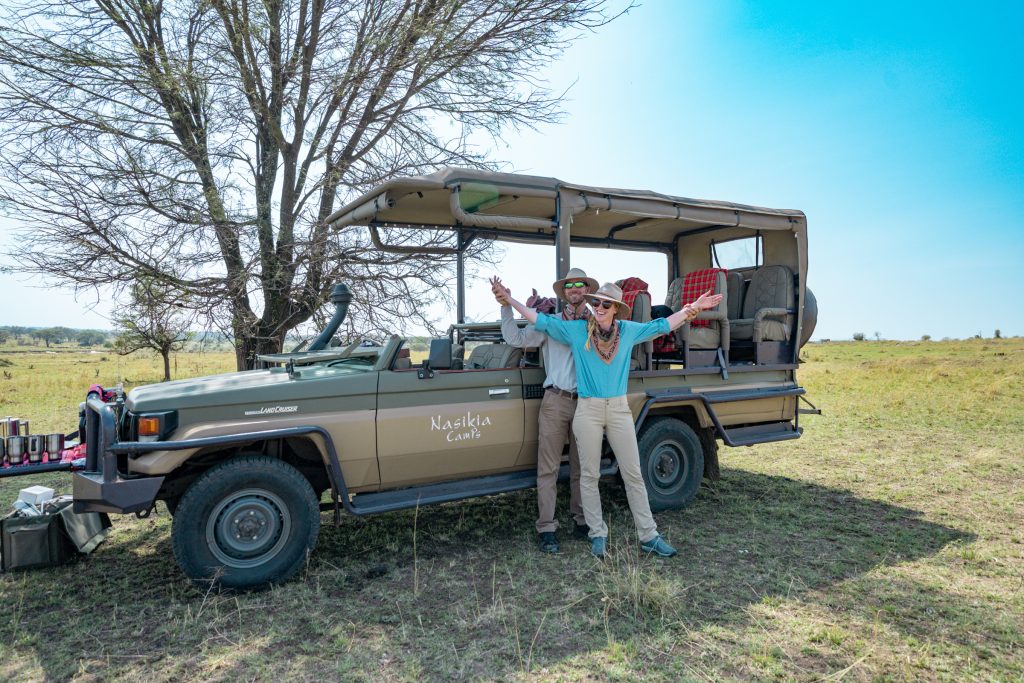
12. Wake Up Early
One of the most thrilling aspects of an African safari is observing wildlife in their natural habitat. Animals are most active during the early morning and evening, making these the prime times for game drives and wildlife viewing. Trust me on this…most times we saw lions during the day, they were stretched out and snoozing.
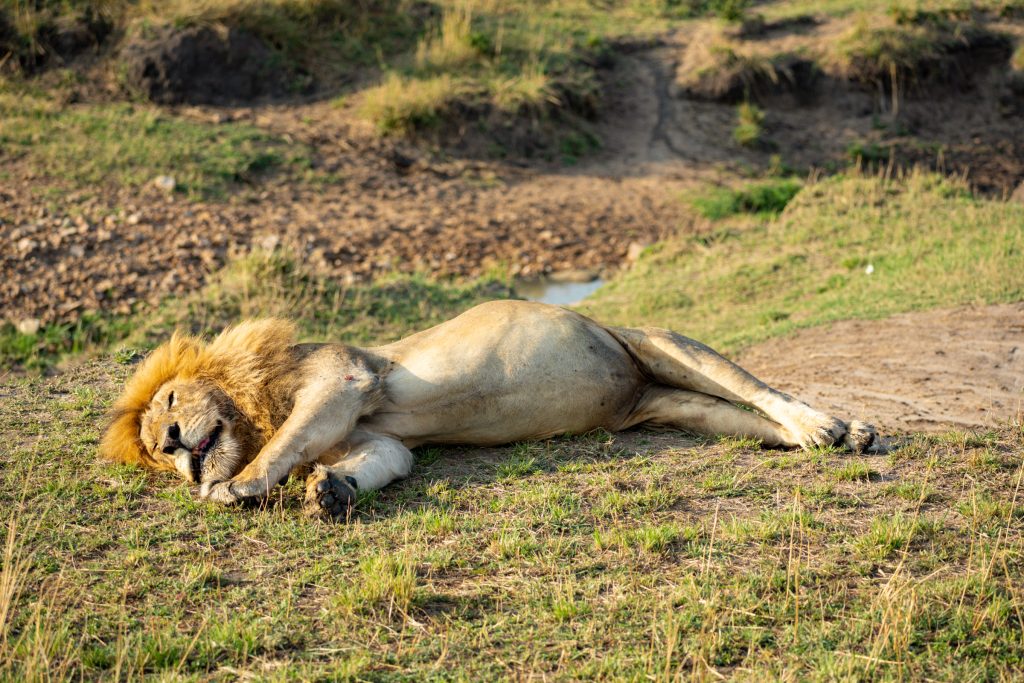
Set your alarm clock and embrace the early wake-up calls. By venturing out at dawn, you’ll have the chance to witness incredible animal behaviors, catch stunning sunrises over the Serengeti, and enjoy the peacefulness of the wilderness before the heat of the day sets in.
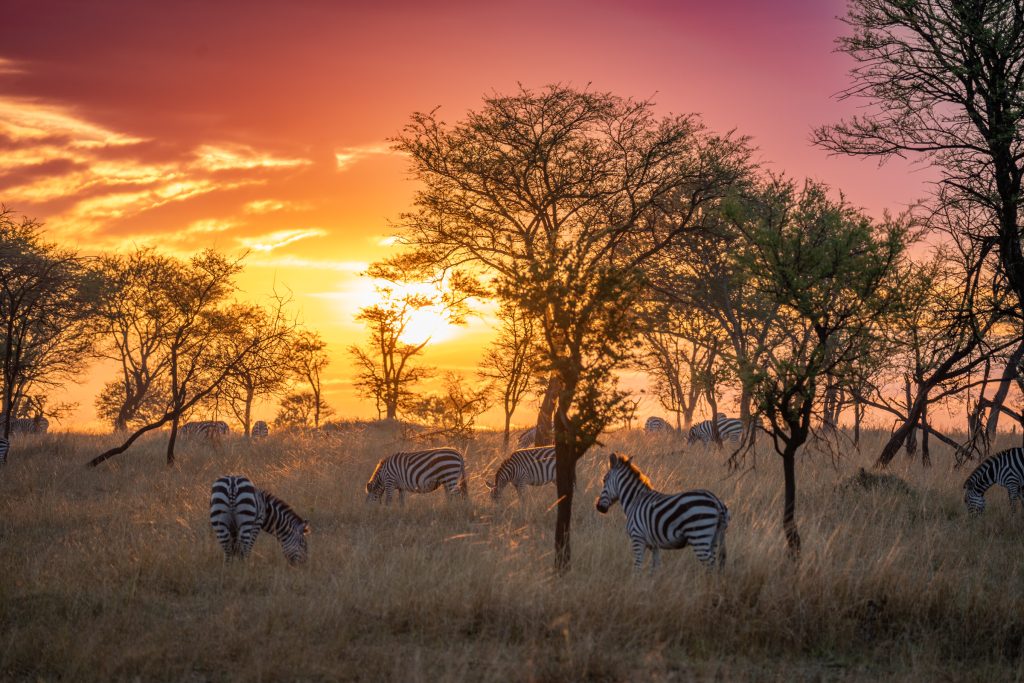
13. Bathroom on Safari
When nature calls on safari, it’s a unique experience that requires a bit of creativity. The bathroom situation in the wilderness is obviously quite different from the comforts of home. To give you an idea…my most common “bathroom” on the Serengeti was behind any number of tall termite mounds.
Remember, your safari guide is there to ensure your safety, and that even extends to bathroom breaks. Before bathroom breaks, they’ll scout the area to make sure it’s clear of any potential danger. Ladies, you might hear your guide suggesting to “pick a flower” as a discreet euphemism, while gentlemen may be asked if they’d like to “check the tires.” It’s all part of the adventure, so embrace the humor and follow their lead. Just remember to respect the environment and leave no trace behind.
14. Prepare for Dust
Dust, the not-so-glamorous companion on your safari adventure. As a contact lens wearer, I quickly learned the art of keeping my eyes protected from the ever-present dust. Carry extra contact lens solution, eye drops, and a spare pair of lenses, just in case. I’d also recommend keeping your sunglasses on – even when it’s not that sunny – they work great as an extra layer of protection for your eyes. A handy bandana is also helpful to pull up over your mouth during particularly dusty patches.
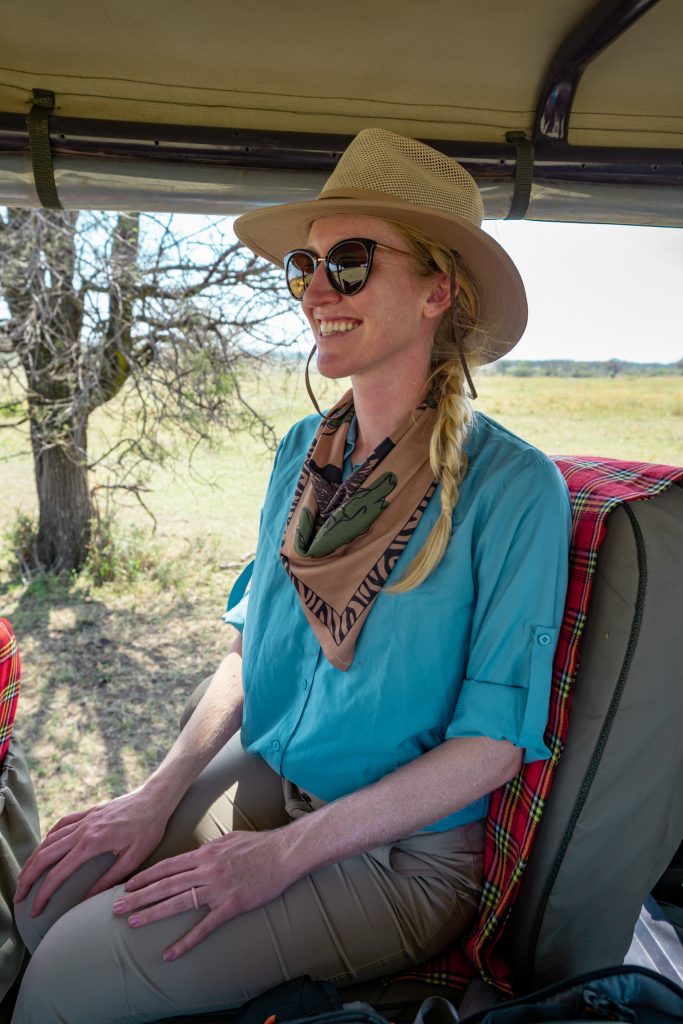
And don’t forget about your camera lenses! Dust has a sneaky way of finding its way onto them, causing potential smudges. Keep a lens cleaning kit in your day bag for quick lens cleaning, and keep your lens cap on when not using the camera. Remember, dust may be inevitable, but with a bit of preparation, you’ll be ready to conquer the dusty safari trails like a pro!
15. Be Medically Prepared
Being medically prepared is one of the key African safari travel tips for first-timers. Before your trip, make sure you visit a travel clinic or consult with your healthcare provider, and check the CDC’s recommendations to ensure you are up to date on any recommended vaccinations.
In addition, make sure to pack some bug spray to protect you from those pesky bugs and potential diseases they may carry. You won’t find a convenient CVS in the heart of the Serengeti, so it’s crucial to pack a well-stocked first-aid kit that includes essential items like band-aids, Cortaid, Advil, Pepto, and any personal medications you may require. Taking these precautions will provide peace of mind and ensure that you’re ready to handle any minor health concerns that may arise during your safari expedition.
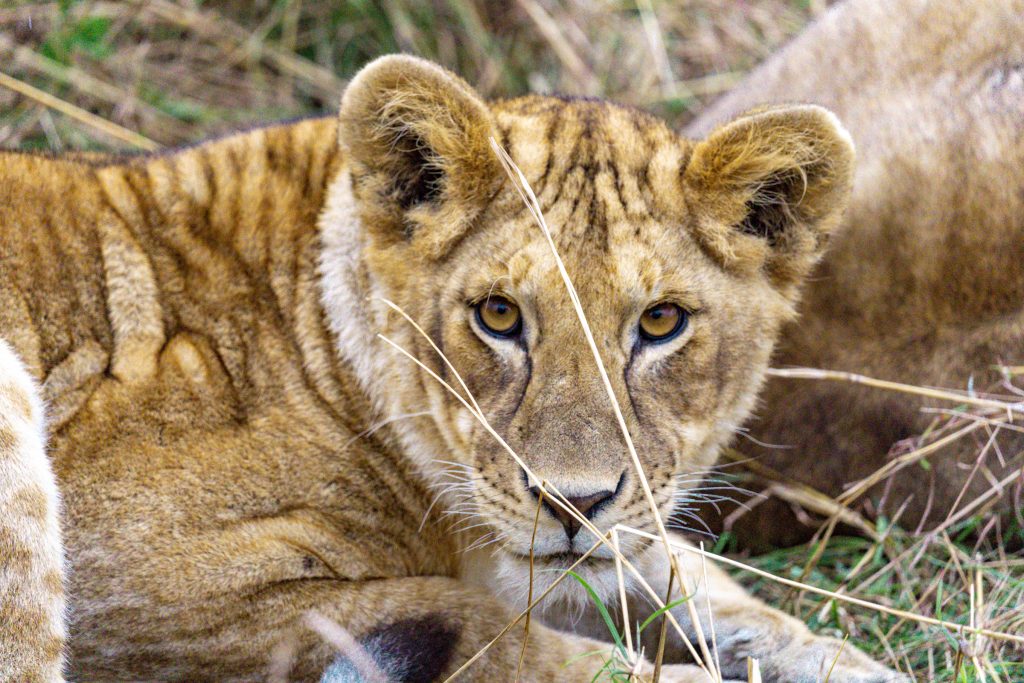
Like this post?! How about…
14 Outstanding African Safari Photography Tips
16. Enjoy Sundowners
Ah, the magical time when the sun begins its descent over the Serengeti. It’s the perfect moment to unwind and indulge in a tradition long cherished by safari-goers – the legendary “sundowners.” Picture this: sipping on your favorite beverage, feeling the gentle breeze on your face, and toasting to the day’s wildlife encounters. This was definitely one tradition I could get behind. Cheers to nature’s happy hour!
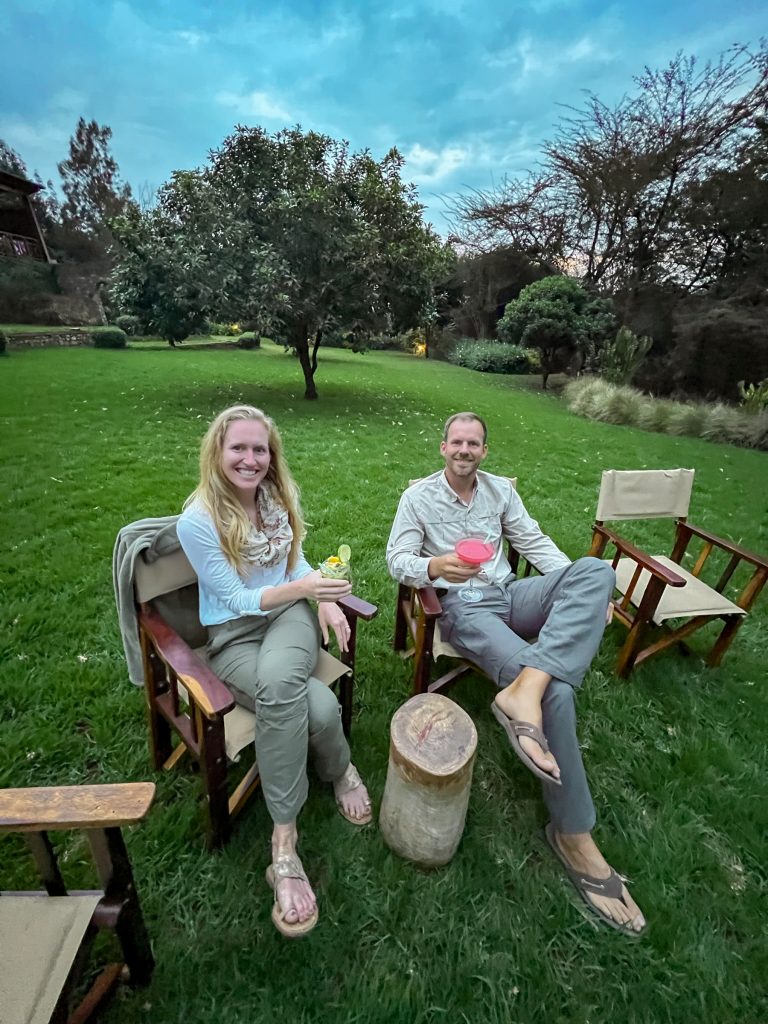
17. Snack Time
Snack time on safari is a delightful surprise that adds an extra touch of magic to your wildlife adventure. During my first game drive in Tarangire National Park, our safari guide announced a break for morning tea and snacks. I was totally unsure of what to expect considering that we were surrounded by water buffalo and in the middle of nowhere. Cue my surprise when we get hot tea, delightful biscuits, and more – all served on a checkered tablecloth! And it wasn’t just our first day…every morning and afternoon that we were out on safari, we were treated to a delightful spread for snack time. I was 100% on board with this custom!
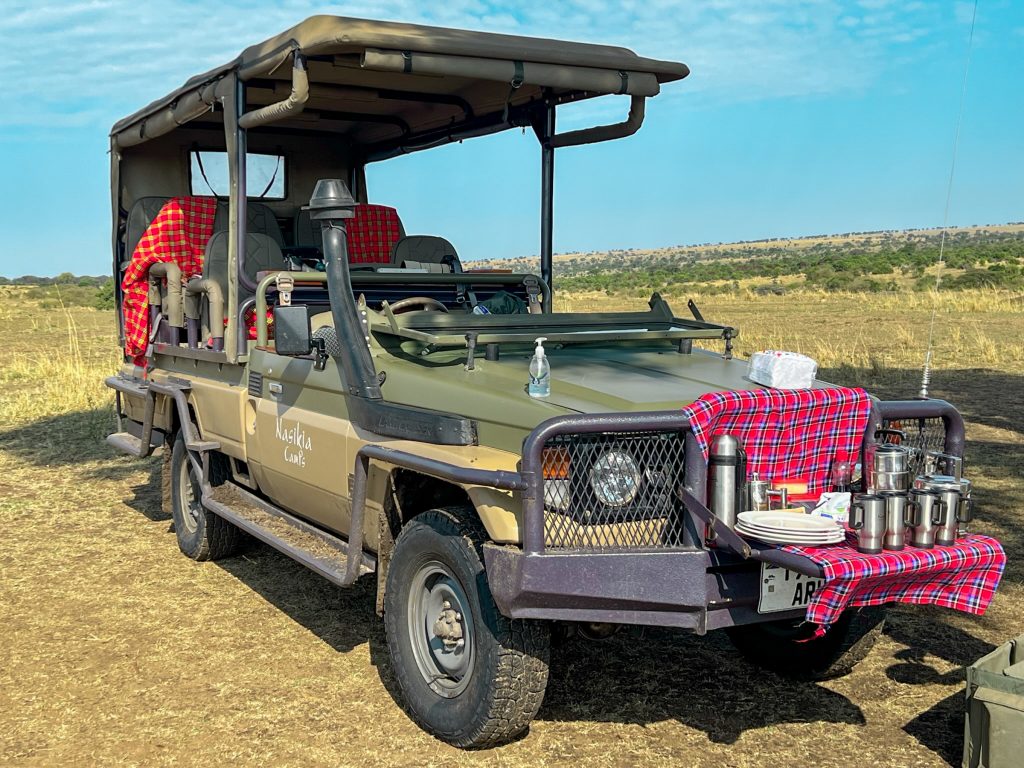
18. Patience is Key
When it comes to safari adventures, patience truly is key. Animals in the wild operate on their own time, and definitely don’t adhere to any schedule. It’s important to embrace this unpredictability and understand that the best sightings often come to those who wait. If you find yourself waiting at a specific spot during your game drive, trust that your guide has a good reason for it. Safari guides are experts in their field and have an uncanny ability to anticipate animal behavior.
To give you an idea…for the wildebeest river crossing (photo below), we waited on and off for nearly six hours! During that time, we would sometimes go and look at other animals, but we never strayed far from the river. We had seen smaller crossings while we were there, but this crossing was on a completely different scale with thousands of wildebeest all crossing at once. The crossing was a huge bucket list item for me, and I am SOOO glad that I had the patience to wait it out. Even if you impatient like me, remember that patience is one of the most important African safari travel tips.
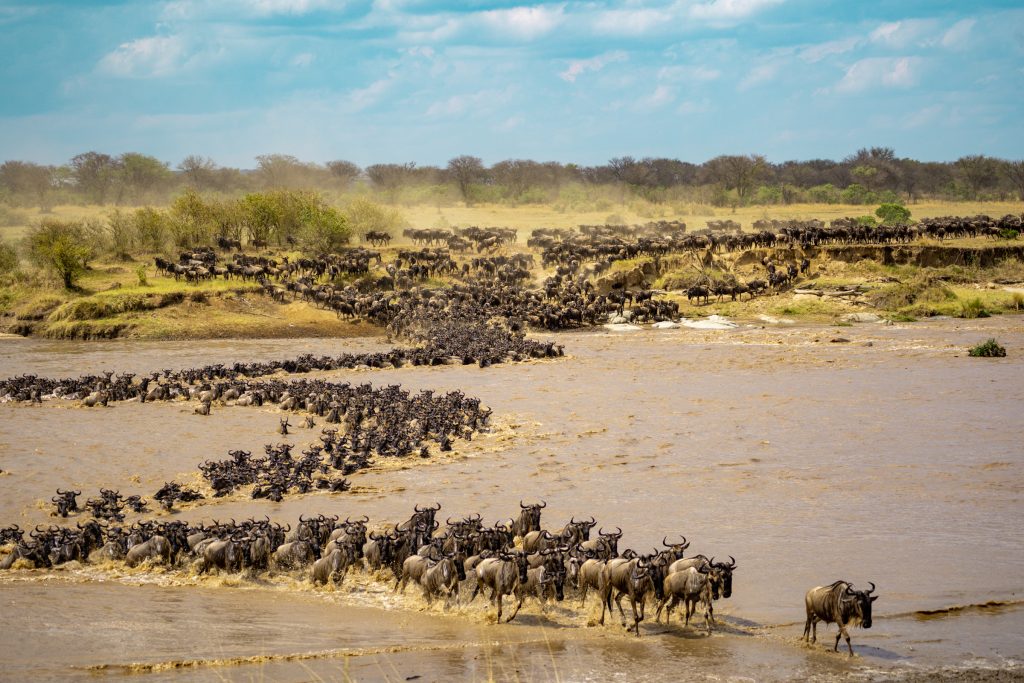
19. Communicate with Your Guide
When on safari, don’t hesitate to ask your guide plenty of questions. They are a wealth of information and have quite literally studied for years to become a guide. However, it’s important to be mindful of your surroundings and respect the environment. You do not want to be “that person” who disrupts the tranquility by loudly calling out or making unnecessary noise at inopportune times. Instead, observe quietly and engage with your guide at appropriate moments.
Aside from learning from your guide, you also need to respect your guide and follow all safety rules. Respecting the instructions of your guide ensures that you navigate the safari experience in a way that minimizes potential risks. Safari guides are well-versed in reading animal behavior and will maintain a safe distance to ensure that the animals’ natural behavior is not disturbed while still working to provide you the best safari experience possible. Remember that we are guests and need to respect both the animals and their environment.
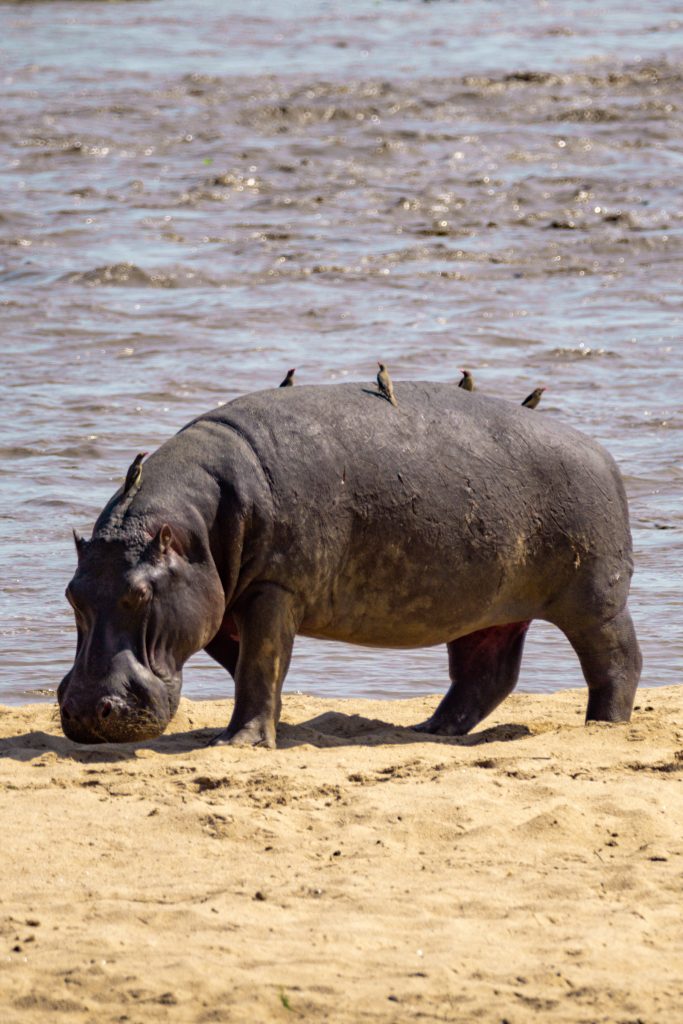
20. Bring Cash for Tips
The last of your African safari travel tips is to bring plenty of cash to tip! Tipping on safari is an important aspect, as it helps show appreciation for the exceptional service provided by the staff. While tipping practices can vary between countries and lodges, it’s highly recommended to have some cash on hand to tip the guides, drivers, porters, camp staff, etc. Based on your destination and level of stay, I’d look into tipping suggestions to ensure you’re offering an appropriate amount. Remember, tipping is not mandatory, but it’s a gesture of gratitude that can make a positive impact on the hardworking individuals who make your safari experience truly remarkable.
That wraps up my top 20 African safari travel tips for first-timers. With these African safari travel tips in mind, you’ll be well-prepared to make the most of your adventure. From choosing the right time to go, packing the essentials, and embracing the thrill of wildlife encounters, your journey into the wild promises unforgettable moments and treasured memories. Remember, being a first-timer is an opportunity to embrace the unknown and let the wonders of the safari unfold before your eyes. Happy safari-ing!
For some more travel inspiration, check out some of the posts below!
Tanzania : Kikuletwa Hot Springs: 14+ Things to Know Before You Go Safari Photography Camera Settings : Best Camera Settings for Safari Photography Safari Photography Tips: 14 Outstanding African Safari Photography Tips Safari Outfits: What to Wear on Safari for Women: 10 Cute Outfit Ideas Tented Safari Camps : Top 13 Things You Always Wanted to Know About Tented Camps Tanzania Itinerary : Tanzania 7 Day Itinerary
You May Also Enjoy:
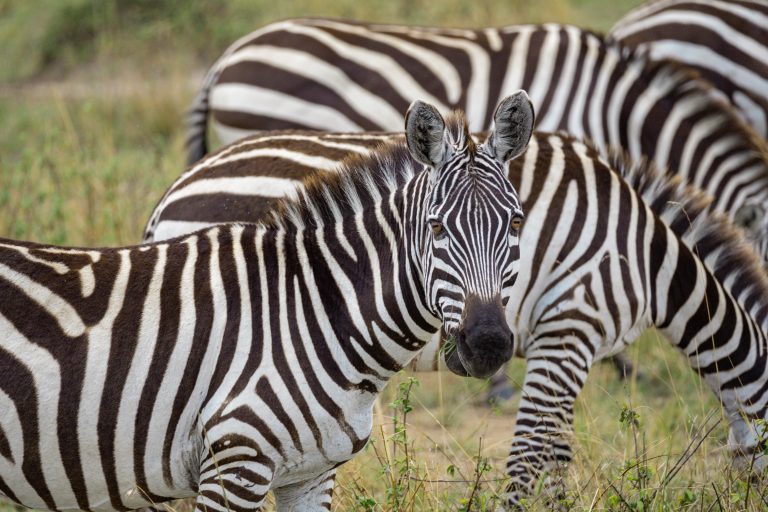
Tanzania Unveiled: Plan Your Tanzania 7 Day Itinerary
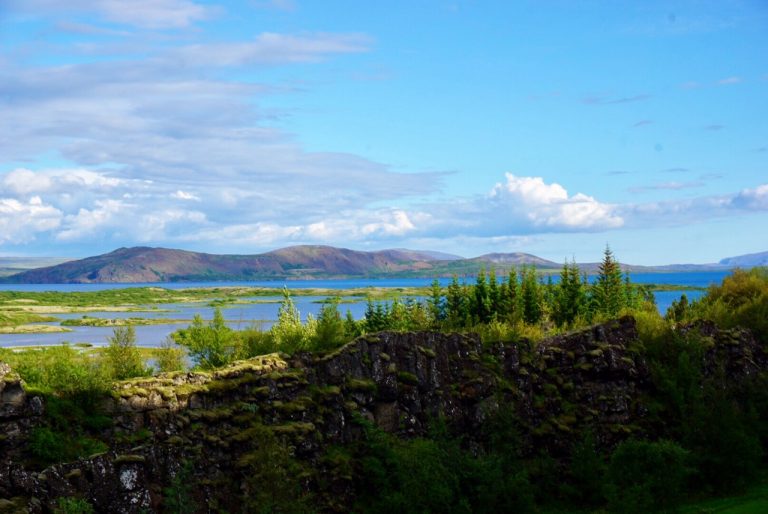
The Ultimate Guide to Iceland’s Golden Circle

10 Top Tourist Attractions in Jordan
Pin for later:.
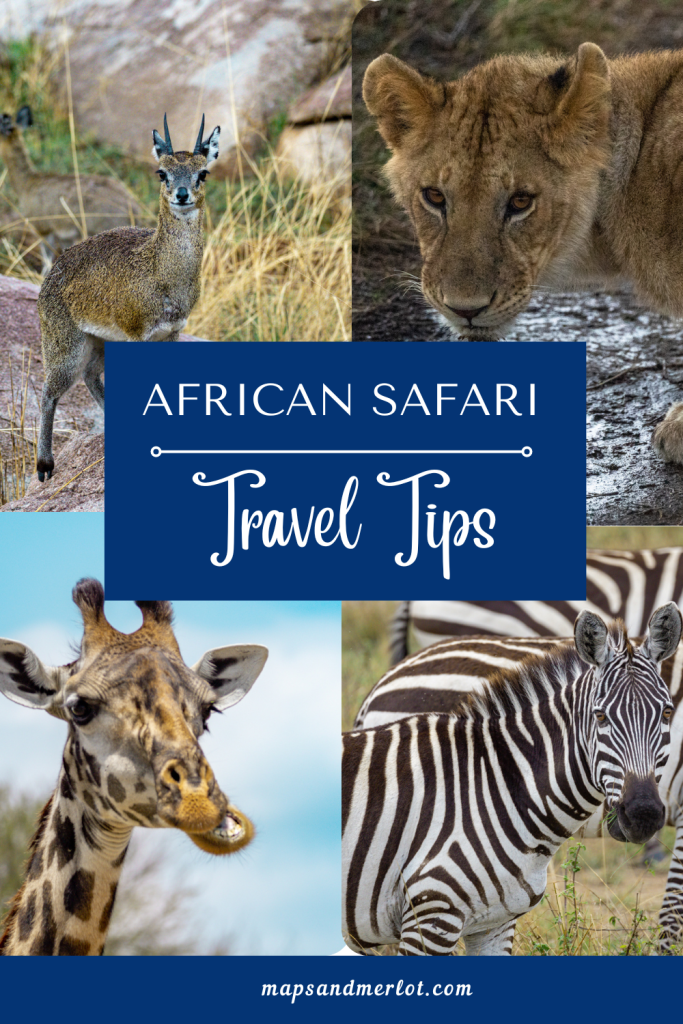
- 2 Night Victoria Falls Safari Lodge Package
- 3 Night Chobe Safari Package
- 4 Day Luxury Chobe Safari
- Victoria Falls
- Hwange National Park
- Chobe National Park
- Okavango Delta
- Bazaruto Archipelago
- Livingstone
- >> BUILD YOUR OWN SAFARI
- Lower Zambezi River
- Kenya Safaris
- Tanzania Safaris
- Kruger National Park
- Johannesburg
- Eastern Cape
- Victoria Falls Activities Specials
- Vilanculos Activities
- Travel Information
17 “Out Of The Ordinary” Questions You Should Be Asking When Planning A Safari.
Destinations.
- South Africa
- Mozambique
- East Africa
Recent Articles

Not The Big Five

How To Plan A Trip To Victoria Falls Like a Travel Professional.

Visa Requirements For Visiting Zimbabwe.

The Best Activities in Livingstone

The Best Activities in Victoria Falls

Covid Protocols for Zimbabwe, Zambia, Botswana and South Africa.

Planning Your African Safari : 10 Things to Consider.

Botswana Tourism Development Levy

A Guide To The Rapids Of The Mighty Zambezi River

Victoria Falls International Airport Welcomes Ethiopian Airlines
Zimbabwe
Botswana
South Africa
Zambia

The word Safari comes from Swahili and means “long Journey” and has become synonymous with wildlife based holidays in Africa. So if you are planning an African Safari , it can be a significant expense and done correctly will no doubt be an experience that changes your lives and those of the communities you visit, but to avoid poor and unexpected experiences, here are some of the “out of the ordinary” questions you should be asking when you are planning your safari.

Ruckomechi Game Drive
1. Are You Clear About Your Safari Objectives?
Your Safari objectives should be clear and communicated to your Safari Planner as these will determine when you go, and where to go. For example if you want to see the unique Zebra Migration in Botswana, you need to be there between December to March each year, or for the Great Migration in Kenya, you would need to be there between July to October.
If it is your first African Safari and your main objective is to see the “Big 5” then not every reserve or Game park has this, whilst they may have other unique game experiences. Be clear about your objectives and communicate them to your planner.

matetsi river lodge Game Drive
2. National Parks vs Private Reserves and Budget vs Luxury
These factors are usually entwined but hugely important in your decision making. An African Safari is usually a bucket-list trip and you need to carefully consider the quality of experience and cost of a private reserve where you will get a luxury experience with very few other people around, vs a National Park which may well be good, but not likely to be exclusive. Again, your objectives need to be clear to make these decisions.
3. Visa requirements for the countries you are travelling to.
Most African countries require visas from foreign nationals. You need to understand:
- Do Visas need to be obtained prior to travel, and what is the process, on-line or at an embassy, or can the visa be obtained at the port of entry?
- What is the cost of the visa for each country to be visited

Bayethe Game Drive
4. Lodge / Camp Package Inclusions .
Be clear if the lodge package includes all your meals and if it includes beverages. Most bush lodges are on a “Full Board” basis, but non-inclusive beverages can be a significant expense and should be budgeted for.
5. Laundry Facilities.
What are the laundry facilities at the lodge. Many lodges only do limited laundry as it is usually done by hand. Sometimes they exclude personal items such as underwear, and if so do they provide detergents in the room for you to do this yourself, or do you need to carry a small packet of detergent?
Is Laundry included or an extra charge?

Chobe Game Lodge Room
6. Included Activities.
Are all the game viewing activities included in your rate, or are there optional activities which are charged separately. Some Lodges include 2 daily activities, whilst some may charge for a Private Game Walk Experience for instance.
7. Child Policies On Game Activities.
If you are travelling with children, check what the lodge policy is on children on game activities. Some lodges do not allow children under a certain age to be on activities, whilst in some lodges you have to have a private vehicle for your group with children which may cost extra.
8. What National Parks Fees or Conservation / Community Fees are not Included?
Some Parks do not allow the lodge or agent to collect and pay the Parks Fees, and want the guest to pay on arrival, you should know what these fees are and when and how they need to be paid.
Similarly a lot of lodges have a conservation or community fee that goes towards these good causes, and you should know if these are voluntary or compulsory and how much they are, and if they are included in your package.
9. Seating Policy on Game Drive Vehicles .
Does the lodge have a ‘window seating only’ policy or do they maximise the number of guests per vehicle. You may find that having travelled all that way for your experience you get it from the middle seat where the views are obstructed.
You can also consider private drives for your group or family, there is usually an extra cost to this, but it can enhance your experience and be rewarding.

Little Vumbura Camp Game_Drive
10. Baggage Allowances.
Many lodges are accessed by light aircraft and have baggage restrictions, typically the suitcase should be less than 20kg, and be a ‘ “Soft Fabric” suitcase rather than the solid plastic type, you should plan in advance for this.
11. Transfers Between Lodges.
If you are doing a multi lodge safari, what is the transfer arrangement between lodges and between your port of arrival and departure. Typically these are light aircraft, but if there are any long and bumpy road transfers you should be aware of these.
You should also be aware if there are any Aviation Fees or Airport Departure fees payable at the ports.
12. Tips or Gratuities.
Tips or Gratuities are usually not included in any rate, and are at the discretion of the guest, but it is usually encouraged for good service. You need to have a good idea of how much to budget for this, and how to pay.
- Some Lodges have a policy of collecting tips and distributing to all the staff rather than tipping individuals.
- What is the normal tipping amount, a discretionary value or a % of service cost ?
- If the tip is usually paid in cash, then you need to have cash on hand, and what currency is acceptable?
13. What currencies are accepted?
You need to be aware of the currencies accepted in each destination and if there are for instance credit card payment facilities to pay for extras. Whilst US$ is the most widely used common currency in Africa, what is your home currency and is it accepted. How much will you need to carry, and we would advise to have it in smaller denominations as there may not be facilities for receiving change from a large denomination note.

El Karama – Activities – Game – Cheetah
14. Communication Facilities at the lodges.
One of the big advantages of going on an African Safari is to be in the wide open spaces far from the madding crowds, but the reality is that in the digital world you may need to be in touch with family or friends or even work while you are traveling. It’s very important to know where you will have signal / wifi or other communication facilities and which places don’t have them, and make a note of those dates and tell your family that you will not have normal communication over those periods.
For places that don’t have normal telephone or wifi facilities, find out how they can be contacted in an emergency, for instance via their head office, and leave those details with your relatives so they can contact you in the case of an emergency.
15. Medical Evacuation.
Does the lodges you are visiting have medical evacuation, if not this could be a very expensive cost if it becomes necessary and taking out adequate travel insurance is essential in these times.
16. Covid 19 Protocols and requirements.
It is an unfortunate reality that Covid protocol is a major part of any travel planning, so you need to be very informed of the regulations and facilities of the destinations you will be visiting.
- What tests do you need to enter that country i.e. a Negative Covid PCR test not older than 72 or 48 hours?
- Vaccination proof – is this required?
- For your departure you will probably need to be retested for entry to your next country destination, where will you be able to get this test done, and in what time frame so that you can have this for your departure
- What are the costs of these tests?
On the other side of the coin, what are the transfer services and lodge Covid Policies and procedures, are they providing you with a safe and sanitised environment.

17. Ecotourism practices.
Do the properties and lodges that you will be visiting have an ecotourism policy and program, and do they have a social responsibility program. It is becoming increasingly important to support environmentally conscious safari lodges and hotels and include wildlife conservation and community upliftment activities to your itinerary.
By supporting these operators, you reduce the carbon footprint, contribute to wildlife conservation and help provide employment, education and facilities in the local community.
There are certainly a lot of things to consider when you are planning an African Safari, but by partnering with an expert travel planner you should have all your answers, and better planning means less stress and worry, and a more enjoyable safari.
If you would like to have a look at some of our suggested Safari and Tours click here : Safari and Tours or if you would like one of our travel designers to conta ct you to help you plan a tour, just leave us a few details here : Help Me Plan
What you can read next

- Sunday, May 12, 2024

Pamoja Tours and Travel
Uganda Safari | Uganda Tours | Gorilla Tours in Uganda | Uganda Tour Agents | Uganda Luxury Safaris & Holidays, gorilla tracking, gorilla trekking, Uganda vacations, Uganda trips, gorilla trip to Uganda, Gorilla tours, gorilla safaris, Rwanda gorilla tours, Rwanda gorilla tracking, Uganda tours, Uganda gorilla tours, Uganda safaris, gorilla treks, Uganda gorilla tours, gorilla tours Rwanda, Congo tours, lowland gorilla tracking, Rwanda Uganda tours, Congo safaris, Rwanda vacations, Rwanda holidays, Uganda vacations, Uganda trips, Congo trips, Rwanda trips, gorilla trek Rwanda, Congo Nile trail, Rwanda gorilla safari, gorilla trip to Rwanda, gorilla trip to Uganda, visit gorillas, safaris in Rwanda, safaris to Rwanda , tours in Rwanda, tours to Rwanda, safaris in Congo, tours to Congo, tours in Congo, safaris to Congo, guided gorilla trekking, gorilla trekking safaris, Uganda gorilla tour, gorilla trek, gorilla safari, gorilla trip, chimp tracking, chimp treks, to visit gorillas, trip to volcanoes, mountain gorillas , mountain gorilla safari, congo gorilla tours, congo gorilla safaris, Masai mara, Seerenget, Kenya Safari, Tanzania Safari, Ngorongoro crater, Murchison falls

Top 20 Frequently Asked Questions on a Uganda safari
Before you get to know the Top 20 Frequently Asked Questions on a Uganda safari, you will need to know the activities and where to do them first.
Explore the Pristine Wilderness
Immerse in Natural Splendor Embark on a Uganda safari and immerse yourself in the pristine wilderness that this East African gem has to offer. From the dense rainforests of Bwindi Impenetrable National Park to the sprawling savannahs of Queen Elizabeth National Park , Uganda boasts a diverse range of ecosystems teeming with wildlife. Encounter magnificent mountain gorillas, playful chimpanzees, and a multitude of exotic bird species. Whether trekking through lush greenery or traversing open plains, every step on your safari journey will unveil the wonders of Uganda’s natural splendor.
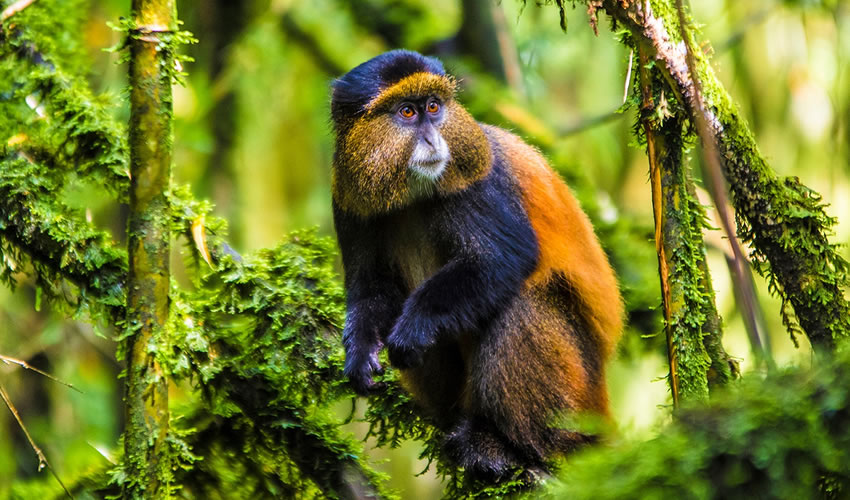
Wildlife Encounters of a Lifetime
Up Close with Iconic Species Prepare for unforgettable wildlife encounters on your Uganda safari. Witness lions prowling through tall grasses, elephants roaming freely in their natural habitat, and hippos lazing in the shimmering waters. Set your sights on tree-climbing lions in Queen Elizabeth National Park or track elusive leopards in K idepo Valley National Park . With diverse habitats and abundant wildlife, Uganda offers an extraordinary opportunity to observe and photograph some of Africa’s most iconic species in their untamed glory.
Cultural Immersion and Warm Hospitality
Engage with Local Communities Beyond its natural wonders, a Uganda safari allows you to engage with the vibrant local communities and experience the warmth of Ugandan hospitality. Interact with indigenous tribes, such as the Batwa pygmies, and learn about their traditions and cultural practices. Enjoy traditional dances, sample local cuisine, and share stories with friendly locals. As you connect with the people of Uganda, you’ll gain a deeper appreciation for their rich heritage and the harmonious coexistence between humans and wildlife that defines this captivating land.
What is the best time to go on a safari in Uganda?
The best time to go on a safari in Uganda is during the dry seasons, which are from December to February and from June to September. During these months, the weather is generally dry, making it easier to spot wildlife, and the vegetation is less dense, improving visibility. However, Uganda can be visited year-round, and each season has its own unique advantages and experiences.
What wildlife can I expect to see on a safari in Uganda?
Uganda is home to a diverse array of wildlife species. The most iconic attraction is the mountain gorillas in Bwindi Impenetrable National Park and Mgahinga Gorilla National Park. Other wildlife you can encounter include chimpanzees, lions, elephants, giraffes, zebras, buffalo, hippos, and various antelope species. The country is also a birdwatcher’s paradise, with over 1,000 bird species, including the rare shoebill stork.
How long does a gorilla trekking experience last in Uganda?
A typical gorilla trekking experience in Uganda lasts around 2 to 6 hours, depending on the location of the gorilla family and the hiking conditions. The actual time spent with the gorillas is usually limited to one hour to minimize disturbance to their natural behavior and reduce stress on the animals. However, the overall trekking experience, including the hike to and from the gorilla family, adds to the adventure and can vary in duration.
Are Uganda safaris safe?
Yes, Uganda safaris are generally safe. The country has made significant progress in ensuring the safety and security of tourists visiting its national parks and wildlife reserves. It is always recommended to follow the guidance of your tour operator or guide, adhere to park rules, and take necessary precautions to ensure a safe and enjoyable safari experience.
What is the cost of a safari in Uganda?
The cost of a safari in Uganda can vary depending on several factors, such as the duration of the safari, the type of accommodation chosen, the number of people in the group, and the activities included. Gorilla trekking permits are one of the major expenses, and their cost is set by the government. It is advisable to contact reputable tour operators or travel agencies for detailed information and customized safari packages based on your preferences and budget.
Do I need a visa to visit Uganda?
Yes, most visitors to Uganda require a visa. You can obtain a tourist visa upon arrival at Entebbe International Airport or apply for an e-visa online prior to your trip. It is recommended to check the latest visa requirements and regulations with the Ugandan embassy or consulate in your country of residence before traveling.
What is the currency used in Uganda, and can I use credit cards or ATMs?
The currency used in Uganda is the Ugandan shilling (UGX). While some major hotels, lodges, and establishments accept credit cards, it is advisable to carry some cash in local currency for small purchases, tipping, and in case credit cards are not accepted in remote areas. ATMs are available in major towns and cities, but it is recommended to inform your bank of your travel plans and inquire about any international transaction fees or restrictions.
Are there any health precautions I should take before traveling to Uganda?
It is important to consult a healthcare professional or travel clinic for up-to-date information on recommended vaccinations and health precautions for Uganda. Common vaccinations include those for yellow fever, hepatitis A and B, typhoid, tetanus, and measles. Malaria is prevalent in Uganda, so taking appropriate anti-malarial medication and using mosquito repellents are essential. Drinking bottled water and practicing good hygiene are also important for preventing any travel-related illnesses.
Can I combine a safari in Uganda with other activities or destinations?
Absolutely! Uganda offers a wealth of diverse attractions and activities that can be combining with a safari. Some popular options include visiting the source of the Nile in Jinja, exploring the scenic landscapes of Lake Bunyonyi, trekking to see chimpanzees in Kibale Forest National Park, or embarking on a thrilling whitewater rafting adventure on the Nile River. You can work with your tour operator to create a customized itinerary that suits your interests and allows you to explore different aspects of Uganda.
How physically demanding is gorilla trekking in Uganda?
Gorilla trekking in Uganda can be physically demanding, as it involves hiking through uneven terrain and sometimes dense vegetation. The hikes can vary in length and difficulty, ranging from relatively easy to more strenuous. It is advisable to be in good physical condition and also prepared for moderate to challenging hikes. Porters are available at the park entrances to assist with carrying backpacks and provide additional support during the trek.
How many gorilla families are in Uganda?
Uganda is home to several gorilla families for trekking or habituation experiences. Bwindi Impenetrable National Park has multiple gorilla families spread across different sectors, including Buhoma, Ruhija, Rushaga, and Nkuringo. Mgahinga Gorilla National Park is home to one habituated gorilla family. Each sector offers a unique experience and the opportunity to encounter different gorilla families.
How close can you get to the gorillas during the trek?
During a gorilla trek in Uganda, you can get remarkably close to the gorillas. The park authorities strictly regulate the distance between visitors and the gorillas to ensure their safety and minimize disturbance. Generally, a minimum distance of 7 meters (about 23 feet) must be maintained. However, it is not uncommon for gorillas to approach even closer out of curiosity. It is important to follow the instructions of the guides to ensure a safe and respectful encounter.
Are children okay participate in gorilla trekking?
Children below the age of 15 are not okay to participate in gorilla trekking in Uganda. This restriction is in place to ensure the well-being of both the children and the gorillas. However, there are alternative activities suitable for children, such as nature walks and also cultural visits, which can still provide an enriching experience during a family safari in Uganda.
Can I take photographs or videos during gorilla trekking?
Yes, you are allowed to take photographs and videos during gorilla trekking in Uganda. It is a remarkable opportunity to capture unforgettable moments and document your encounter with these incredible creatures. However, it is important to follow the guidelines provided by the park authorities and your guides to ensure the safety and well-being of the gorillas. Flash photography is not allow, as it can startle or distress the gorillas.
What should I pack for a safari in Uganda?
When packing for a safari in Uganda, it is important to pack lightweight and comfortable clothing suitable for warm days and cooler evenings. Essential items include long-sleeved shirts and pants to protect against insects and the sun, a hat, sunscreen, sturdy walking shoes, a rain jacket, and also a good pair of binoculars. It is also advisable to carry a small backpack, insect repellent, a refillable water bottle, and any necessary medications.
Can I see the Big Five (lion, leopard, elephant, buffalo, rhinoceros) in Uganda?
While Uganda is home to four of the Big Five (lion, leopard, elephant, buffalo), it does not have rhinoceros in its national parks. However, Uganda offers a wide variety of other wildlife species, including giraffes, zebras, hippos, and various antelope species. The focus of many visitors to Uganda is often on the unique and captivating experiences of gorilla and chimpanzee trekking.
How many days should I allocate for a safari in Uganda?
The number of days you should allocate for a safari in Uganda depends on your interests, budget, and the destinations you wish to visit. For a gorilla trekking experience, it is generally recommend to allocate at least 3 to 4 days, including the trekking day. If you plan to explore additional national parks or engage in other activities, such as chimpanzee trekking or also boat safaris, a 7 to 10-day itinerary would allow for a more comprehensive safari experience.
Is travel insurance necessary for a safari in Uganda?
Yes, it is highly recommend to have travel insurance that covers medical expenses, trip cancellation or interruption, emergency evacuation, and personal belongings. Accidents or unforeseen circumstances can happen, and having travel insurance provides peace of mind and also financial protection in case of any emergencies or unexpected events during your safari in Uganda.
Can I book a safari in Uganda on my own, or do I need a tour operator?
While it is possible to plan and book a safari in Uganda on your own, using a reputable tour operator is a high recommendation. Tour operators have extensive knowledge and experience in organizing safaris, arranging permits, and providing knowledgeable guides who ensure a smooth and enjoyable experience. They can customize itineraries based on your preferences, provide transportation, accommodations, and take care of the logistical details, allowing you to focus on enjoying your safari.
How can I contribute to conservation efforts during my safari in Uganda?
You can contribute to conservation efforts during your safari in Uganda. This can be by choosing eco-friendly accommodations, supporting community-based tourism initiatives. Also practicing responsible tourism behaviors. Additionally, the fees you pay for activities such as gorilla and chimpanzee trekking. They directly contribute to conservation efforts and the protection of these endangered species. By respecting park rules, maintaining a safe distance from wildlife, and following the guidance of your guides. You help preserve the natural habitats and also ensure the long-term sustainability of Uganda’s wildlife.
Top safari packages:
- 13 day Uganda wildlife Safari with Gorillas and Tree climbing Lions
- 8 Days Uganda Gorillas – Chimps and wildlife Tour
- 7 Days Uganda Gorilla safari and Chimpanzee Trekking
- 7-Day Best of Uganda -Luxury Comfort Tour
- 6 Day Uganda wildlife Safari with Mountain Gorillas
- 5 Day Gorillas and Lion Tour
- 4-Day fly-in Gorilla Trekking Safari
- 3-day Gorilla tracking & Lake Bunyonyi relaxation
Your Nationality
Number of Days
Number of People
Accommodation —Please choose an option— Budget Mid-range Luxury
Phone Number
Interests Gorilla Trekking Wildlife Viewing Bird Watching Chimpanzee Tracking Primate Tour Cultural Tour Whitewater Rafting Mountaineering Horseback Riding Boat Cruise Honeymoon Holiday
Your message
Related Safaris
Crafting the ultimate uganda safari itinerary | a comprehensive guide for travelers, where in uganda does a gorilla trekking safari take place, safety and security measures when planning a trip to africa, exploring primate paradise: uganda vs. rwanda.
WhatsApp us


Safari Support
Get to know safari.

Safari profiles
Create separate profiles for things like home and work, so you can keep your browsing activities organized.
- Watch the video about profiles

Use passkeys
Passkeys replace passwords for an easier and more secure way to sign in to your accounts. And you can find them right on your device.
- On your iPhone
- On your Mac

Add your favorite websites to the Dock for an app-like experience.
- Learn how to use web apps

Customize your start page
Choose a background image and other options such as Favorites, Siri Suggestions, iCloud Tabs, and Reading List.
- Personalize your start page

Add extensions
Safari extensions add functionality and are a great way to personalize and enhance your browsing experience.
- Learn how to install extensions

Privacy Report
See a list of known trackers who’ve been blocked from tracking you across all the websites you’ve visited.
- View your Privacy Report
- Manage your privacy

Autofill passwords
Use the AutoFill feature to easily fill in saved user names and passwords, and suggest strong passwords when you sign up for websites.
- Learn about Autofill

Import bookmarks
You can import your bookmarks, history, and saved passwords from Google Chrome or Mozilla Firefox, and pick up right where you left off.
- Import from other browsers

Increase your online security
Learn how to identify and avoid phishing and other scams , and how to get a warning if the site you’re visiting is a suspected phishing website.
- Update Safari Security preferences for Mac

Learn about features and discover all that Safari can do.
- Browse the guide

Set up iCloud
Select and set up the iCloud features you want to use like Photos, Contacts, Calendars, and more.
Search for more topics

Apple Communities
Find answers, ask questions, and connect with other Apple users.
- Ask or search now

Get Support
We can help you find the best support options.

Support app
Get personalized access to solutions for your Apple products.
- Download the Apple Support app
Family Safari: Expert Answers to The Top 24 Questions About Africa
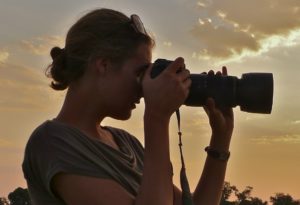
We’ve rounded up answers to 24 of your most frequently asked questions about a safari with kids. For a deep dive into what you can expect on your family safari with Extraordinary Journeys, check out How To Safari With Kids: 5 Amazing Destinations For Your Family .
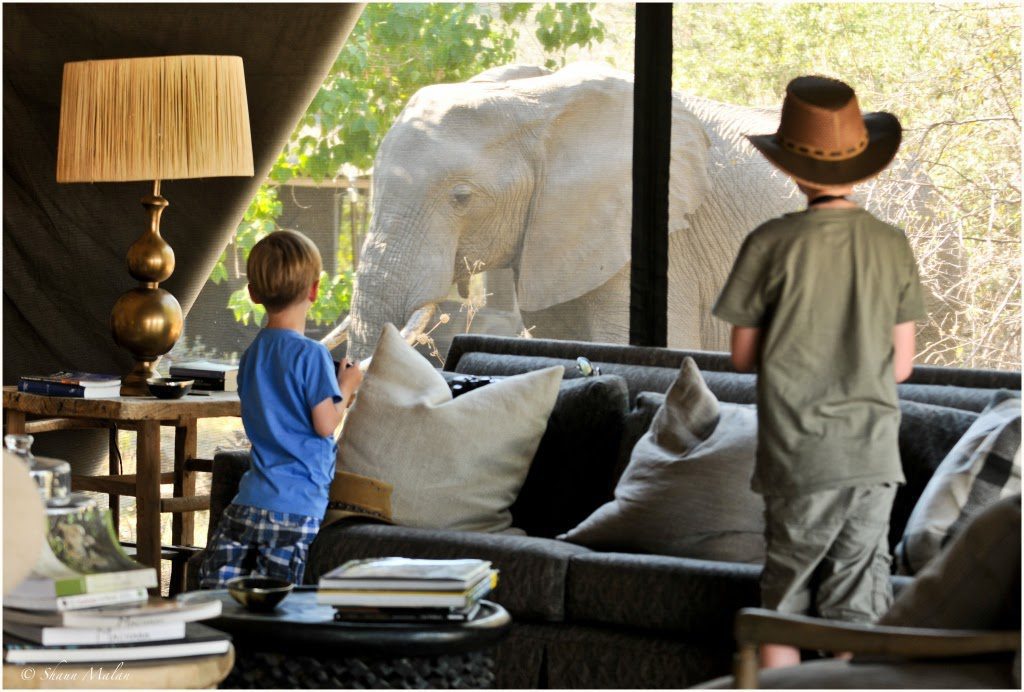
Preparing for Your Family Safari
1. which african countries are best for a safari with kids.
South Africa, Kenya, Zambia, Zimbabwe, and Botswana all top our list. Read more about what makes these destinations so special for a family safari in How To Safari With Kids: 5 Amazing Destinations For Your Family . For stunning landscapes and a truly unique desert experience, Namibia might also be a good fit for you.
2. When should we travel for our family safari?
Depending on the age of your kids and your particular preferences, there’s likely a destination in Africa for you just about any time of the year. For fewer crowds and more value for your money, we often recommend traveling during the shoulder season. If you plan to celebrate the holiday season on safari, you’ll likely need to book at least a year in advance. For a month-by-month overview of what to expect and when, check out this blog post .
3. How old should my kids be to go on safari in Africa?
We can find a safari for just about any age group.
Some safari camps and lodges have a minimum age limit of 12 years. For others, the limit is six years, and some even offer free accommodation for children five years and younger.
We know what is best for every age group. For expert advice on the best family safari for the age and stage of your kids, check out this piece from our Safari Specialist Lara Ray, who has taken her own children on multiple African safaris: Ask the Expert: The Best Family Safaris for Every Age Group .
Kenya tends to offer more options for all ages because so many properties are family-owned. They’re used to improvising and adapting your safari to make it work for everyone. We also love Somalisa Acacia in Zimbabwe, and in Botswana, we recommend the Young Explorer’s program at Footsteps Camp.
It’s important to note that even at the most inclusive properties, some safari activities are not suitable for younger children, including walking safaris, gorilla and chimp trekking, canoeing, or horseback riding.
If your kids are in their teens, you will encounter fewer age restrictions, but be sure to ask us in advance!
4. What about preschoolers or kids under age six?
In general, we recommend waiting until your children are between six and eight to take them on safari, as they’ll get more out of the interactions with the guides and have better stamina for game drives and the like.
You know your child better than anyone, though, so that’s not to say you shouldn’t bring your precocious five-year-old! Our Safari Specialists can help determine the best fit for your family, whatever your child’s age.
It’s also worth noting that many properties can arrange for a “child minder,” or nanny, to look after your young children during activities suited for adults and older children.

5. How many days do you recommend for a safari with my family?
Children love safari if they have the right guides and activities. We often book families for safaris lasting at least seven days, and even after 10 days, many children continue to have an amazing time (and don’t want to go home!). Remember, your kids will be so busy discovering new things and loving the experience that it’s not likely they’ll get bored or even tire of the trip before you do!
6. What is the most common mistake people make when planning a family safari?
In an effort to keep travel costs down, many families are accustomed to the DIY approach. While that may work for plenty of other locations all over the world, we strongly discourage going that route with a safari, especially one involving your entire family.
Planning a safari on your own is extraordinarily time consuming.
You might consult dozens of websites and spend anywhere from 15 to 40 hours researching and planning a single vacation. And that’s just your average vacation . Consider the complexities of a safari : remote locations, park permits, vaccinations, visas, transportation, lodging… The Extraordinary Journeys team collectively spends 20-100 hours per trip, and they’re the experts .
Your time is precious, especially as a parent. And the logistics of planning a safari can be a nightmare if you don’t know what you’re in for. Doing it on your own could easily eat up 100+ hours of your life. Our Safari Specialists do all the legwork for you. And you easily get 100 hours of your life back.
Beyond the time involved, we cannot overstate the importance of our experience, connections, and relationships with the properties and operators with whom we partner. We add value, peace of mind, and exclusive access to every one of the safaris we plan.
7. How much does a family safari cost?
We work with you and your desired budget to deliver a safari perfectly tailored to your family’s needs and wants.
Thanks to long-term relationships with properties and operators across Africa, we’re able to provide you connections, access, and value that you simply won’t find anywhere else, especially online.
For family safaris in particular, there are a number of ways to maximize your budget and get incredible value from your investment, including
- camps and lodges where kids stay free (see #8 below),
- traveling in the shoulder season or low season,
- opting for barefoot luxury-style properties over ultra-luxe accommodations, and
- combining several days on safari with a few days exploring a city like Cape Town (the best of both worlds!).
For a more detailed overview of the sort of investment you can expect to make on a safari, in general, check out this blog post .
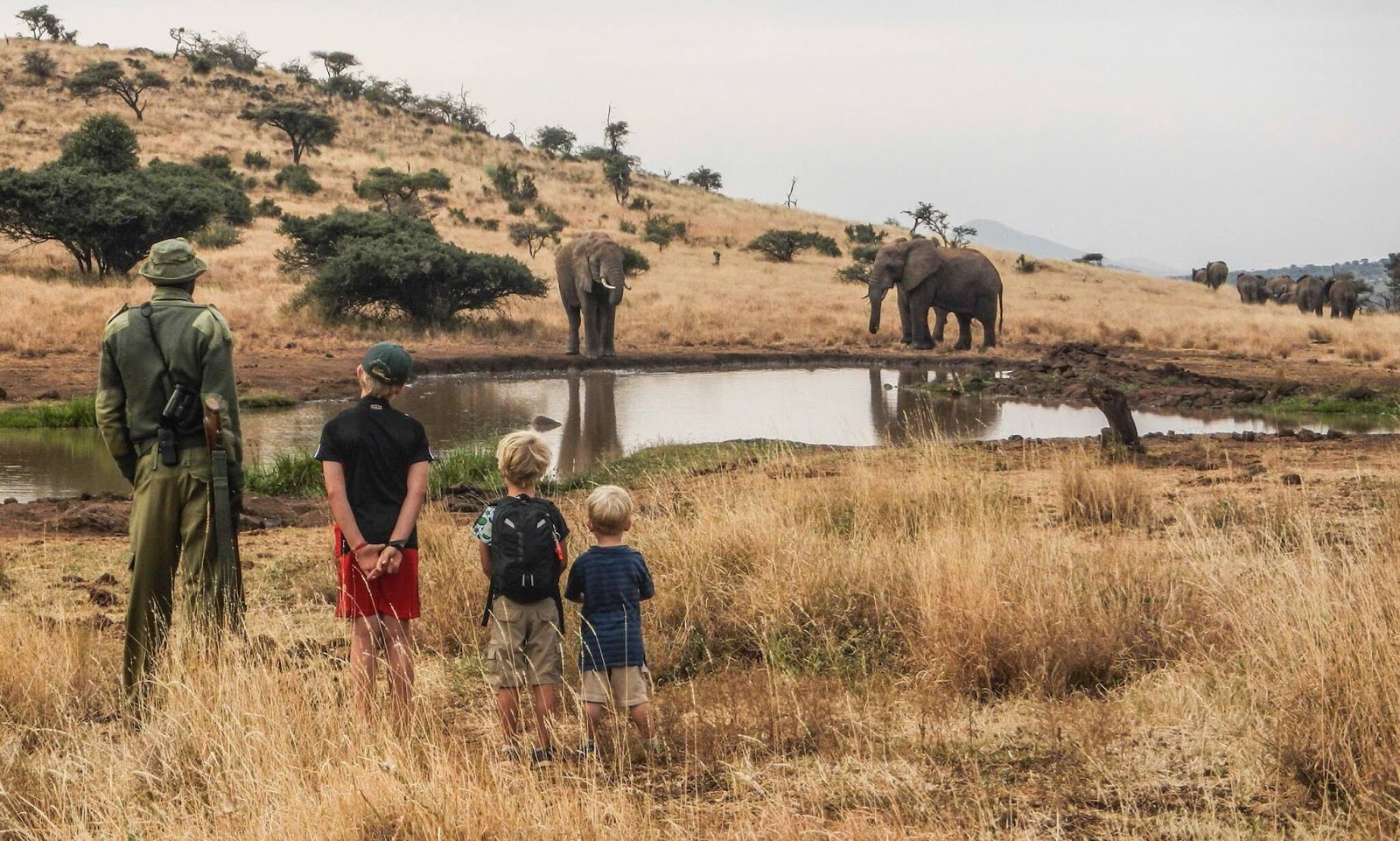
8. Will we have to pay full price for our kids to safari with us?
Not if you don’t want to! There are countless properties that offer accommodations free of charge to children under the age of five or six , provided they share a room. Many of these properties are located in Kenya, Zimbabwe, and Namibia.
Additionally, most properties offer a special rate for children under age 16 if they share a room. Even better, we know of some camps in Tanzania that extend reduced rates to children as old as 21 years , provided they share a room.
Here are a few properties to consider where kids stay free if sharing a room:
- Several of Asilia’s Mara Bush Houses in the Greater Maasai Mara , including Topi House , Mara House , and Acacia House
- Elephant Watch Camp in Kenya’s Samburu National Park
- Lewa House , Ol Malo , and Sarara Camp in Northern Kenya
- Kinondo Kwetu, a lovely family-owned property on the South Coast of Kenya
- Most African Bush Camps in Zimbabwe and Botswana
- Meno a Kwena , Jack’s Camp , San Camp , and Camp Kalahari near Botswana’s Makgadikgadi Pans National Park
- Namibia’s Shipwreck Lodge and Hoanib Valley Camp
Pro-tip for families traveling in 2020:
Ulusaba in South Africa is offering an amazing family special. From January 15 to December 21, one child age 0-11 can stay at Ulusaba Rock Lodge for free (a savings of about ZAR 7,500 per child per night)!
This includes:
- A luxurious room or suite at Rock Lodge
- All meals including tailor-made child-friendly menus plus milk and cookies before bedtime
- All drinks including a top-quality wine list and fine champagne for the adults
- Twice daily game drives
- A daily walking safari (weather dependent)
- The contents of your mini-bar, refreshed daily
- Complimentary wireless internet
- Children’s books, games, safari goodies, family activities, and a few more surprises!
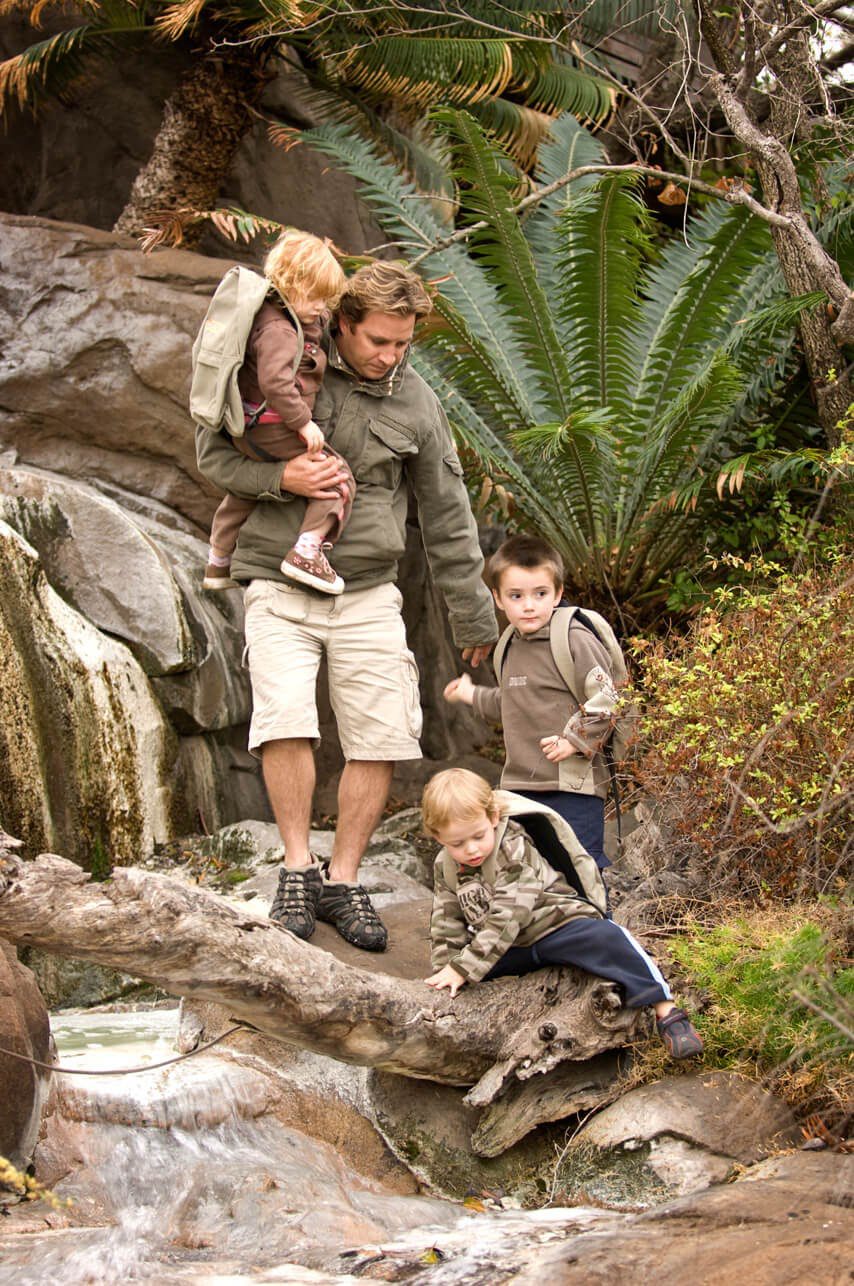
9. Will we need visas to go on safari?
Every member of your family will need a passport to travel to Africa. And depending on your destination and the length of your stay, you may need visas. Your Safari Specialist will let you know the necessary requirements well in advance and will work with you to get all the documentation you need.
10. How far in advance should I start planning my family safari?
We recommend six to nine months in advance. For peak-season travel, allow closer to a year.In South Africa, that’s anytime between November and February. Anywhere else, that’s July through September.
If you’re planning a safari over the winter holidays, know that Christmas time is busy everywhere and we even seeing people booking 18 months to 2 years out. For the best accommodations and bookings, we recommend you get in touch with us a full year out from your desired travel dates.
11. Which books or movies can you recommend to help us prepare for our family safari?
Extraordinary Journeys CEO and co-founder Elizabeth Gordon recommends:
- The No. 1 Ladies’ Detective Agency Series
- Echo of the Elephants: The Story of an Elephant Family
- We All Went on Safari
- Disney’s Queen of Katwe
- The Lion King (obviously!)
- DisneyNature’s African Cats
- Planet Earth (a fantastic resource for resources all over the world!)
- The White Giraffe
- A Story Like the Wind and A Far-Off Place
- Listening for Lions
- A Girl Named Disaster
- The Boy Who Harnessed the Wind (film based on a true story)
- Good Morning Gorillas
- Honey… Honey… Lion!
12. What should we pack for a safari with kids?
While neutral, earth-tone clothes are recommended (as are layers!), don’t feel like you need to go shopping for an entirely new wardrobe just for your safari. Check out our complete packing guide here: What to Wear on Safari .
Health & Safety Concerns
13. is it dangerous to take my kids on safari what about the younger ones.
In the right camps with the right guides, it is safe to take your younger children on safari. Our Specialists can build the perfect itinerary for your tiny adventurers!
14. How do the properties you work with minimize health risks or illnesses?
Every property we partner with boils the water and uses best practices to mitigate risks. If you were to get sick while visiting, the lodges are well-equipped with most of the medicine and first aid you’d need to make a quick recovery.
15. What if one of us gets ill while on safari? How will we get to a doctor?
Within East Africa, AMREF Fying Doctors , is an incredible resource should someone in your family need access to more involved medical care.
We can organize an evacuation from pretty much any part of Africa. Both Nairobi and Johannesburg are huge health hubs with amazing doctors and hospitals.
Fun fact: did you know that the first successful heart transplant was done in South Africa?
Regardless of destination, we recommend that all our clients purchase travel insurance. This should include an emergency medical evacuation policy which would pay for evacuation to the United States if needed.
16. What about malaria? Should my kids take malaria pills before a safari?
For both adults and kids, malaria is easily preventable by taking a prescribed antimalarial pill. Even babies over 11 pounds can take Malarone. We definitely recommend consulting with your pediatrician (they’ll follow CDC guidelines) to determine the best course of prevention.
But maybe you’d rather avoid contact with malaria altogether. We certainly understand! For absolute peace of mind, you might opt for destinations free of malaria, all of which happen to be in South Africa (including the ever-popular Madikwe Game Reserve ). Check out Our Top 7 Malaria-Free Safaris for all the details on our favorites.
17. Which vaccines should my family get before a safari?
Our Safari Specialists keep up-to-date on the latest recommendations from the CDC. Depending on your destination, you may need a yellow fever vaccination (and accompanying certificate of vaccination).
What to Expect on Your Family Safari
18. what will we eat while on safari can my kids be accommodated if they’re picky eaters or have food allergies.
Yes! Camps are extremely accommodating. You may even cook with the chef!

19. What if my kids get hungry? Are snacks provided on game drives?
Yes! Your guides will ensure you have all the food and water you need for your hungry, growing adventurers.
20. What happens if my child needs to use the bathroom while on a game drive?
Think of it like camping. If your child needs to go to the bathroom, your guide will find a safe spot to do so, and an adult will accompany them. Usually, kids take care of their business right behind the vehicle. Remember, there is no one out there but the animals, and they certainly don’t mind!
21. What if my kids get restless or uncomfortable? Is a game drive vehicle the only way to see wildlife on safari?
No! Depending on where you stay, we can arrange interactive walks, camel rides, community visits, and more. There is so much to do. For children under 12, we do recommend a private vehicle so you can return to camp earlier.
Another good idea is to book properties with swimming pools so children can play after lunch, prior to the afternoon game drive.
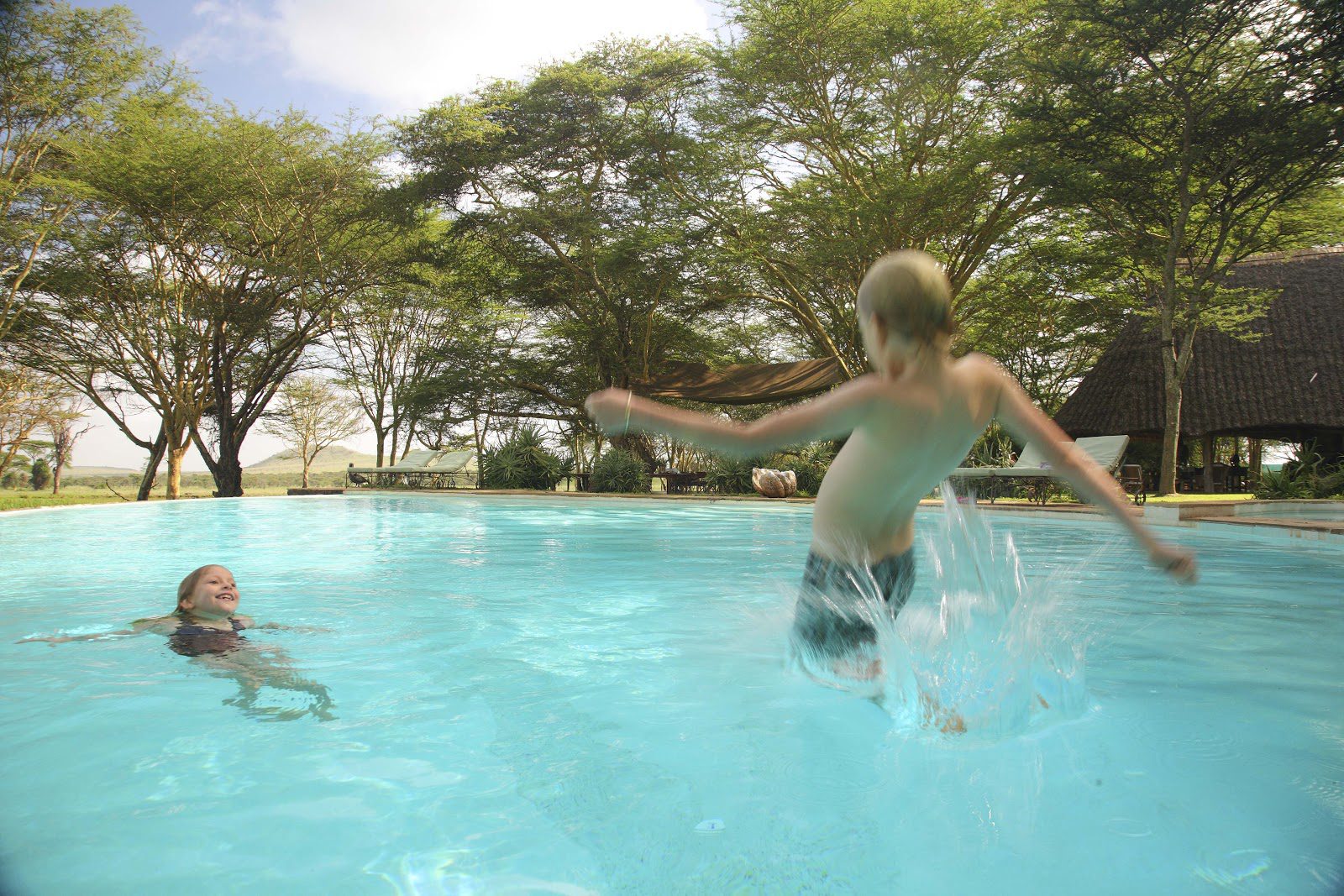
22. Besides game drives, what sort of activities we can do as a family?
The options are endless! Depending on the age of your children, they might enjoy walking safaris, boating or canoeing (usually for ages 12+) hanging out near a waterhole (where the wildlife come to you!), helicopter safaris , gorilla trekking and chimp trekking (usually for ages 16 and up), participating in Footsteps Camp’s Young Explorers program and more!
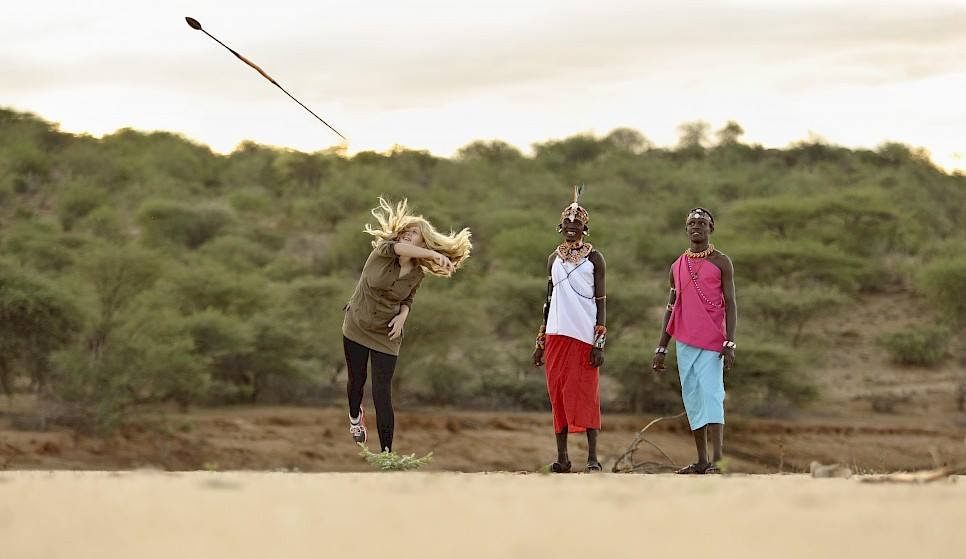
23. Where can I go if I want my kids to be exposed to local cultures and traditions? Can we visit a local village and meet the community?
We absolutely encourage your family to meet and interact with local children and their communities . If you place a priority on authentic connections with the local community (and the chance to make a positive impact while you’re at it), check out this piece: How To Meet the Community & Make a Difference on Safari .
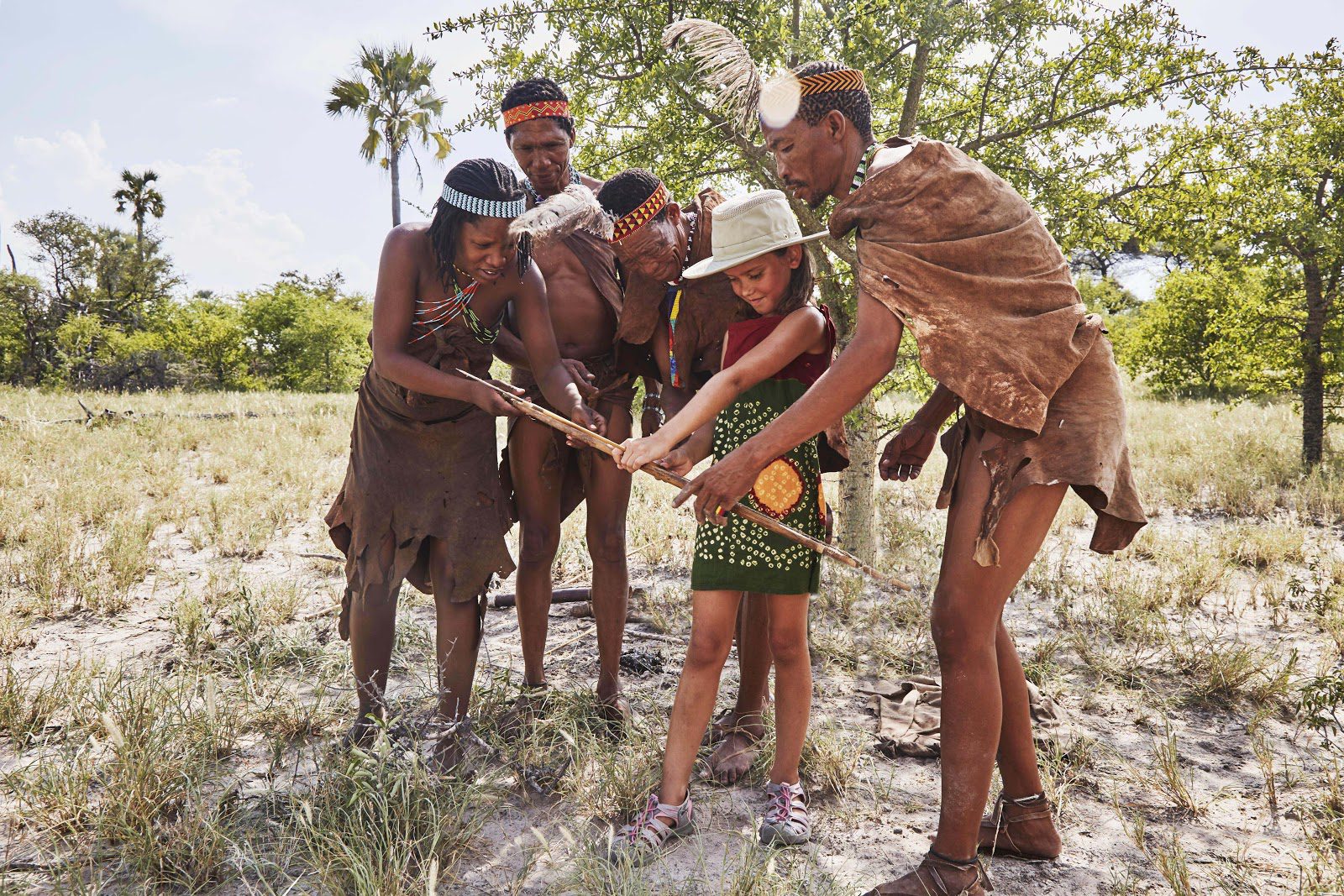
24. What about combining our family safari with other things?
Depending on your family’s unique interests, we can plan an itinerary involving so much more than game drives!
There are some great cultural activities, opportunities to hang out with kids in local communities, and history tours in Johannesburg . Or if your family loves the water, try a marine safari at one of these amazing diving destinations ! We can also incorporate some time in a city like Cape Town, home to a host of fantastic tours for every type of traveler .
Just to Recap…
We’ve answered 24 of the most common questions about how to plan for a safari, how to stay safe and healthy while you’re on safari, and what you can expect while on safari with your family. Read more about Safari with Kids
If you have a question that isn’t answered here, please call or email us, and one of our Safari Specialists will happily answer any questions or concerns you might have about your family safari.
Start Planning Your Family Safari Today!
Ready to start planning your own incredible African family safari? Whether you’re a group of four or fifteen, we make the process stress-free and enjoyable. Call or email us today to explore your best options for a safari holiday you and your kids will never forget!
Then, start packing that suitcase because we’ve got all the details covered.

African safari tips: 20 things to know before going on your first safari in Africa
Planning to travel to Africa? Here are the important African safari tips that you should know before going on your very first African safari.
Going on an African safari for the very first time is a dream come true for many travelers. For most, the idea of traveling to Africa seems farfetched or something that could never happen given a number of reasons.
But when you finally see your dream coming to life, fear, and excitement all head straight through the roof at the same time.
With all that happening, realistic questions start kicking in on how you should actually plan or behave on your very first African safari.
Now as a first-timer, it’s not surprising not to know what to expect or better yet what to do on your first safari in Africa.
So that’s why I am writing this post to give you all the important African safari tips to prepare you as you enjoy Africa’s wildlife.
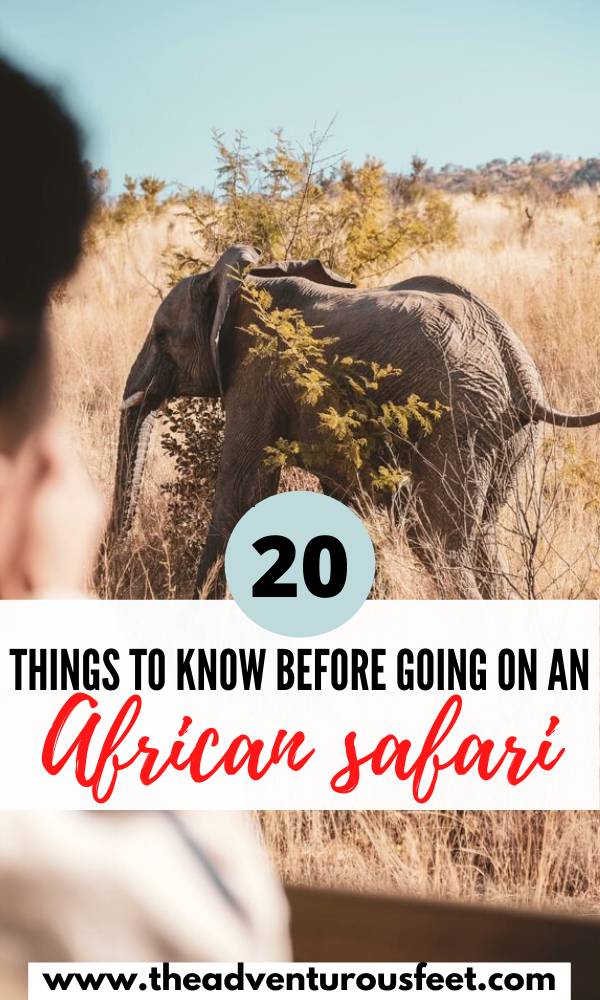
Disclaimer* This post contains affiliate links and I might earn a small commission if you purchase through them but with no extra cost to you. This commission helps to keep the lights on here. You can read our privacy policy for more details. Thank you for supporting the Adventurous feet
Why should you trust me to give you these safari tips for Africa? Well aside from the fact that I live in Africa, I’ve been on quite a number of incredible African safaris.
From the deep ends of Queen Elizabeth national park in Ugand a , and Chobe National Park in Botswana which boasts the highest number of African Elephants to the magical Okavango Delta, I can surely say that I’ve added a number of African safari tips to my sleeves that will be extremely useful for first-timers.
Now you might be thinking that having done a number of safaris in Africa, perhaps I get bored or something!
No, I still get so excited every time I go on a safari and every experience is different but incredibly rewarding.
I could literally visit all the National parks in Africa and still want to do more game drives. It’s a truly magical experience.
So before I get sidetracked into telling you how beautiful and exciting it is to go on a safari, let’s get to the important African safari tips that you came for to help you fully prepare for your once-in-a-lifetime adventure in Africa .
Read this before you go: 15 Things to know before traveling to Africa
Best African safari tips for first-timers
Here are the best African safari tips you need to know before your trip.
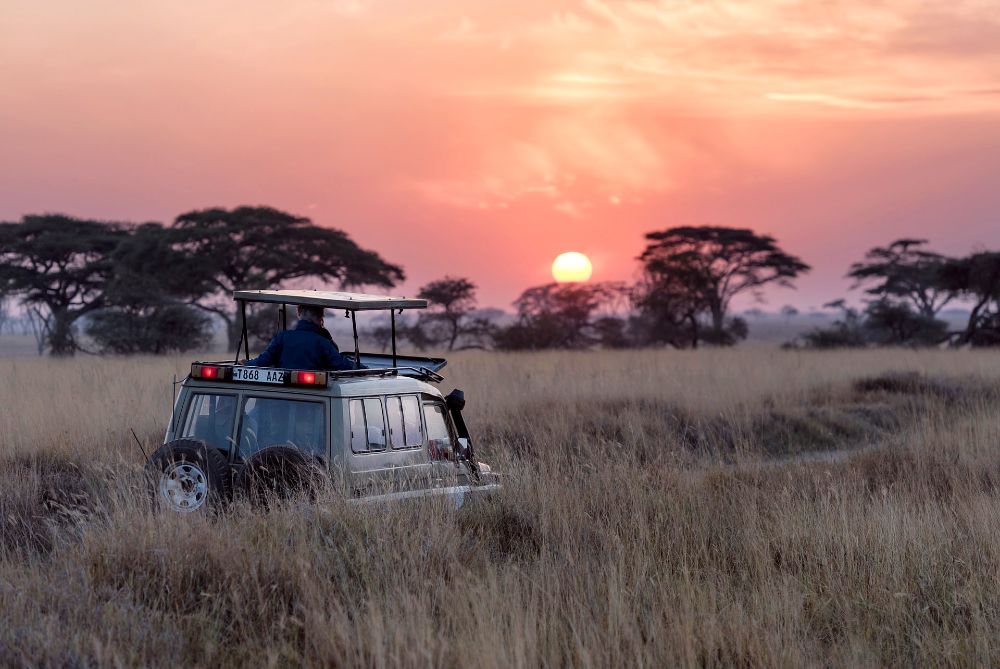
1. Find out the best time to go for an African safari
Although Africa’s wildlife will stay throughout the year, not every time is best for wildlife viewing and this is why you need to research the best time to go for a safari in that exact place you’re planning to visit.
The time of the year you visit can make or break your trip. Visiting in the rainy season will keep the animals hidden but will also hinder you from moving freely since the dusty and sandy roads of Africa will be extremely hard to dry on.
For example, if you plan to go for a safari in Uganda , the dry season (June, July, August, September, January, and February ) is the best time to visit since most animals head to the water holes to drink which makes animal spotting pretty easy.
If it’s the annual wildebeest migration you want to experience (which btw is the greatest wonder in wildlife that everyone should see), then you might want to consider either visiting Kenya or Tanzania in the dry months of June to October since both countries showcase this incredible wildlife spectacle.
I guess you now understand why it’s pretty important to choose the right season to go for an African safari. But generally, the drier seasons of most countries are the perfect time for wildlife viewing.
However, drier doesn’t mean summer in some countries. Take an example, Botswana’s dry season is their winter which makes the best time to visit between May and the beginning of October.
So don’t just generalize everything, get to know the best time to visit each African country individually to come up with a perfect itinerary.
Related post: Things to know before backpacking Africa
2. Wake up early
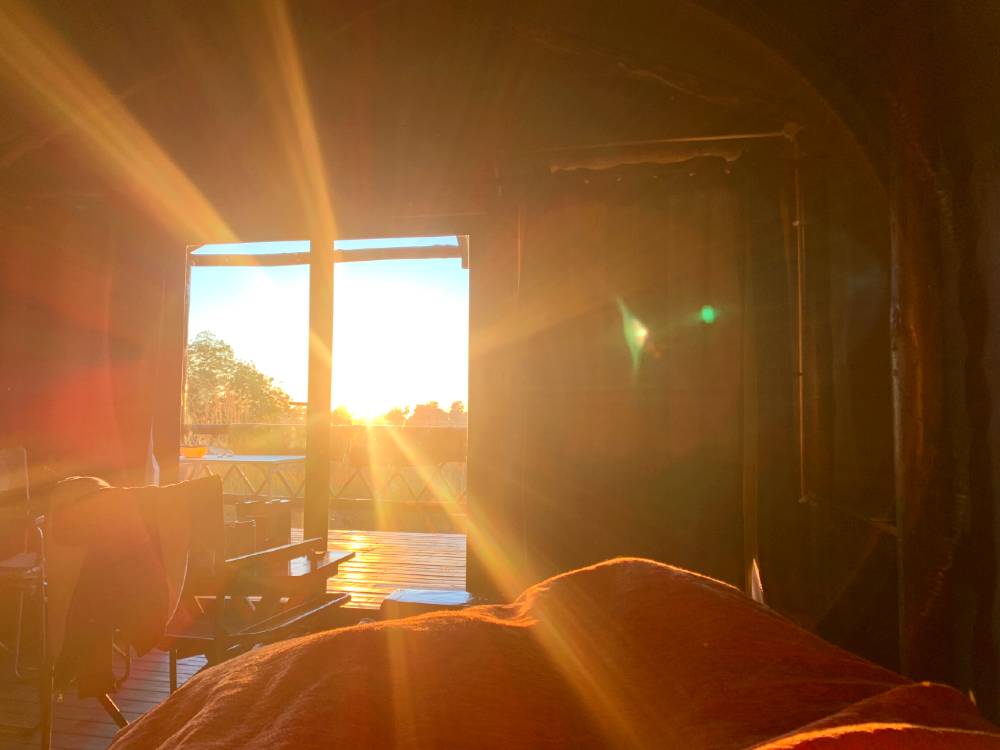
Other than getting that picture-perfect photo of the amazing African wildlife with a backdrop of the rising sun, there are high chances of spotting wildlife in the morning which is why it is crucial to wake up early.
Though the word “morning” might mean 10 am to some, wildlife viewing kind of morning is around 6 30 am – 7 am.
In the morning, wild animals are the most active hence moving closer to places where they can be spotted easily other than in the afternoon where they’re all taking shelter from the scorching sun.
And it’s for this reason that most game drives are during the morning hours and in the evening.
So get your day’s equipment ready the day before and if you’re not an early bird, turn on the morning alarm clock to witness the magical African wildlife unfold.
3. Be on the look-out to spot the wild animals
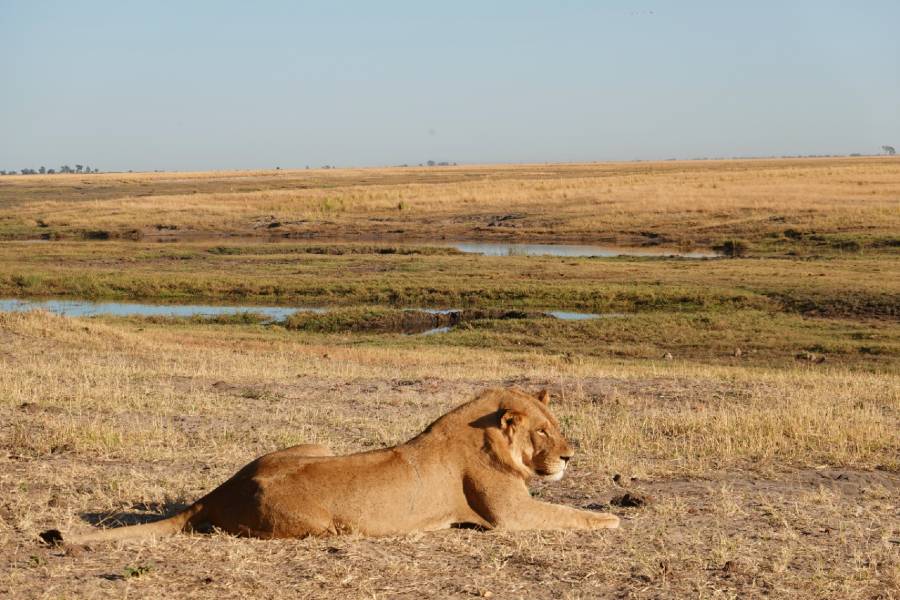
One of the important tips for an African safari for first-timers is to always be on the lookout while game-driving.
Safaris are absolutely different from zoos which means that you can drive a long journey without seeing the big fives.
Though some animals are pretty easy to see without even trying, big cats like lions, Leopards, are Cheetahs can be hard to spot.
So as you drive along, look outside vividly not to miss anything.
This is actually why it can be sometimes challenging to do a game drive alone since you have to drive and also spot the animals.
It’s always better to have someone with you or better yet hire a tour company which will make spotting animals easier.
Because when you miss seeing one, chances are that someone else in the touring car has seen it, and guides are usually more skilled at spotting the big cats.
Related post: Best countries to visit in Africa
4. Ask a lot of questions
Another tip for an African safari is to ask a lot of questions. If you’ve booked a game drive with a tour company, the tour guide assigned to you is there to answer all your questions.
So ask away and remember that there is nothing like a dumb question.
The only way you will get the most out of your trip is to be inquisitive as much as possible as that’s how you will learn about the African animals and the wild in general.
You can ask about the behaviors of some animals, what the guides think about them – literally anything you want to know and the guides are knowledgeable enough to give you answers.
Try to also be friendly with the guides as that will make them closer to you — something that will encourage them to share even beyond just the animals.
If you’re doing a self-drive, you can ask the lodge or campsite’s staff where you’re staying for anything you might want to know.
You can ask them where there are higher chance of seeing the big five at a certain time of the day or the best loops to take and they will be happy to give you answers.

5. Take your time to enjoy the wildlife
Africa boasts one of the most beautiful wildlife if not the best in the world and it would be a shame to rush through it during a game drive.
There is so much to see and different safaris will treat you to a different kind of landscape that you ought to appreciate.
When you spot animals, park your car, or ask your guide to stop to admire the animals. You might just get lucky to see some of the spectacular scenes if you take your time.
Whether it is seeing animals mating, fighting, or a lion chasing down its prey, all this can happen if you take your time to fully enjoy the safari.
However, taking your time doesn’t mean ”hogging” the animals for hours. If you were the first one to see a big cat and your car is right near it, don’t spend 2 hours there. Move on so that others can also enjoy it.
Related post: Must have adventures in Africa
6. Take lots of photos
While on a safari, make sure that you take lots of photos to relive your trip even years later but to also capture the incredible beauty that you can only find in Africa.
However, when I say take a lot of photos, I don’t mean going crazy and taking 500 photos of an elephant.
I have to say I was guilty of this on my very first safari. I always wanted to take the perfect shot and that put me over the edge – taking photos of everything and I mean everything.
However, taking lots of photos will mean that you have enough memory to store them. So carry these extra memory cards to make sure that you don’t miss capturing incredible moments due to limited memory.

7. Bring a good camera
While still about capturing the amazing wildlife on an African safari, you’ll need to take a good camera.
A good camera is everything on a safari to fully bring out the beauty that Africa boasts.
If you’re not sure which camera you should take on a safari, you can draw inspiration from this list of the best cameras for travelers.
8. Follow the rules and listen to your guide
Many times, your guide will give you a number of rules to follow and if you’re not going with a guide, there are always rules that the parks’ administration put up – make sure that you follow them.
Most of those rules are for your own safety and others for the safety of the wild animals.
Some of the rules might seem really “basic” but they can make or break your trip. A few of the safari rules to follow include;
- Not getting out of the safari car
- Not feeding the animals
- Paying maximum attention if you’re on a walking safari
- Not disturbing the animals – don’t get carried away by the excitement.
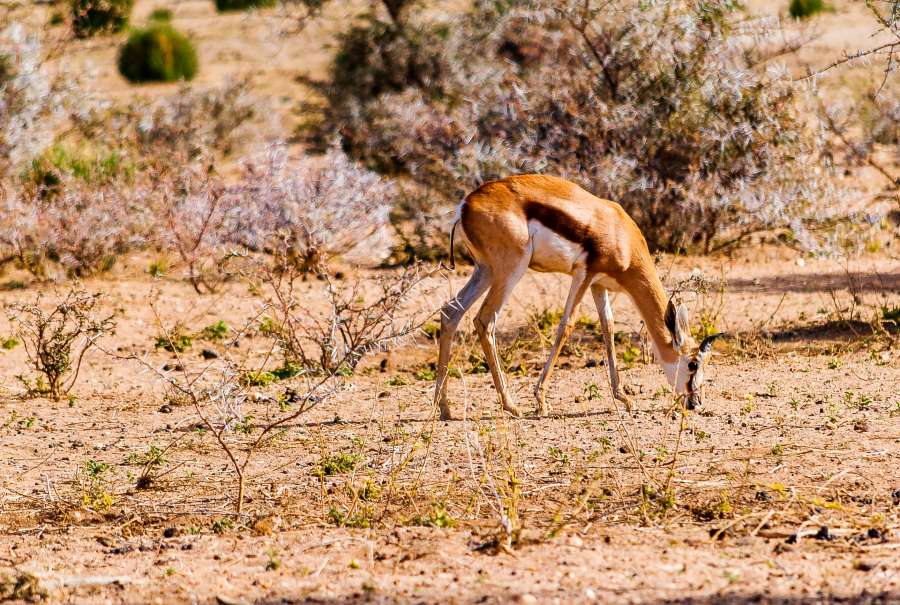
9. Stay safe at all times
An African safari is truly an amazing experience but it can also present a number of dangers if you’re not careful.
First of all, you’re in the habitat of wild animals which means that doing something that makes them feel threatened can lead them into attacking you.
So while enjoying the wild, make sure that you adhere to the park rules to stay safe. Some of the tips for staying safe on a safari include;
- Do not leave the marked-out game paths if you’re self-driving.
- Follow all the rules mentioned above.
- Roll up the car windows if the wild animals are so close to your vehicle.
- Walk away slowly if approached by an animal during a walking safari.
- Carry a first aid kit for any emergencies that may arise. This first aid kit is small enough to fit in your safari day back but has everything you might need.
Related post: Safest countries to visit in Africa
10. Stay healthy while on an African safari
While enjoying your first African safari, don’t forget to take care of yourself by staying healthy. Though it might be a bit hard to do on a game drive, there are a number of useful things that will help you achieve it.
Some of the tips for staying healthy on a safari include;
- Stay hydrated at all times. Carry a bottle of water to make sure you don’t run out. This travel compressible water bottle is perfect for an African safari.
- Take a mosquito repellant or antimalaria tabs. Malaria is still quite common in Africa despite the fact that each African government is doing everything possible to eradicate it. You can opt for this insect-repellant and consult with your doctor for anti-malarial tabs.
- Don’t allow yourself to get burned while on a safari, have sunscreen with you
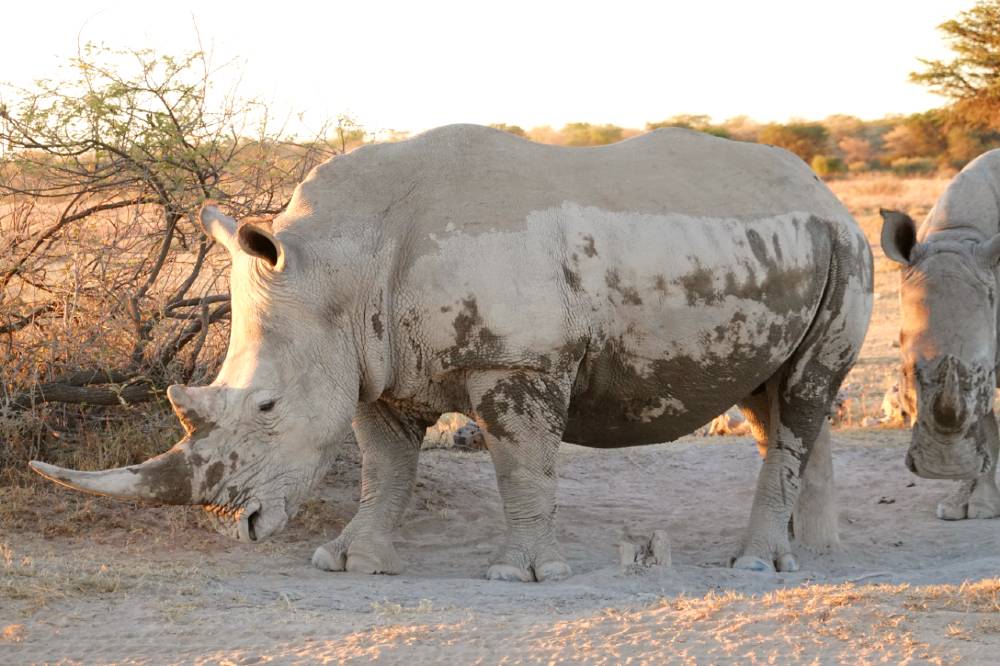
11. Do not miss the sunset game drive
Just like the early morning game drive, a sunset drive also presents higher chances of animal viewing.
This is because the heat of the day is gone and now the animals can come out of the shade making it easy to spot them.
Related post: The most famous landmarks in Africa
12. Take Binoculars
Binoculars are an essential item while on an African safari. They will help you get a good view of that far-away animal or bird that you can’t easily get to.
Though some people choose to improvise with their zoom camera lenses, I still believe that binoculars are way better. I remember I got soo jealous of people who had binoculars on my first safari.
This kind of binocular with a large Eyepiece and BAK4 FMC Lens will be perfect for an African safari. Since it’s on the high end of the budget, you can check out a variety of other binoculars from here if you’d prefer something cheaper.
13. You don’t have to wear Khaki from top to bottom
I know, you’ve probably read a number of articles online that say that you have to wear Khaki clothes all through. But no, it’s not necessary and there is no such rule.
In fact, I’ve never worn khaki attires on any of the African safaris I’ve been to and I’ve never had any issues at all.
However, though there is no rule about which clothes you should wear, you should stay away from bright-colored clothes.
Bright pink or orange clothes are not a good idea as they easily attract animals due to their sharpness hence making the animals curious and probably end up coming near you which can be risky.
So regardless of what you wear, stick to neutral-colored clothes. This tip is especially important when going for a walking safari.
Actually, even your tour guide will tell you in advance not to wear bright-colored clothes.
Some of the clothes to wear on an African safari include,
- Convertible pants . These breathable and light convertible pants are perfect for an African safari. If the heat gets too much, you can just zip off the legs, and if it gets cold, wear it as full pants.
- Columbia short-sleeved saf a ri shirt for men . It is comfortable and you’ll still look ”stylish” even when on a safari.
- You can pack a few Merino wool T-shirts . These ones for women and these for men will guarantee you extra comfort while on a safari.
- I am not really a fan of dresses or skirts while on a safari. So a pair of these leggings or convertible pants work well for me.
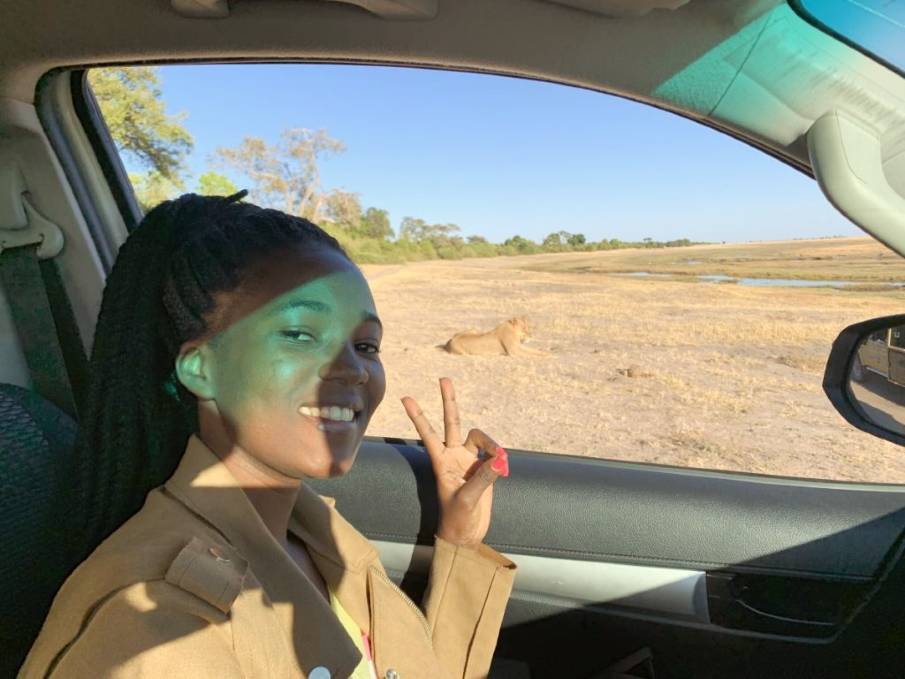
14. Take all the essentials
While going for an African safari, there are some things that should not miss in your daypack. These will help you stay refreshed and will protect you from the sun while enjoying Africa’s beauty
Some of the things that should be in your safari daypack include;
- Sunscreen: There is no doubt that Africa’s sun is incredibly hot, especially in countries near the equator. So make sure that you take sunscreen that has an SPF of 50+ to avoid burning. Buy the sunscreen before you go because it can be very pricey in Africa.
- A safari hat: I will admit that I am not a huge fan of a hat. In any case, my hair is always huge to be accommodated by the hat but it’s very helpful in blocking away the sun. This kind of safari hat will definitely make you feel like you’re rocking the wild while blocking the sun.
- Sunglasses: While still talking about the African scorching sun, take these polarised sunglasses to protect your eyes at all times.
- Chapstick: I can guarantee that your lips will dry while on a safari. So make sure that you take this chapstick to prevent that from happening and keep your lips moisturized.
- A compressible water bottle: Staying hydrated while on a safari is paramount. So carry this compressible water bottle to refill it before you head out into the wild.
- Bug spray : Don’t leave a bug spray while heading for a safari. Remember that you’re headed into the habitats of bugs so you should have something to protect yourself.
- A proper daypack: You’ll need a good daypack where all the above items will fit in easily. I recommend taking this Osprey daypack as it is small, light, and durable.
Those are some of the essentials you should have before you head into the wild but you can check out this complete Africa packing list to prepare fully.
15. Keep it quiet
I know the excitement of seeing your very first African animal especially if it’s one of the big five can be through the roof.
I mean I’ve seen them so many times but I still get excited every time I see one. So its totally understandable to be extremely excited but don’t let it go out of hand to the point of screaming,
Yes, some people scream when they get excited but this is the place where you have to contain it.
Always keep it low while talking with others and don’t try to scream at the animals.
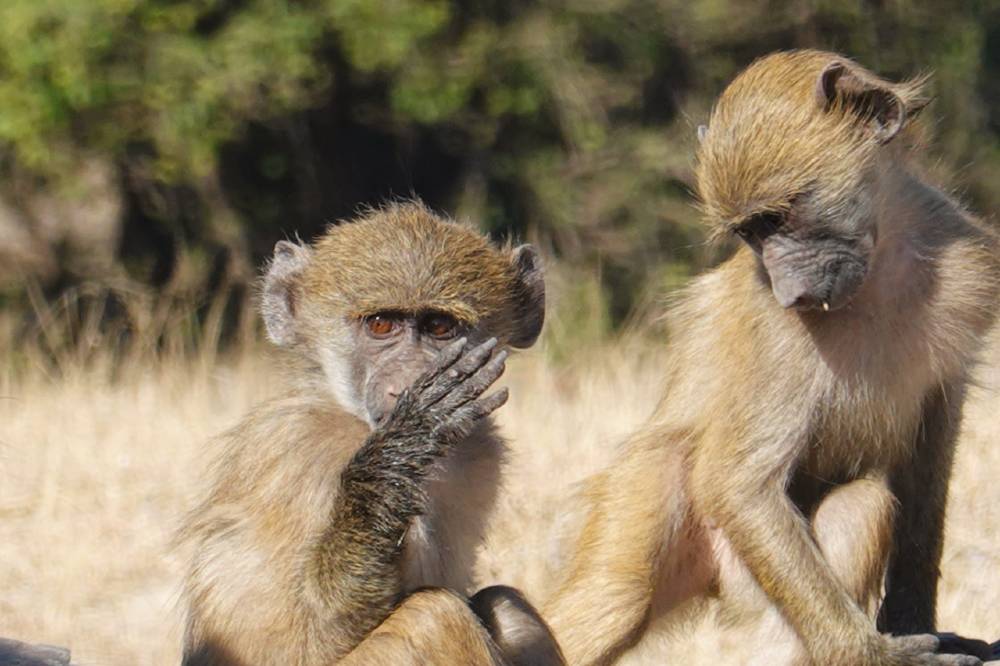
16. Respect the wildlife
Just like someone coming into your home, you’d expect them to be respectful and the same applies here.
As a guest in the habitats of the wildlife, you ought to be respectful of the wild.
This ranges from not littering around – it’s actually sickening to see people dumping trash in national parks and reserves. Don’t be that guy that I will give a ”what the hell are you doing ” kind of look.
Also, don’t try to manipulate the animals by acting inappropriately. I’ve seen some people make noises with their cars so that the elephants can trumpet.
Literally disorganizing the elephants for their own pleasure. But hey, don’t start running if they lose their cool and decide to charge you.
17. There is no guarantee that you’ll see the animals
One of the other things to know before going on a safari is that you’re going into a game park, not a zoo where animals are waiting for you.
Here, you’ll have to look for them which means that there is no guarantee that you’ll actually see them.
Though you’ll see some animals like elephants, and antelopes since they’re literally everywhere but big cats, not so much yet those are the ones everyone is always looking forward to seeing.
But if you don’t see all the big five on your first safari, don’t let your entire trip get ruined.
There is always a chance to see them on the next safari as almost all game drives present something different.
18. Where you stay during your safari matters

One of the things to know before an African safari is that where you choose to stay matters.
Not all the most expensive tented camps and lodges are in the perfect place. However, this also depends on what you’re looking for as an individual.
Whether you’d want to be able to see some wild animals close to where you’re staying or not which I bet you do since that’s the reason you went on a safari in the first place.
Some places are more likely to have animals nearby than others. So make research to find the perfect location.
To give you an example, while on game drives in Botswana , I never saw any Hyenas, but it showed up right at our campsite in the night and I finally got a chance to see it.
Elephants were daily visitors to our campsites and Hippos showed up once in a while. This goes to show that where you choose to stay impacts your first safari in Africa quite a lot.
On the other hand, lodging somewhere far from where wild animals are largely concentrated would mean that you always have to make long drives before you can start seeing anything.
So decide on where to stay during your African safari keeping those factors in mind.
19. Enjoy your first African safari
Lastly, enjoy the safari. Africa has soo much beauty that you have to enjoy every chance you get.
Be open-minded and friendly and I guarantee you’ll have the best experience ever.
Try to immerse yourself in the African culture, and be more understanding instead of focusing on the negatives. And when something goes wrong, don’t let it ruin your entire trip.
There you have it, folks! I hope that these tips for an African safari prepare you well as you encounter Africa’s wildlife for the first time.
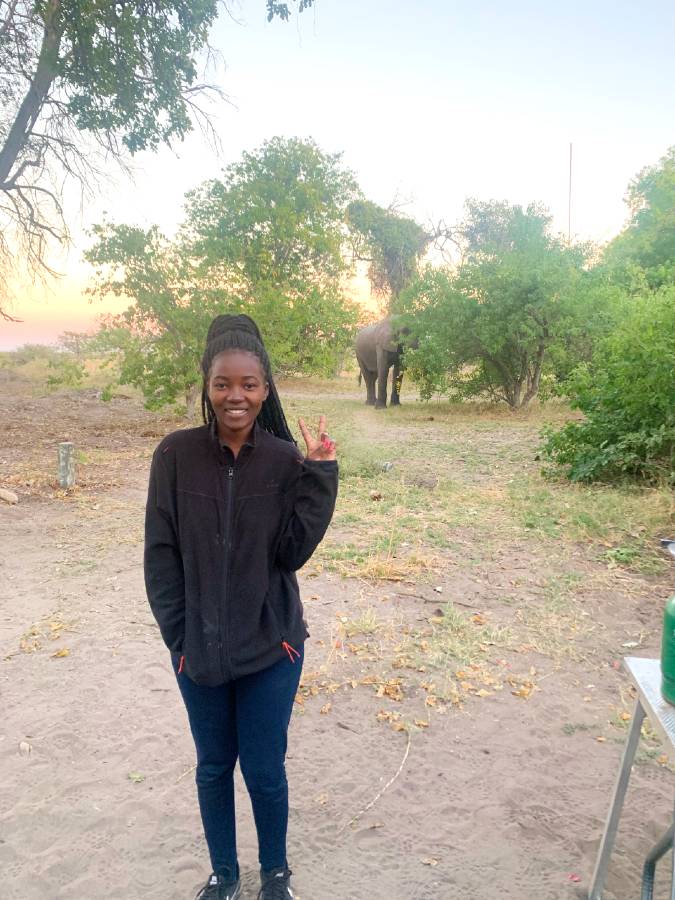
Ready for your African Safari trip, here are other things you should pack
Travel insurance.
It would be a mistake to travel to Africa without travel insurance. Anything can happen on the dusty road of Africa or in chaotic cities.
So make sure that you and you’re items’ safety is guaranteed by buying travel insurance.
Most travelers love World Nomads travel insurance as it’s easy to get a quote and the claiming process is not a rat race.
The other advantage is that it works in over 130 countries including those in Africa.
Universal travel adapter

Instead of taking different adapters for each African country which is very impractical and expensive, you’re better off taking this universal travel adapter.
Portable Power bank

Before going to Africa, make sure that you have a power bank like this so that you stay connected even on the go when your battery phone dies.
Microfiber travel Towel

I recommend taking this microfiber travel towel since it is lightweight, dries quickly , and is very absorbent. It’s much better than carrying heavy cotton ones.
Africa Lonely Planet Guide book

Get a general insight into Africa from experts by getting yourself a copy of this Lonely Planet guidebook .
Personal water filter

Safaris in Africa can mean going to places where it’s hard to get clean drinking water. So carry your own travel water filter to purify the water before drinking it.
Collapsible water bottle

In that same manner, carry yourself a water bottle so that you can refill it every time it runs dry.
This travel water bottle is collapsible and light which means that it won’t take up a lot of space in your backpack. Taking a water bottle will also reduce the use of disposable plastic bottles which is great for the environment.
Final Thoughts on What to Know Before Going on An African Safari
As I wrap up my essential Africa safari tips, remember that your trip will be as incredible as your preparation.
An African safari requires careful planning, respect for nature, and an open mind ready for unforgettable experiences.
With these practical Africa safari tips, I have no doubt that you’re now better equipped to handle the unique challenges and opportunities that await.
So, stay vigilant, respect the rules, and remember to soak in every moment of your adventure whether positive or out of your comfort zone. After all, an African safari is more than just a trip; it’s a once-in-a-lifetime experience, at least for most people!
More posts to inspire your wanderlust in Africa
- Safest countries in Africa
- Best countries to visit in Africa
- Bucket list adventures you must go on in Africa
- Tips for Backpacking Africa
- Essential tips for traveling to Africa
- Uganda destination guides
- Egypt destination guides
- Botswana destination guides
Was this post on the best safari tips for Africa helpful? Then Please pin it
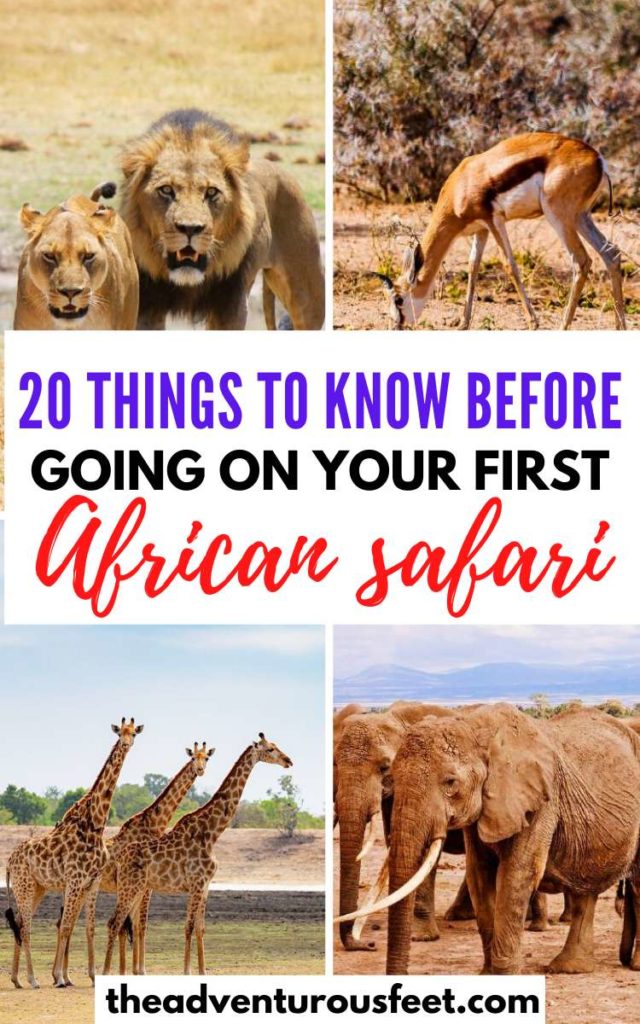
Similar Posts
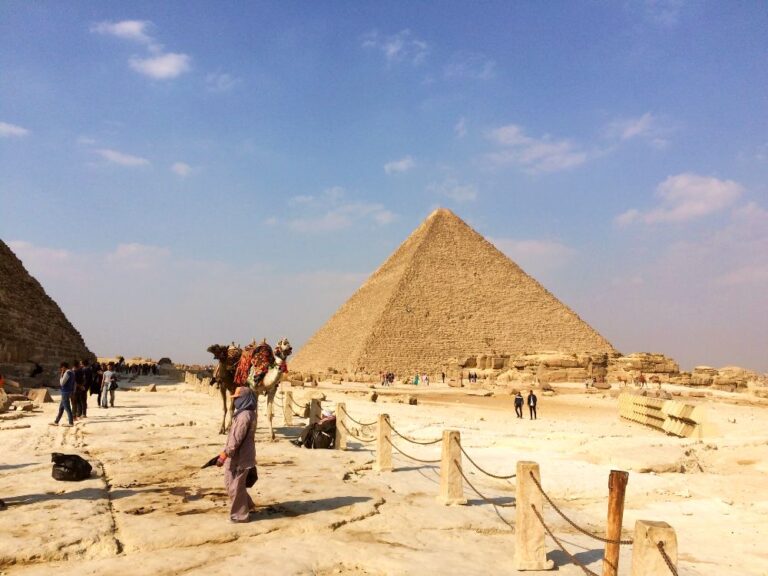
Backpacking Egypt: 16 Things you should know before you go
Planning to backpack Egypt? Here are the best tips for backpacking Egypt that will give you everything you need to know before your trip and how exactly you should behave When you think of a country that has it all (literally) everything, think Egypt. Between the impressive historical Egyptian landmarks that we all studied about…
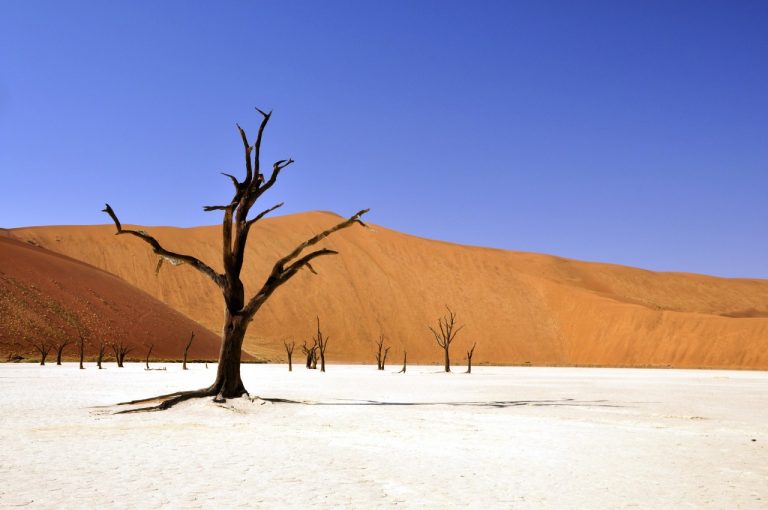
10 Incredible African adventures to add to your bucket list
Looking for African Adventures to go for? This post brings you incredible safari experiences that are worth adding to your African bucket list. Africa, a dream destination for many people that want to get up close with the African animals, enjoy the incredible diversity of the people or gaze at the beautiful landscapes and wonders…

12 Common Myths and Misconceptions about Africa that are absolutely not true
Do you find yourself doubting what you’ve heard about Africa in the past? Here are the common misconceptions about Africa that will help you sort out the facts from the myths. As an African, a Ugandan to be exact, I sometimes don’t know what to do or how to behave when I hear about the…

15 Essential Africa travel tips for first-time visitors
Planning a trip to Africa? Here are the must-know Africa travel tips for first-time visitors including all the do’s and don’ts to know before you go. You’re planning your very first trip to Africa, Yay- it’s absolutely an amazing experience and a great step that some travelers are still skeptical to take. But at the…
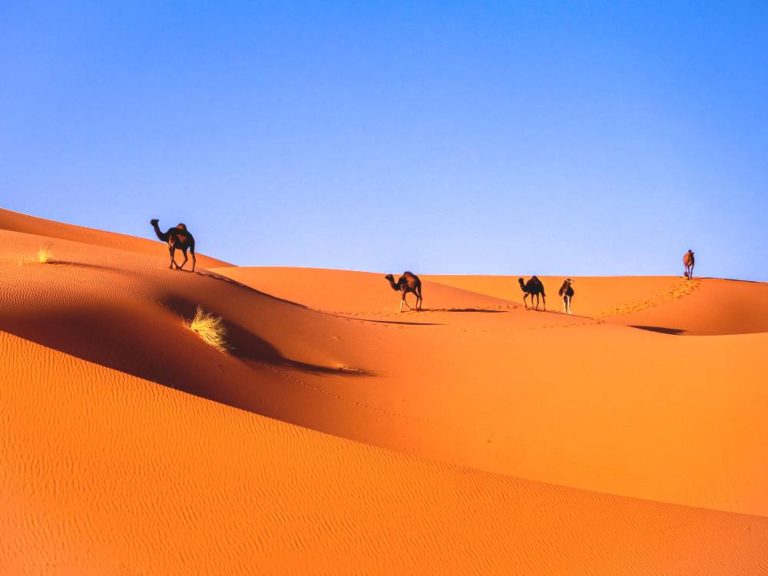
African Landmarks: 20 Most Famous Landmarks in Africa You Need to Visit
Looking for places to visit in Africa? Here are the most famous landmarks in Africa that you should add to your bucket list. Africa is indubitably the most diversified continent in the world! From the amazing wildlife that everyone wants to experience, diverse people with a variety of customs and beliefs to incredible landscapes that…

10 Best things to do in Kampala, Uganda
Want to spend some time in Uganda’s capital and you’re wondering what to do, here are some of the best things to do in Kampala that you should add to your Uganda itinerary. Commonly known as the city of seven hills, Uganda’s capital, Kampala has increasingly become a popular (or rather an inevitable) stopover while…
Dear Esther Thank you for your good website and sharing your experiences. I am planing a trip to Kenya and I used a lot from this page. According to my time and budget, I am going to take a safari in Masai mara and choosing on of the lake Nakuru or Naivasha. According to your experience, which one is better in terms of view,sightseeing and which one is better for relaxation? Is there is there a boat riding option in Nakuru? Thanks a lot
Great and well written travel blog. Thank you very much for sharing such a great guideline.
Thanks for this great checklist. Although I’m originally from South Africa I can sadly say I’ve never been on a safari. Very disappointing I did go to Addo elephant park many years ago but I know realise living abroad how much I should’ve taken advantage of the great animal beauty on my doorstep. Definitely keen to visit North Africa for some incredible safaris in the future.
Thank you for your kind words Kaylini. It’s unfortunate that you weren’t able to go on any safaris but hopefully, in the future, you’ll be able to enjoy the amazing safaris in Africa.
Leave a Reply Cancel reply
Your email address will not be published. Required fields are marked *
- Share full article
Advertisement
Supported by
Travel Tips
How to Plan Your First Safari
To get the food, shelter and safari experience you want, you need to research your trip. Here’s a thorough list of the details you should consider.

By Steve Bailey
A safari vacation in Africa is probably the most organized vacation you’ll ever take. While it is possible to simply fly to a few places — Arusha, Tanzania, or Maun, Botswana — and rent a car to take off into the countryside, few people want to risk being alone on unmarked dirt roads patrolled by hyenas, cheetahs and lions.
No, you use professionals to help you choose an itinerary and arrange transportation. Your travel company will have a driver waiting for you, and from the time you land, you’re in the hands of people who will feed and shelter you and take you amazingly close to fearsome beasts. To get the food, shelter and safari experience you want, you need to research your trip.
Plan on at least two weeks. That should allow for at least three different camps in different areas, for three nights each. Generally, you get an early morning game drive and a late afternoon game drive each day, so two full days in each camp almost guarantees that you’ll see a lot. My wife, Jane, and I went on safaris in January and February in Tanzania, Botswana, Namibia and South Africa. It was the wet season in some places, but it wasn’t particularly rainy. Although the vegetation was lush, we saw elephants, hippos, giraffes and baboons beyond counting. In the drier Serengeti, Kalahari and Sabi Sands, we saw a lifetime’s worth of cheetahs, leopards and lions. We also got to see the Serengeti’s great migration of wildebeests and zebras.
A doctor friend who lived and worked in Malawi until recently says that the best thing you can have on a safari is a generous parent to pay for it. Daily costs per person range from $200 to well over $1,000, and typically include travel, including airplanes, between different camps. It would not include airfare from the United States. Tips are suggested and expected at each camp. A couple should figure on up to $50 per day total for guides, drivers and food service. Tips should be in the local currency and are given upon departure.

52 Places to Go in 2019
A starter kit for escaping into the world.
The Travel Company
My wife and I used African Portfolio , a Connecticut-based company, when we spent six weeks in Africa in 2016. We started planning our trip with a different company, but it ignored our budget concerns and other requests by giving us an itinerary of super-deluxe camps. You also could simply deal directly with a company that operates multiple camps, such as Asilia Africa or Wilderness Safaris . Cultural and educational organizations offer safari packages. African Portfolio got us to the Asilia and Wilderness camps that really intrigued us, as well as to camps operated by other companies. Whoever helps plan your trip will take care of getting you from one remote camp to another, often in small airplanes.
The Animals
The Big Five — lions, elephants, leopards, rhinos and Cape buffalo — were the most challenging game animals for hunters on foot in another era. They’re still worthy targets for your camera, but so are zebras, giraffes, exotic antelopes and almost countless kinds of birds. All of these are in Kenya, Tanzania and Botswana. Gorillas are in Rwanda and Uganda.
Accommodations
Lodges, from hostels to luxury hotels, are found near some game-rich areas like the Ngorongoro Crater in Tanzania and Kruger National Park and the Sabi Sands Game Reserve in South Africa. In the Kalahari Desert and the Serengeti you’ll find tented camps, which are clusters of individual cabinlike tents and one or two large tents for the dining room and staff operations. The individual tents usually have real beds and attached private bathrooms with heated showers and flush toilets. There are also mobile camps, which move to follow game, especially the migration in the Serengeti. All your meals will be at the camp. Most camps supply the usual toiletries as well as sunscreen and insect repellent.
Some safari agencies will hook you up with a guide who will go with you from camp to camp. We had the same guide for two camps and he relied on radio contact with other guides to find game. Elsewhere we had guides supplied by the camps. All knew their areas and the wildlife. With camp guides, you can pay extra to have your own vehicle, or you can share a vehicle with other guests. Do the latter. Your fellow riders are likely to enrich the experience with their knowledge and camaraderie. And listen when the guide in your open-air vehicle tells you not to stand or move. There’s nothing but air between you and that hyena.
You will need fast-drying nylon clothes. Your luggage may be limited to a small duffel bag. Camps generally provide laundry service, usually washed by hand and dried in the sun. Guests may be expected to wash their own underwear. You don’t need an all-beige wardrobe. Most of the animals can hardly distinguish colors, but you should avoid white because it attracts attention. Black and other dark colors attract tsetse flies. Popular safari areas can be chilly mornings and late afternoons and very hot at midday, so dress in layers (and wear a hat).
Steve Bailey is a former travel editor at The New York Times who now runs the travel blog, TouristFirst.blogspot.com .
52 PLACES AND MUCH, MUCH MORE Follow our 52 Places traveler, Sebastian Modak, on Instagram as he travels the world , and discover more Travel coverage by following us on Twitter and Facebook . And sign up for our Travel Dispatch newsletter : Each week you’ll receive tips on traveling smarter, stories on hot destinations and access to photos from all over the world.

Common African Safari Questions and Answers
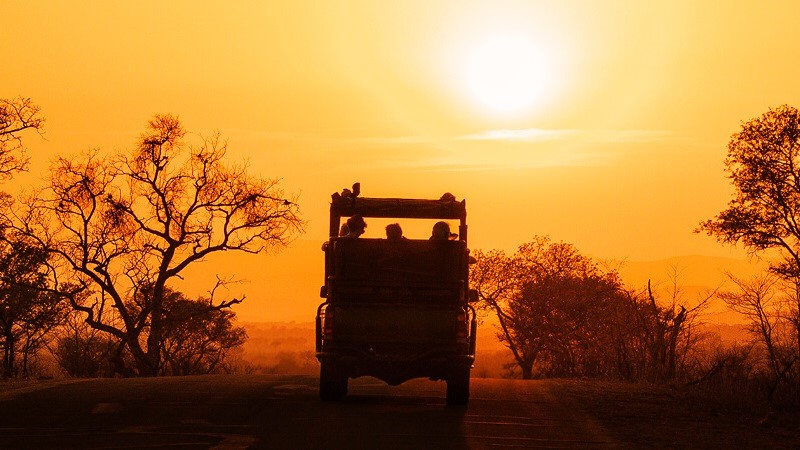
In this post, we have listed a number of frequently asked safari questions and answers for the convenience of travellers. If you have an upcoming holiday or vacation and are considering safariing in Africa, then hopefully you will find this information useful. There’s certainly lots to think about before a trip to the African wild.
Frequently Asked Safari Questions and Answers
Are african safaris safe.
Yes. While you will be around wild animals and come relatively close to them, you will be safe. That is, if you follow the safari rules . Game parks and reserves have safety measures and safari guides are experienced and well trained. Moreover, lodges and camps are regularly in contact with medical air rescue services.
Do Lions Ever Attack Safari Vehicles?
No, lions (and other wild bush animals) do not typically attack safari vehicles. In fact, animals rarely even approach the trucks, unless they want shade or are in the process of stalking prey. If an animal does approach, then your driver will let you know what to do. Is going on safari dangerous? Again, no, it is quite safe.
What About Malaria?
Malaria-carrying mosquitoes are prevalent in Africa, particularly in Southern Africa between November and March. Between May and October, the driest months, there aren’t many mosquitoes. Regardless of the time of year, though, travellers should see a doctor for safari questions and answers and a prophylactic.
Do I Need Immunisations Before the Trip?
Yes, depending on the country that you will be travelling to for safari . Safari-goers should consider contacting a travel clinic for advice on vaccinations for Hepatitis A and B and Typhoid. if you’re travelling to Kenya or Tanzania, then you will need a vaccination for Yellow Fever , a serious and potentially deadly disease.
Is the Water Safe to Drink on Safari?
Again, it depends on where you’re going. Some places in Africa have treated water that is safe to drink from a tap. However, if you’re not a local with immunity to the local bacteria strains, then you could experience diarrhoea. The good news is that most safari lodges and camps stock bottled mineral water.
Will We Have Electricity?
Probably. Safari lodges and camps generally run power from generators and solar installations. Lodges in towns, cities and developed rural areas operate on mains or utility electricity with the expectation of offering 24-hour electricity. But then, the power is not very reliable in many areas, so they still use generators.
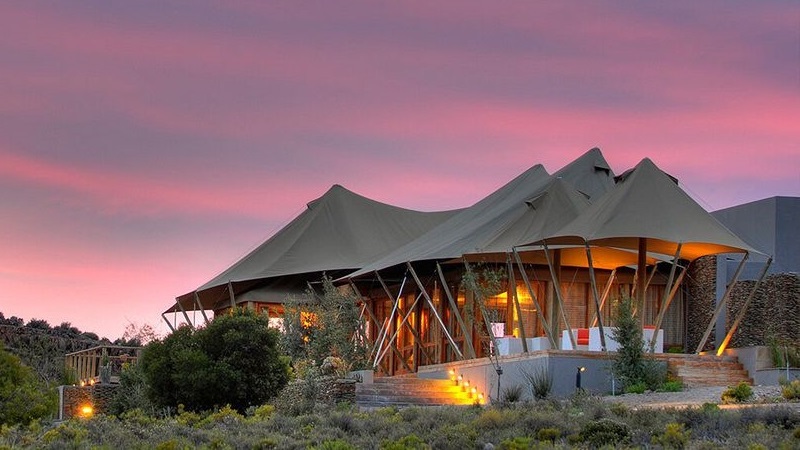
Dwyka Tented Lodge in Sanbona Wildlife Reserve, South Africa.
More Safari Questions and Answers…
Can kids go on safari.
Not all safari camps and lodges in Africa allow children, particularly children under the age of six, but many do. Same goes for lodges and camps in game parks and reserves in South Africa. Some of them not only permit little ones but cater specifically to children and families, offering lots of fun activities for kids on safari .
What Should I Wear?
Safari-bound tourists should pack in clothing appropriate for the season, the destination and the type of safari. It’s also important to consider comfort and safety. It can get hot in Africa and you’re going to be doing some walking, and the wrong safari colour scheme could increase the risk of danger. See what to wear on safari .
Where Do You Pee on Safari?
Park entrances, picnic spots and lodges usually have bathrooms but on game drives you’ll be ‘going’ in the bush (number 1 and 2), so carry tissues and a small bag. Hand sanitiser is a good idea, too. There are normally stops on safari drives. If you have an emergency, then inform your guide for safari questions and answers.
Do I Need Binoculars?
The animals on safaris will not always be in close proximity, so yes, bring a pair of binoculars. Even when they are relatively close, binoculars allow you to view the animals in great detail. The best binoculars for African safaris are lightweight and fog proof, with at least 8x magnification and a 42-millimetre lens.
What Type of Camera Will I Need?
A digital single-lens reflex (DSLR) camera is the standard piece of equipment for capturing wildlife on safaris. It should have a telephoto zoom lens no smaller than 200mm lens and ideally 300mm. Both Canon and Nikon produce high-quality DSLRs that are affordable. Check out our guide for taking amazing safari photos .
What About Visas and Visa Fees?
Passport holders of most nationalities require a visa to enter Zimbabwe, Zambia, Kenya and Tanzania in Africa for safari. At this time, travellers do not require a visa to visit South Africa for up to 90 days. However, this could change, and visa fees change regularly. Visit ProjectVisa for current information on visas and travel.
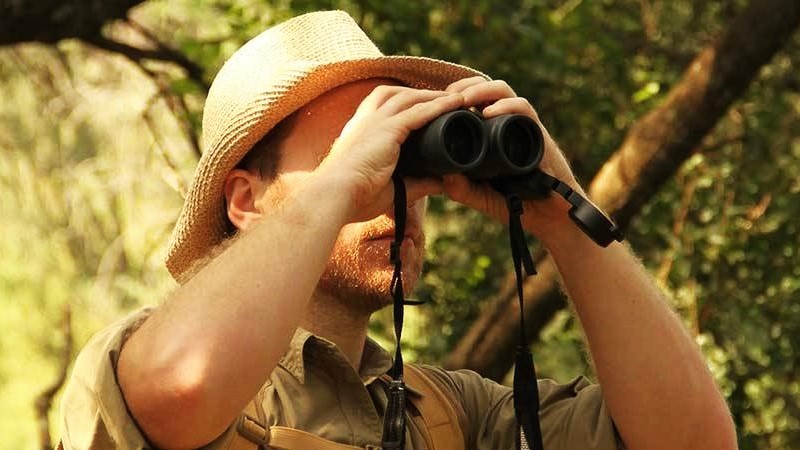
A good pair of binoculars significantly improves the safari experience!
– Still have questions about safaris in Africa? We’re happy to answer them and address any relevant concerns that you may have. Contact us through our website now for prompt assistance.
Sharing is caring!
Let’s start planning
- Safari / 13
- Wildlife / 13
- Activities / 2
- Eco travel / 1
- Family Safari / 3
- Food & Culture / 1
- Game Reserve / 6
- Luxury Safari / 5
- Off the beaten Track / 1
- Safari / 19
- Travel Tips / 17
Popular posts

Related Blogs

Newsletter sign up
Be the first to hear about our new and upcoming safari deals
Safaris Where to go FAQ When to go Activities Children
Explore our World
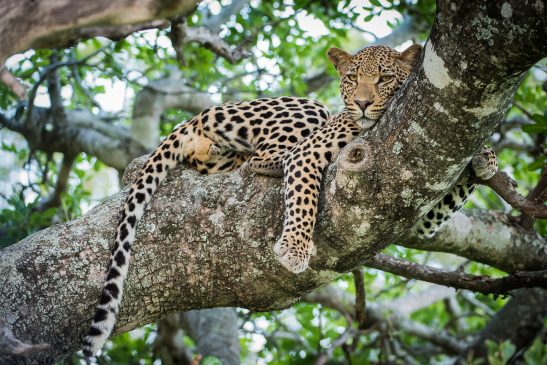
Kruger National Park
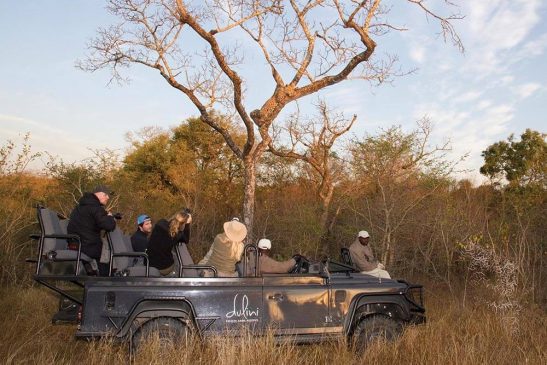
Eastern Cape
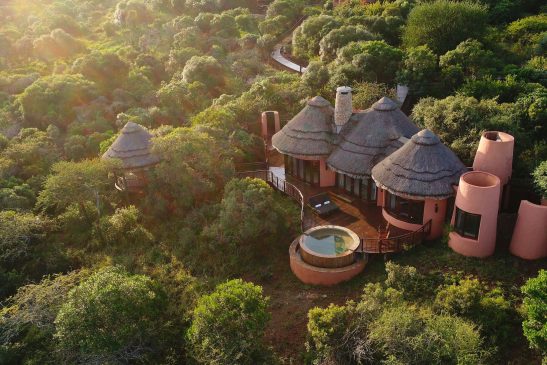
KwaZulu Natal
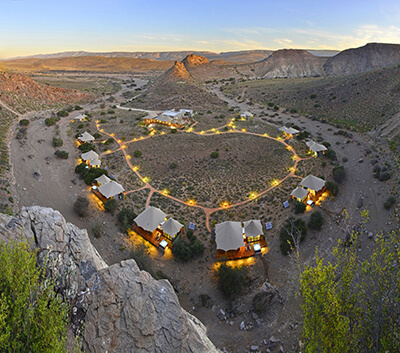
Garden Route
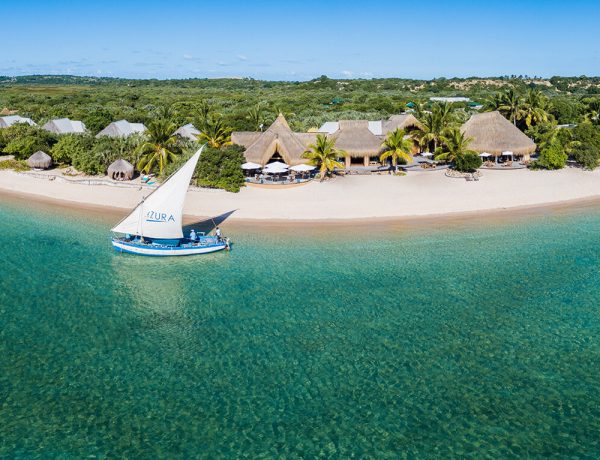
Mozambique Beach Resorts
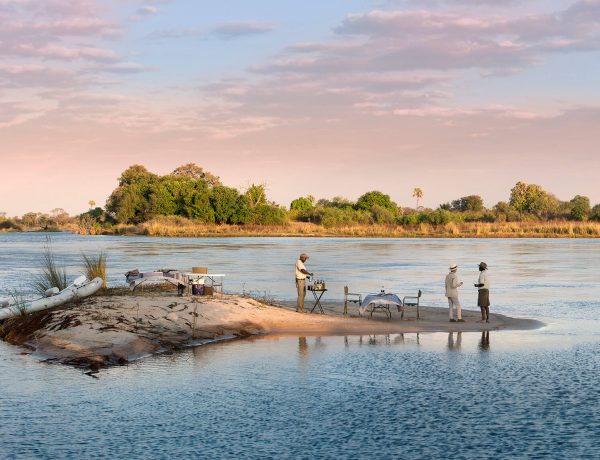
Victoria Falls Lodges

Africa Safari Trip: A Comprehensive Guide To Crafting Unforgettable Memories
H ave you witnessed a lion’s roar echo across the savanna or watched a herd of elephants lumber by? An Africa safari trip is an otherworldly experience, but where do you even begin? This guide will equip you with all the essentials to plan your unforgettable adventure . Even though it can seem overwhelming at times, if you’re equipped with the right guidance and information, the procedure is rather easy.
To help you plan the perfect safari tour in Africa, in addition to answering the majority of your frequently asked questions, we’re put together some of the greatest tips and useful suggestions.
Choosing the Location of Your African Safari Trip
An Africa safari trip promises an enchanted world of discovery, where each expedition and place holds the potential to reveal a captivating tale. Every area of this enormous continent, from the lush deltas of the south to the brilliant savannahs of the east, offers a different fabric of fauna and culture. This is more than just a journey—it’s an exploration of the core of nature, where opportunity abounds at every turn.
African safaris are unique among travel experiences because of the authentic, natural spectacle of the wild. These excursions aim to fully immerse you in the world of animals, not just observe them. Planning your destination is among the most crucial aspects of preparation for any holiday, including this one. Africa is vast, so it’d be helpful to start with a “where to go on an Africa safari trip” Google search if you have no idea what to do.
To select the ideal safari destination, you must consider the things you wish to see. Are there any specific animals or cultural events you would like to see? Kenya and Tanzania from July to October are your best choices if you’ve always wanted to see the Great Wildebeest Migration. Visit either Botswana or South Africa to see a huge herd of African elephants throughout the year.
In East Africa and the majority of Southern African nations, the “Big Five” are also widely distributed. Travel to Uganda, Rwanda or the Congo for gorilla trekking; these countries are all in Central Africa. If you want to see chimpanzees on your Africa safari tour, Uganda is the ideal place to do it.
Top 5 Choice Destinations for Your Africa Safari Trip
Here are our top five African wildlife safari destinations to help you plan your trip.
Kenya’s Maasai Mara National Reserve
At the Maasai Mara Reserves, the Big Five roam free, and boundless plains extend into the horizon on a wildlife safari. Traveling off-road and appreciating the lack of fences and lodging at any of the Mara conservation areas allows you to experience the breathtaking sight of countless wildebeests roaring across the East African savanna around the Great Migration.
From open safari vehicles, watch as lions hunt their prey with unparalleled subtlety. Elephants socialize within their close-knit groups, and elegant giraffes peruse acacia trees with grace. A fascinating insight into the Maasai people’s dynamic local culture, which is entwined with the land, its profusion of wildlife, and the natural beauties of the wildness itself, is provided by Maasai Mara.
Tanzania’s Serengeti National Park
Tanzania’s Serengeti National Park is home to a large environment that is brimming with life. See the boundless plains packed with antelopes, zebras, and wildebeests as they migrate in a never-ending dance of survival throughout your Africa safari trip. It’s what you anticipate seeing on game drives following your viewing of National Geographic or PBS programs. You might be amazed watching the big cats lounging in the shade following a good hunt, or you might experience the exhilaration of seeing a cheetah racing across the landscape in a flurry of speed.
There are other methods to observe wildlife, such as taking a hot-air balloon flight across the savanna for breath-inspiring, all-encompassing views of this iconic African terrain. Seasonality is essential when thinking about visiting the Serengeti; never schedule an unplanned online vacation.
Zambia’s South Luangwa National Park
You can feel the African wilderness in Zambia, not just see it. In contrast to safaris that are limited to metal enclosures, South Luangwa encourages you to stroll among the animals rather than drive by them. Imagine your heart racing as you make your way through verdant riverine forests full of leopards hiding in their disguises, only to be astounded by vast herds of buffalo crossing wide-open savannas.
As you approach elephants bathing, listen to the Luangwa River’s rushing waters, which will lead you to the echoes of night safaris. You can unwind in the unexpected comfort of fly tents or treehouse retreats when the stars adorn the sky.
South Africa’s Greater Kruger National Park
You can journey across acacia woodlands and tour places with sun-filled savannas along the rushing waters of the Sabi River in South Africa’s Greater Kruger National Park. Hear the echoes of prehistoric existence and see the exhilarating dance of adventures amidst the rare species. Renowned for its almost assured Big Five meetings, you get to experience the exhilarating thrill of seeing elephants trumpeting by a waterhole or lions relaxing in golden light—you don’t have to imagine it.
There is more to Kruger’s artistry than the Big Five. Higher populations of predators and a more varied array of species can be found in the superb private game reserves found in the Greater Kruger National Park. Wander along the river where crocodiles and hippos sunbathe before becoming lost in the rainbow of more than 500 different bird species.
Botswana’s Okavango Delta
Emerald islands emerge from the reflecting waters of the spreading waterways of Botswana’s Okavango Delta, a UNESCO World Heritage Site. A mokoro is a native dugout canoe in which you may sail softly and intimately while spotting sleeping hippos afar and thirsty elephants sipping at the riverbanks .
Search among the trees for one of the greatest spots to see leopards or take in the aerial views of storks, eagles, and pelicans.
In such a distant location, the Okavango Delta boasts one of the largest concentrations of upscale safari resorts in Southern Africa, providing you with exclusive access to convenience and uncrowded rivers for a singular embrace of unspoiled wildlife.
Tips For An Outstanding African Safari Adventure
The foundation of a great African safari is effective communication. It makes sure you get the best possible experience out of your trip by bridging the gap between what you expect and the actual conditions of the environment. There are three communication techniques to help you receive the experience you want by interacting with an Africa safari trip guide or travel advisor .
Clearly state your demands and desires. Tell us about your ideal speed, cultural attractions, the wildlife you hope to see, and any unique interests you may have, such as birdwatching or photography. This enables your guide to customize your safari adventures based on your interests and budget. Mention any possible restrictions. Any physical restrictions or sensitivity should be disclosed to your guide to guarantee a fun and safe trip.
Pose inquiries. Never be afraid to ask questions about anything that piques your curiosity, be it local customs or the behavior of animals. Your guide holds a wealth of information that is just waiting to be discovered.
African safaris are an ode to the diversity and grandeur of nature. Every excursion offers a chance for a profound and intimate connection with nature. However, in a world full of breathtaking locations, the real art of travel is in how you take in each one. Each destination has a spirit of its own, and you can make transforming vacation experiences with the correct itinerary in addition to ones that are simply memorable.
Whether you’re traveling to the wild African savannahs or the charming countryside of Tuscany, creating a one-of-a-kind, dreamlike trip requires careful planning and vital information. It all comes down to creating a seamless, stress-free, and uniquely personalized tapestry of memories.
People Also Ask
How far should my Africa safari trip be scheduled? It’s advisable to make reservations eight to twelve months in advance of when you wish to go or depart for your selected African safari location. Enough time guarantees availability and your place at the top of the line for the most desirable experiences that Africa presents. It is always better to schedule your safari trip earlier than undergo a last-minute rush.
When is the ideal time to go on an Africa safari trip? The dry season, which runs from June to October, is the ideal time to go on a safari. Since it’s a warmer period of the year, there’s a greater chance that you’ll spot creatures looking for water. You can also witness the famous Masai Mara migration during these months.
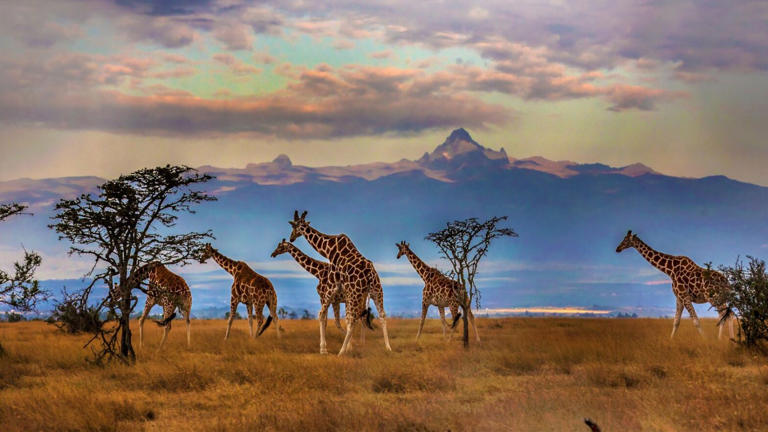

Choose Your Test
Sat / act prep online guides and tips, 20 questions game: 147 great questions to try.
General Education

The 20 Questions game has been popular for a long time, and it's played everywhere from large parties to the backseat of cars during long road trips. But, as with many favorite games, lots of people aren't sure of the "official" rules.
How do you play 20 Questions? We'll explain! Or perhaps you know the rules but want better strategies on questions to ask in 20 Questions so you can improve your odds of winning? We answer that, too! This guide covers everything from how to play 20 Questions, different versions of the game to try, over 100 ideas of things for others to guess, and a variety of great questions to ask.
What Is the 20 Questions Game?
20 Questions is a classic guessing game that people have been enjoying for decades. The basic premise is that one person chooses something (really anything) and gives the category it belongs to (such as person, place or thing). Then, the other player is allowed to ask up to 20 yes/no questions to try to determine what it is.
Why do people love 20 Questions?
- It's easy to learn (you'll see in the next section)
- It doesn't require any materials
- It works for a variety of age groups
- You can play it practically forever without repeating mystery objects
How to Play 20 Questions
To play, you need two people. If you have more than two people, one person will come up with the mystery object, and the others will guess as a team. You can also play the Forehead Detective version, which we describe in the next section.
One person chooses a mystery object without telling anyone else. They then give the category the object belongs to. In ye olden times, the categories were animal, vegetable, or mineral, but people usually use different options now. Stating whether it's a person/place/thing is common, and you can create more specific categories depending on how easy/hard you want the game to be. The broader the category, the harder it is to guess correctly! In our sample ideas below, we've used five common categories.
Once the mystery object has been chosen and the category has been given, the other person can begin guessing. They are allowed to ask up to 20 questions before making their guess as to what the mystery object might be. Every question can only be a yes/no question. The idea is to gradually narrow down the potential options until you feel confident that you know the correct answer. Whenever you think you know what it is, go ahead and make your guess, even if you haven't asked all 20 questions yet.
Some people award a point as long as you correctly guess the object, and in other versions you get an additional point for every additional question you didn't ask. So, if you only needed 15 questions to guess correctly, you'd get one point for your correct guess, and five points for each question you didn't need to ask. If the person guesses incorrectly and still has questions left, the incorrect guess counts as one question, and the game continues. If the object isn't correctly guessed after 20 questions, the person who came up with it gets a point.
Here's an example of how the game works. In this instance, two players are playing 20 Questions, and one person decides to choose a cheetah as their mystery object. They'd give the category as "animal" (or something similar, depending on the categories you're playing with), and the other person would begin guessing. The questions could look like this:
Question 1: Is it a bird? No
Question 2: Is it a mammal? Yes
Question 3: Is it a common pet? No
Question 4: Does it eat meat? Yes
Question 5: Does it live in large groups? No
Question 6: Does it live in North America? No
Question 7: Does it live in Africa? Yes
Question 8: Does it have spots? Yes
Question 9: Is it a cheetah? Yes! That's the correct answer.
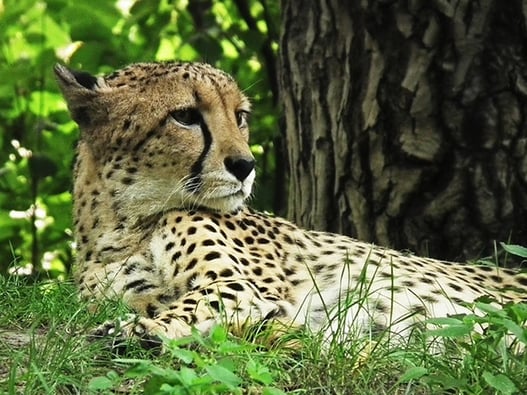
Variants of the 20 Questions Game
Because 20 Questions has been popular for so long, it's no surprise that different versions of the game have sprung up. Here are four variants you might want to try out.
Vermicelli and Vespucci
Forehead detective, 147 good ideas for 20 questions.
Need some help with suggestions for the 20 Questions game? We've got them! Below are over 100 ideas, organized into five categories. We aimed for ideas that were tough, but not impossible to guess. You don't want to choose something your guessing partner has never heard of, because it's not fun if they don't have a fair chance. Similarly, you also need to choose something you know a good amount about, otherwise you won't be able to correctly answer the questions! Read through them and see which ideas are best for you.
Common animals for 20 questions are usually elephants, lions, dogs, etc. The animals listed below are a bit less obvious, but still species most people will know.
- Vampire bat
- Humpback whale
- Snapping turtle
- Snow leopard
- Hippopotamus
- Komodo dragon
- Great white shark
- Peregrine falcon
For this list, we aimed for a list of recent and historic, real and fictional characters, although you can always set more specific parameters to make guessing easier.
- Amelia Earhart
- Albert Einstein
- Katniss Everdeen
- Margot Robbie
- Richard Nixon
- Leonardo da Vinci
- Ringo Starr
- Ebeneezer Scrooge
- Jane Goodall
- Malala Yousafzai
- Darth Vader
- Michelle Obama
- Jackie Chan
- Queen Victoria
- Quentin Tarantino
- Misty Copeland
- Thomas Edison
- Billie Eilish
- Genghis Khan
- Elvis Presley
- Joan of Arc
- Dwayne "The Rock" Johnson
- Martin Luther King Jr.
- Celine Dion
- Homer Simpson
- Freddie Mercury
The places in this list are all well-known and specific locations, although, if you prefer, you can always include more generic ideas like a school or hospital. Whatever works best for you and the people you're playing with!
- Grand Canyon
- Times Square
- Mt. Everest
- Death Valley
- Amazon Rainforest
- Machu Picchu
- The White House
- Stonehenge
- Disney World
- The North Pole
- Pearl Harbor
- Yellowstone National Park
- Great Barrier Reef
- Mount Rushmore
- Niagara Falls
- Mariana Trench
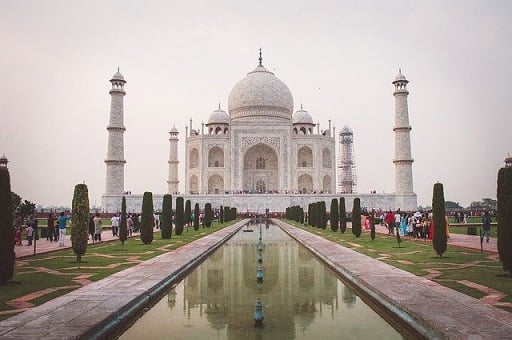
Whatever you do, don't pick pizza! It's by far the most popular 20 Questions food guessed. You can allow any kind of food/drink if you prefer or narrow your options by only allowing individual foods, rather than recipes with multiple ingredients/names (i.e. allowing sweet potatoes but not sweet potato casserole).
- Whipped cream
- Pigs in a blanket
- Swiss cheese
- Peanut butter and jelly sandwich
- Cauliflower
- Sweet potato
This is the broadest category, so you may want to refine it even further by creating categories like "nature objects," "household objects," "famous objects," etc.
- King Tut's mask
- Rocking chair
- The Mona Lisa
- The Crown Jewels
- Wrapping paper
- Fire extinguisher
- The Titanic
- Northern Lights
- Christmas tree
- Stained glass
- Hollywood sign
- Tennis court

Good Questions for 20 Questions
Now here's some help for the person on the other side. If you're the one who's guessing, what are good questions to ask? We've come up with five questions for each category. No matter what your partner has chosen, these questions will get you closer to the answer. As for the other (up to) 15 questions you'll need to ask? Remember that they can only be yes/no, should start off broad and get more specific, and, ideally, each question should eliminate a large number of options until you get to the final few 20 Questions game questions.
- Is it a mammal/bird/fish/reptile?
- Is it big/small?
- Can it fly?
- Does it eat meat/grass/bugs?
- Does it live in Africa/North America/Asia?
- Are they a real person?
- Are they a man/woman?
- Have I met them?
- Are they alive?
- Are they a movie star/athlete/politician/etc?
- Is it famous?
- Have I been to it?
- Would I need a plane to reach it?
- Is it a hot/cold/wet/dry place?
- Is it often crowded?
- Is it a raw food/cooked dish?
- Is it a fruit/vegetable/meat?
- Is it sweet/sour/savory?
- Have I eaten it before?
- Do I like it?
- Is there one in this room?
- Is it light enough to pick up?
- Is it rare/common?
- Would it be expensive to buy?
- Is it used more for fun/work?
Summary: Good Questions for 20 Questions Game
The 20 Questions game is a long-time favorite because it's easy to learn, requires no materials to play, and can be tailored to different ages and knowledge levels. Wondering how to play 20 Questions? One person chooses any person/place/thing/etc. and gives the category it belongs to. The other person then can ask up to 20 yes/no questions to correctly identify the mystery identity. Wondering how to win 20 Questions? Good questions for 20 Questions are those that allow you to cut out large swathes of potential answers with each question so you gradually narrow down your pool of potential answers. In our guide, we give good questions for 20 Questions players to ask, depending on the category they're using.
What's Next?
How do you get a baby astronaut to fall asleep? Learn the answer and lots of other punchlines with our list of the 119 best jokes!
Interested in science experiments for kids? Read our guide to see 37 of the most fun science experiments you can do with children .

Christine graduated from Michigan State University with degrees in Environmental Biology and Geography and received her Master's from Duke University. In high school she scored in the 99th percentile on the SAT and was named a National Merit Finalist. She has taught English and biology in several countries.
Ask a Question Below
Have any questions about this article or other topics? Ask below and we'll reply!
Improve With Our Famous Guides
- For All Students
The 5 Strategies You Must Be Using to Improve 160+ SAT Points
How to Get a Perfect 1600, by a Perfect Scorer
Series: How to Get 800 on Each SAT Section:
Score 800 on SAT Math
Score 800 on SAT Reading
Score 800 on SAT Writing
Series: How to Get to 600 on Each SAT Section:
Score 600 on SAT Math
Score 600 on SAT Reading
Score 600 on SAT Writing
Free Complete Official SAT Practice Tests
What SAT Target Score Should You Be Aiming For?
15 Strategies to Improve Your SAT Essay
The 5 Strategies You Must Be Using to Improve 4+ ACT Points
How to Get a Perfect 36 ACT, by a Perfect Scorer
Series: How to Get 36 on Each ACT Section:
36 on ACT English
36 on ACT Math
36 on ACT Reading
36 on ACT Science
Series: How to Get to 24 on Each ACT Section:
24 on ACT English
24 on ACT Math
24 on ACT Reading
24 on ACT Science
What ACT target score should you be aiming for?
ACT Vocabulary You Must Know
ACT Writing: 15 Tips to Raise Your Essay Score
How to Get Into Harvard and the Ivy League
How to Get a Perfect 4.0 GPA
How to Write an Amazing College Essay
What Exactly Are Colleges Looking For?
Is the ACT easier than the SAT? A Comprehensive Guide
Should you retake your SAT or ACT?
When should you take the SAT or ACT?
Stay Informed
Get the latest articles and test prep tips!
Looking for Graduate School Test Prep?
Check out our top-rated graduate blogs here:
GRE Online Prep Blog
GMAT Online Prep Blog
TOEFL Online Prep Blog
Holly R. "I am absolutely overjoyed and cannot thank you enough for helping me!”
The most Frequently asked Questions about Africa; Answered
What you want to know about a safari in africa.
When it comes to Africa, often the questions that you least expect people to ask, somehow come up. Questions range from the more ‘basic’, to extreme cases such as ‘Do wild animals roam the streets?’.There is this preconceived idea that Africa has wild animals roaming the streets and that we all live in huts!
Luckily, people have wisened up to the fact that Africa is, in fact, very built up (especially when referring to the big cities); and that wildlife are confined to national parks. Now, the most popular questions are that safety, and whether or not travellers will have an enjoyable, thrilling and adventurous stay.
Tourists want to ensure their money is well spent – especially as Africa is one of the most expensive continents to visit in the world. However, there are many affordable travel options; giving everyone the opportunity to visit this magical place.
When is the best time to go on safari in Africa?
This is a difficult question to answer as we all have personal reasons to what we prefer but Africa is beautiful all year round and each season has its own highlights. When planning a trip to Africa, find out what the highlights are to that specific season. Important factors are weather temperature, seasonal events, best times to view wildlife and when migrations takes place . Summer for beaches and mountain climbing is a popular time but is more expensive.
The cooler months especially in winter which is South Africa’s off season is less expensive and often you will find reduced rates, less crowds and the benefit of getting the chance to be closer to wildlife, experiencing the migration and to see the beautiful green lush landscapes. Spring is a lovely time to see the wildflowers of Namaqualand and the West Coast Nature reserve in Cape Town .
What should I pack for an African safari?
When packing for a safari, it’s important to dress for comfort and functionality. Wear neutral-colored clothing to blend in with your surroundings, and avoid bright colours that may attract unwanted attention. Pack light, breathable clothing, and don’t forget a hat, sunglasses, and sunscreen for protection against the sun. Comfortable, sturdy shoes are also a must, as you may be walking on uneven terrain. And don’t forget to bring a camera with plenty of memory and batteries!
Read our full and detailed article on what to pack for safari here
Is it safe to go on safari in Africa?
Every country, town and continent in the world has its fair share of crime. It’s most important that you are completely aware and informed of your surroundings and remain observant. The same goes for any African country you may be looking to visit, as each have their own challenges. Crime in Africa is not all negative, here is why:
When you hear from others that Africa has a high level of crime, people are not wrong, this is a fact, Africa does have a high crime rate. Empower yourselves with all the facts when making a decision on where you would like to go, this is important as we often make the incorrect decision based on fear, we need not fear if we surround ourselves with information and knowledge of where we will be going. Serious crimes are usually common in areas where you will find gangsters where poverty is extreme.
These areas are normally found in the suburbs, townships, rural or informal settlements known for violent crimes and gangsters. Poverty, lower income and poorer areas are places that one would find more crime but are usually not close to tourist hotspots.
The safer areas for tourists would be in popular cities, game reserves and national parks and often have security keeping criminals out. You won’t find game reserves and national parks close to the city centres, they are normally on the outskirts or a distance away from the city centre and this makes them incredibly safe and secure. Game reserves, and some parks are privately owned, and therefore access is controlled to guests only.
Crimes such as petty theft, pickpocketing are crimes that are found in the city centres. Crime is low in most tourist destinations in Africa . It’s vital that you safeguard yourself, remain aware of your surroundings, and refrain from flaunting your valuables.
Can I go on a safari and go to the beach?
There are great beaches in South Africa and most of the African countries, so yes, this is possible. The game reserves are open all year round. Make sure that when you are planning to go on a safari and enjoy a beach vacation, that the game reserve is not too far from the coast, so that you reduce your travel time. The best time of year for a combined vacation would be before winter so that you can soak up the sun during the hotter months.
See our tours to paradise, better known as Zanzibar and Mozambique !
Are the animals on safari dangerous?
Being in wildlife and coming into close contact with animals always has that element of danger. We, after all, are entering into their territory and they are unpredictable. Always listen to your guide, who will give you all the information that you need to keep safe at the start of your journey.
You will only put yourself in danger if you deliberately stray from the safety precautions such as exiting the vehicle without permission to do so. Your first safari can sometimes be overwhelming, especially as you witness the might of the wildlife, but if you listen to your guide there is nothing to fear.
Which vaccines are needed for safari?
Should you be travelling to Kenya, Zambia or Tanzania you will need a yellow fever vaccination certificate as these countries are in the yellow fever belt. Have the vaccination a week or two before you leave as these vaccinations can make you feel like you are coming down with the flu. Your travel agency should know which vaccinations would be required for certain African countries.
The most widespread and known issue is malaria. Check with your doctor and ask about malaria prophylactics, pack in an insect repellent, wear correct clothing such as long pants especially at night as this is the time mosquitoes come out. Eastern Cape and Madikwe Game Reserves which both are in South Africa are malaria-free reserves.
What animals will I see on safari in Africa?
Africa is home to a vast array of wildlife, including the Big Five (lion, leopard, elephant, buffalo, and rhino), as well as zebras, giraffes, hippos, crocodiles, and countless bird species. The specific animals you’ll see on safari will depend on the destination you choose and the time of year you visit.
What is a typical day on safari like?
A typical day on safari usually involves an early morning game drive, followed by breakfast back at camp. Midday is usually free time for relaxing, with lunch and some downtime. In the afternoon, there’s another game drive or guided walk, followed by dinner back at camp. Bedtime is usually early, as you’ll need to be up before dawn for the next day’s game drive.
Explore the wonders of Africa with us, on one of our captivating tours !

About Andrew Walton

- First-hand experience
- Advice and guidance
- We're passionate travelers
Enquire Now
- Hidden Tour Title Hidden
- Hidden Tour Length Hidden
- Hidden Tour URL Hidden
- Hidden Tour Price Hidden
- Hidden Tour Style Hidden
- Hidden Compared Tours Hidden URLs
- Your name * First Last
- Your email address *
- Hidden Alternative Email (deprecated)
- The tour you're intested in
- The tours you're interested in Please do not edit these tour names so we can assist you with your choices.
Please enter your number below.
- When would you like to travel? Apr 2024 May 2024 Jun 2024 July 2024 Aug 2024 Sep 2024 Oct 2024 Nov 2024 Dec 2024 Jan 2025 Feb 2025 Mar 2025 Apr 2025 May 2025 May 2025 Jun 2025 Jul 2025 Aug 2025 Sep 2025 Oct 2025 Nov 2025 Dec 2025
- 26 - 40 Days
- 15 - 25 Days
- 8 - 14 Days
- How many travelers? * Select... 1 2 3 4 5 6 7 8 9 10
- 12 - 17 years
- 18 - 39 years
- 0 - 11 years
- 0 - 7 years
- 8 - 9 years
- 10 - 11 years
- South Africa
- What travel style in Africa would you prefer? * Not Sure Accommodated Tour Camping Adventure Small Group Safari
- Your question or query Feel free to ask us anything! We can advise on breathtaking scenery, colourful cultures, local cuisine and of course, amazing wildlife!
- By submitting your enquiry you agree to our terms of service .
- Email This field is for validation purposes and should be left unchanged.
FEATURED POSTS

Tanzania’s Most Dangerous Snakes
The Meserani Snake Park The Meserani Snake Park stands as a captivating destination for adventurers and wildlife enthusiasts alike. Founded in 1993, this park boasts a rich history and a diverse...

Edible Insects in Africa
The history of eating insects This may ‘creep’ you out a bit, but eating insects has become a viable option in many different cultures. For example, in the northern provinces of South Africa –...
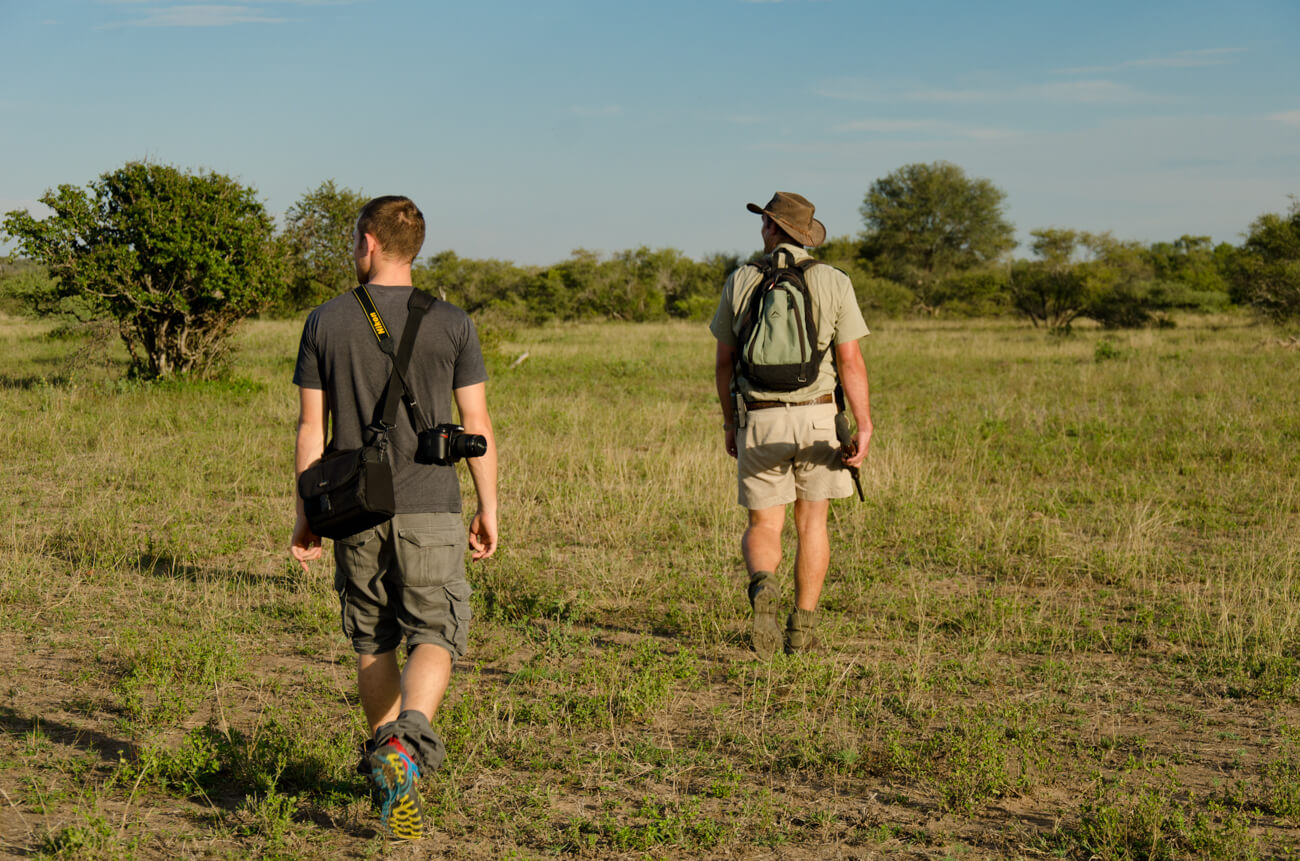
How to travel to Kruger National Park on a budget
South Africa’s flagship game reserve, Kruger National Park, offers the quintessential safari experience: abundant wildlife, diverse landscapes, from savanna to the Lebombo Mountains, thick forests...
Blog categories
- Accommodation
- Adventure Activities
- Africa Blog
- Destinations
- Only in Africa
- Travel Articles
- Victoria Falls
- Videos showing life on the road
Submit a Comment Cancel reply
Your email address will not be published. Required fields are marked *
Submit Comment
Previous Article
Next article.

- Safari Diaries

Ever imagined yourself on a wildlife viewing safari in Africa? Maybe it’s been a dream since childhood, or maybe it’s a new idea that sparked later in life – either way, you can’t wait to get on the African savannah plains and set out on a new adventure accompanied by an expert safari guide to watch the iconic wildlife!
But before you pack your bags, slather on sunscreen, and spray the insect repellant, a little planning needs to be done. While making your travel arrangements, be sure to ask yourself these 10 essential questions:
1. Where in Africa do you want to safari?
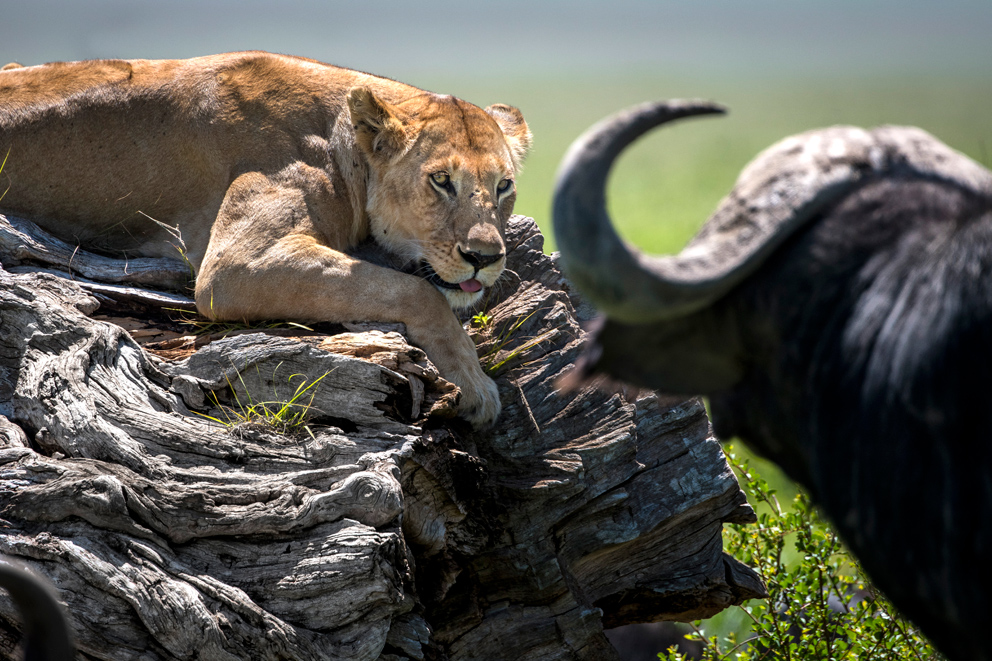
Image taken by Porini Camps guest Paolo Torchio
It is important to remember that Africa is a rather large continent composed of more than 50 different countries! Before booking your safari, consider which country it is that you want to visit. The main safari destinations for wildlife viewing and photography are in Southern Africa (Botswana, Namibia, South Africa), Eastern Africa (Kenya, Rwanda, Tanzania, Uganda) and Central Africa (Zambia, Zimbabwe).
Tanzania is home of Mt. Kilimanjaro, Africa’s tallest mountain and the famous Ngorongoro Crater and Serengeti National Park.
Kenya is where the magic truly happens. You can spot all the Big Five (lion, leopard, buffalo, rhino, and elephant) in Ol Pejeta Conservancy and there is a wide selection of excellent wildlife parks, reserves and conservancies to choose from. Maasai warriors act as guides, enriching your experience while staying in the bush. The Great Wildebeest Migration travels through Kenya, and throughout the entire year there are hundreds of different species to see.
Botswana is the size of France but has a total population of only 2 million, which is smaller than many of America’s states! There is certainly a feel of “getting away from it all” when taking a safari there.
Zambia is known for its breathtaking vistas, including the incredible Victoria Falls. The waterfall straddles the Zambia-Zimbabwe border, and its mist can be seen from up to 12 miles away.
Love gorillas? Rwanda and Uganda offer Mountain Gorilla safaris where you can track them in the rainforest. With less than 1,000 of these beautiful creatures in existence, education is crucial for their survival. And what’s a better way to educate yourself than to see them in person?
South Africa provides a unique experience for those who appreciate additional activities during a safari. For instance, explore all that Cape Town has to offer like Table Mountain. Or relax on one of the hundreds of beaches on Africa’s southern coast.
2. Which country should you choose for your first wildlife viewing safari?

This is what Brian Jackman, one of the UK’s best-known travel writers on Africa, had to say, writing in the Daily Telegraph newspaper:
“ So where should you go for your first taste of safari life? Africa is so vast, its horizons so wide. Some of its big-game strongholds are the size of small countries. Among the finest are Botswana’s Okavango Delta, Zambia’s Luangwa Valley and South Africa’s Kruger National Park. But if you are planning a once-in-a-lifetime sojourn in the bush it has to be East Africa. Nowhere are animals so visible as on the high plains of the Maasai Mara and Serengeti, and the land itself is quite something. Ease of access makes East Africa a natural favourite for first-timers. It takes only eight hours to fly from London to Nairobi. If you catch an overnight flight from Heathrow you can transfer to a light aircraft next morning and be in the bush in time for brunch. Such things are possible in Nairobi because Kenya’s safari industry is backed up by an efficient tourist infrastructure with a dazzling choice of camps and lodges to suit all budgets. This is, after all, where modern safaris were invented back in the Twenties. ”
We agree with what Brian says and for people living in countries outside of Africa we recommend that for your very first safari you should choose Kenya, in East Africa, for these reasons:
- Wide choice of International Airlines for daily flights to Nairobi with competitive fares and only 8 hours flying time from London.
- Good range of international hotels in Nairobi for first or last night before or after the safari.
- Excellent parks, reserves and wildlife conservancies with huge variety of wildlife and good choice of excellent safari camps and lodges .
- Easy access to the best-known wildlife parks in Africa by daily scheduled light aircraft flights from Nairobi.
- Friendly, hospitable people who speak English and who welcome visitors.
- Good standards of service in hotels and long tradition of looking after overseas visitors.
- Opportunity to have a beach holiday after safari at Kenya’s coast or in Zanzibar.
- Add-ons available to Rwanda, Uganda or Tanzania in combination with a Kenya safari.
If you do choose a Kenya safari, then there are some more questions to ask to ensure you choose a safari that will be just right for you – read on!
3. When is the best time to go on safari in Kenya?

There really is no “right” answer because anytime is a good time to visit! Since Kenya is located on the equator, it is considered a “year-round destination.” It really depends on you and what you prefer.
For instance, January-March are the “hot” months. During this time, animals tend to congregate around the watering holes, which provides an excellent view of the wildlife.
April and May comprise Kenya’s rainy season—and some camps close in May when the rains are at their height. But even though there is a good amount of rain, it’s usually at its heaviest at night, so there are always some sunny days!
June is a beautiful month to visit as the vegetation is lush after the weeks of heavy rain. Many animals are having their young during this time, which would be an incredible scene to witness!
July and August are actually the cool months in Kenya. They are a fantastic time to go on safari if you are interested in seeing the Great Wildebeest Migration, but be aware that this can also be a very crowded time inside the Mara Reserve with many more tourist visitors.
September and October have wonderful weather and wildlife viewing, before a shorter rainy season begins again in November and December.
Truly, it depends on your schedule and what type of animal-viewing you prefer. But no matter when you choose, it’ll be the adventure of a lifetime!
4. How long do you plan to be on safari?

How much time can you dedicate for your trip to Africa? Ideally, you need to give yourself at least a week to truly appreciate the safari experience, but if you can get away even longer, you’ll be so glad you did.
Make sure you allow enough time at each camp so that you can go on several game drives to see the area and its wildlife. Avoid the temptation to try and cram in many different parks, staying just one or two nights in each place, as this will increase travel time between the parks and decrease the amount of time you’ll have for wildlife viewing.
Each camp has its own itinerary so you can get a good feel for what you will be doing if you stay there. Choose two or three camps to stay at for a 6-10 day safari experience .
5. What animals are your “must sees” while on safari?
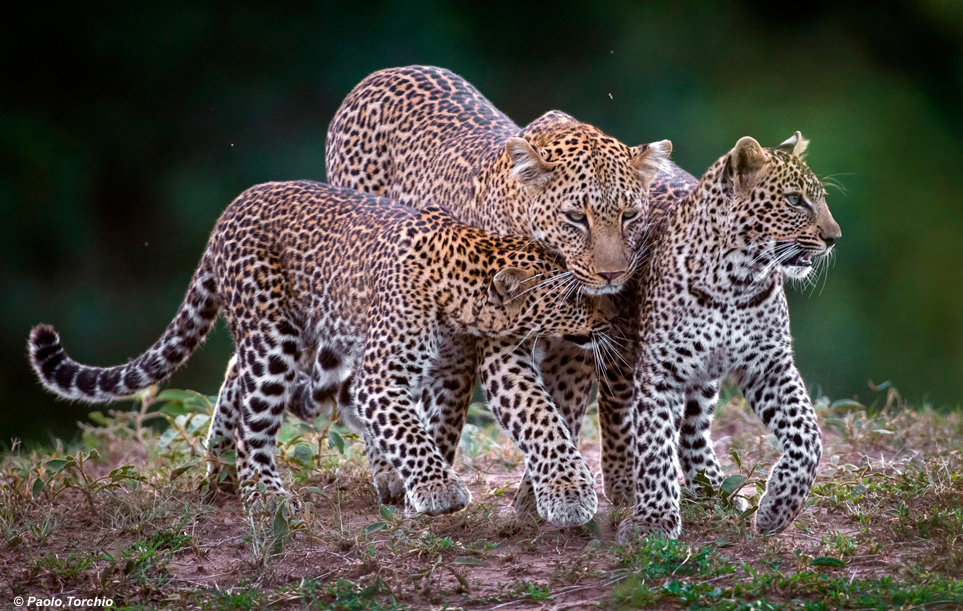
Image by Porini Camps guest Paolo Torchio
Could you imagine visiting Africa and leaving without having seen a herd of elephants? Or sighting all the iconic African wildlife species like Zebra, Giraffe or Rhino? What is on your “animal bucket list?” Your answer could play a huge part in where you go and when you travel. For instance, there are lots of Big Cats in the Mara Conservancies . The Mara is also the place to see the Great Wildebeest Migration.
If you aren’t entirely sure where your favorite animals are located, take a glance at this list to get a good feel of where you should go.
6. What kind of lodging experience are you looking for?
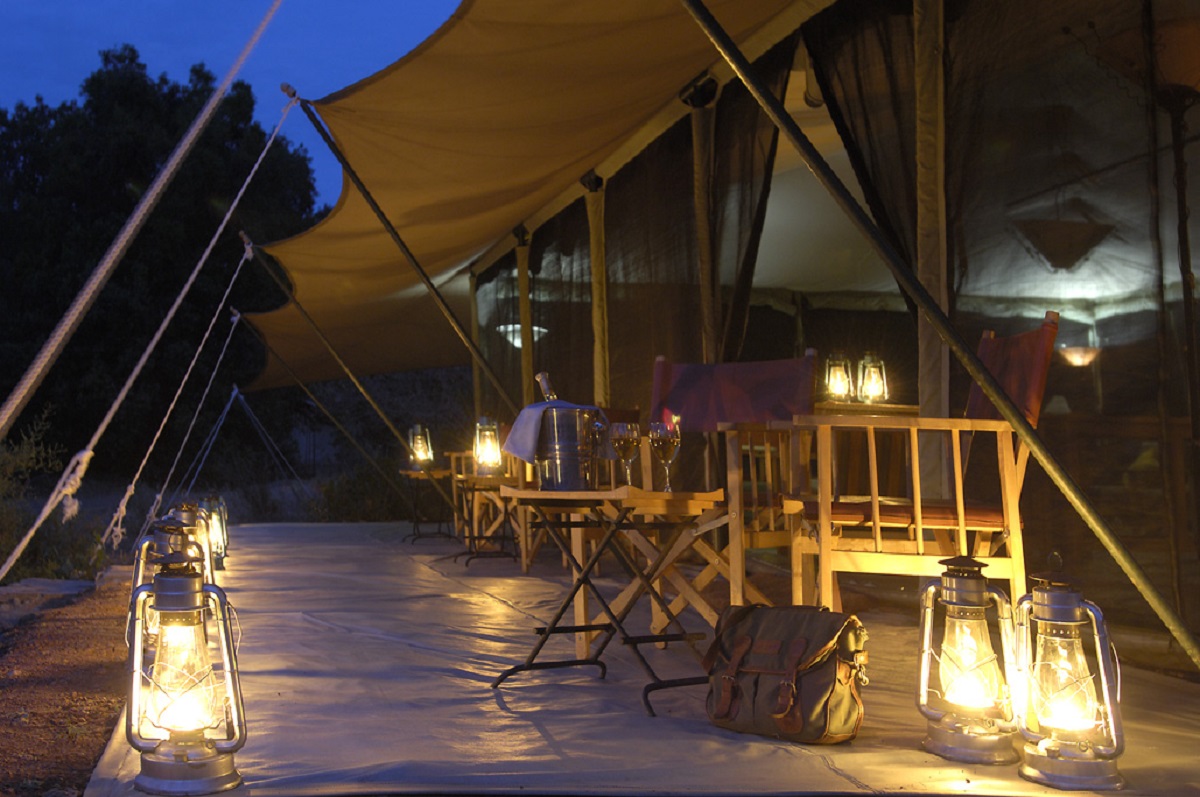
Take 360 degree virtual tours of some different camps
When it comes to choosing where you want to stay on safari, there are lots of considerations. Of course, the first is usually budget. Keep in mind that when you plan to stay can affect the cost as well. Prices will be higher in the more popular months such as July and August.
Another point to consider—some of the camps and lodges can be booked on a “game package rate” (to include game drives, meals, drinks, and transportation as a part of their price per night). And some camps and lodges are based on a Full Board basis only – with optional game drives and extras payable when you are there. So do be sure to check carefully what is included before you confirm your arrangements!
Next, think about the type of lodging you’d prefer. Do you like the thought of staying under the stars, able to hear the call of the wild? Or is the idea of a hotel more enticing? You can choose either one—or both—on your Kenyan safari.
Finally, do you want to make sure you leave a positive mark on the environment and its inhabitants? The Porini camps are committed to responsible tourism and take extraordinary measures to be eco-friendly and conserve natural resources.
7. Are you planning on adding any “extras” to your trip?
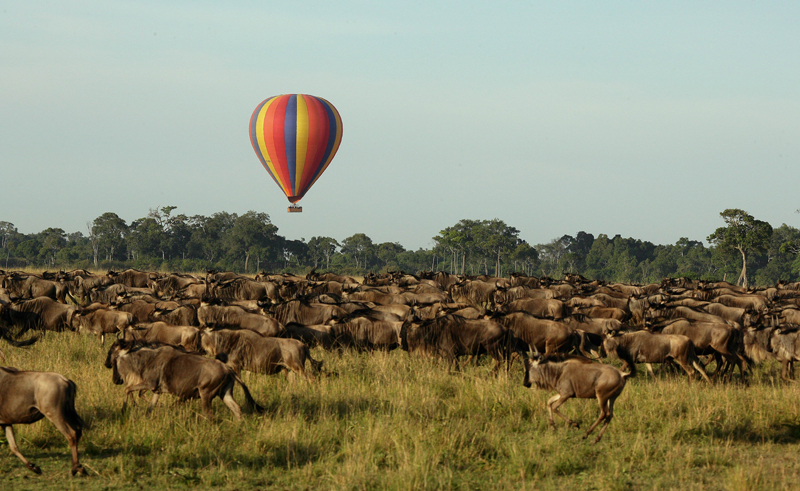
There are some awesome experiences you can add to any safari—but you need to book in advance. Imagine waking up before the sun, only to watch it rise from the same eye level as the birds. A tranquil hot air balloon ride over the savannah is the perfect way to see a side of Kenya that few will ever experience. Did we mention there’s champagne included?
Another amazing add-on: ending your safari adventure with a little R&R on the white sand beaches of the Indian Ocean. After your safari you can fly to the coast for a few days before flying back to Nairobi to connect to your home-bound flight.
8. What items and clothing should you pack?
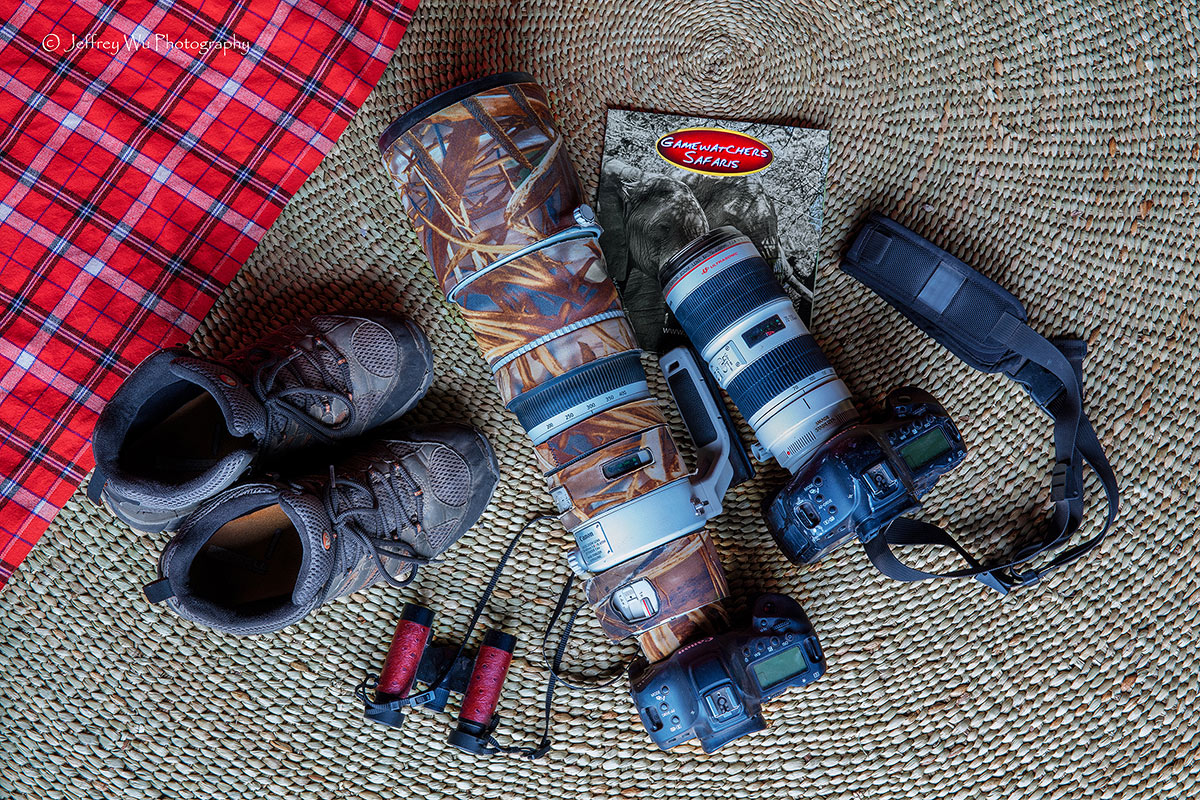
Light packing is required for your safari, if possible, as there are weight limits on planes, especially the smaller aircraft that will be taking you from camp to camp. However, if you are travelling elsewhere after your safari – such as to the Coast – many tour operators offer the ability to leave your main luggage in storage and you can travel lighter to the wildlife areas.
You’ll want to wear lots of greens and khakis, but nothing that looks like military-style camouflage-print, since that is reserved for security personnel. Simple shirts and shorts, chinos, and light jackets are great to bring. Sturdy walking shoes or trainers are a must as well as a pair of flip flops or sandals for wearing around camp. And you can’t forget a good safari sun hat!
If you are going to the highlands of Kenya such as to Ol Pejeta Conservancy then it can get chilly on early morning or evening game drives, so we recommend taking some warm items of clothing, such as fleeces or sweaters, which can be peeled off, when it gets hotter later in the day.
Don’t forget important documents (passport, health cards, airline tickets), medicines (prescriptions, malaria prophylaxis, motion sickness pills), and other necessities like toiletries, but don’t bring any fine jewelry or other valuable items.
Of course you will need your camera to capture the sights and scenes of safari. Our recommendations are here .
Finally, we recommend having your own pair of binoculars for each person travelling. A magnification of between 8x and 10x is ideal for most safari binoculars.
See our full recommended Packing List here.
9. What type of safari transport should you use?

You can either travel by aircraft or road—and road travel takes a lot more time than you’d expect. You can easily gobble up entire days of your trip just getting from camp to camp.
Air travel is infinitely preferable if there are more than a few miles between destinations. A fly-in safari conserves your precious time and is generally more comfortable all around.
Whilst on safari, you may see a range of different vehicles driving around. At the camps and lodges, open sided vehicles with high canvas roofs are used. These are perfect for wildlife viewing and photographic opportunities. Road safaris use closed sided vehicles with sliding glass windows and roof hatches, as these protect passengers from weather conditions and dust on the main roads.
10. What sort of preparations do you need to make before traveling to Africa?

Before you head to Africa, there are some essential preparations that can take a little time. First, you’ll need a passport with at least six months’ validity from your departure date, as well as two open pages for your visas. Kenyan visas are US$ 50, and you must bring that in exact cash if you haven’t purchased it prior to your trip (read more details here ).
Secondly, you may need a few jabs—most health professionals recommend immunizations for typhoid, hepatitis, and polio inoculations if you aren’t already up-to-date, and antimalarial medication is essential. Most antimalarials need a little lead time to be effective before you travel, so be sure to get instructions from your doctor. Avoid mosquito bites by using repellent and wearing appropriate clothes that cover skin in the evening.
Some other considerations include travel insurance, international phone plans, and currency .
11. What can you expect as a typical day on safari?
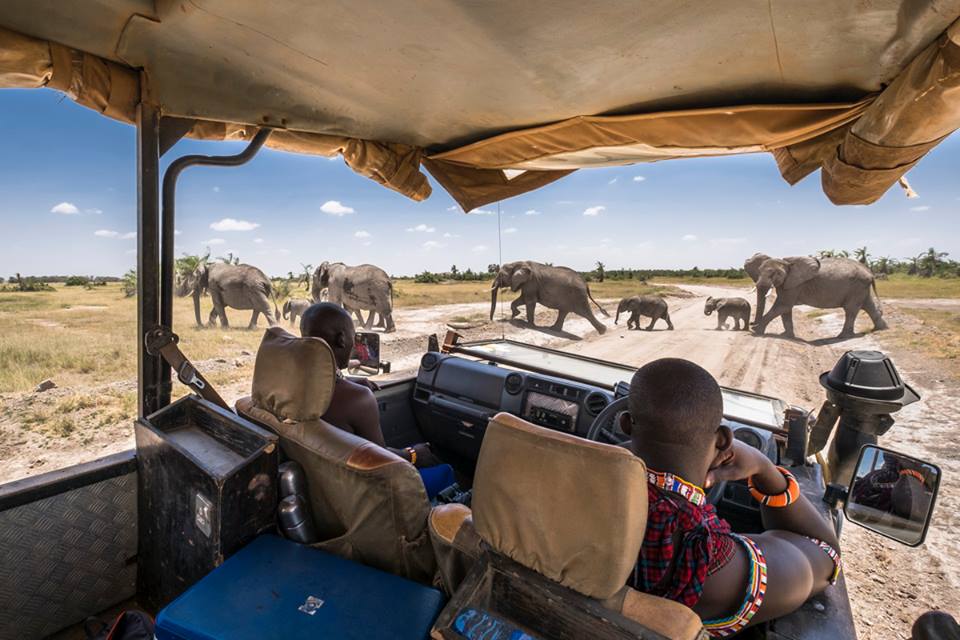
Wake up to the song birds gently telling you it’s time to start your day. Have a hot tea or coffee and light snack before embarking on your first game drive or guided walk for the day. Mornings are a wonderful time for wildlife viewing as they are cooler and many animals are active.
After your early morning activity, return to camp for a full breakfast / brunch. During the heat of mid-day, most animals are resting, so it’s time for you to do the same. Enjoy a refreshing shower, chat with fellow travelers, or catch up on that book you’ve been trying to read for ages.
Following afternoon tea, set out for another game drive, usually concluded with a sundowner and a picture-perfect view of the sun setting over the savannah. At night, there are night game drives to search for nocturnal animals.
Finish off your evening with dinner prepared by the camp chef and cold drinks or wine, and enjoy conversation with your fellow camp-mates around the camp fire.
See yourself on safari?
If you’re ready to get started planning your Kenya safari, get in touch today .
Or, if you are still researching your options then sign up for our free 6-part How to Book A Safari email series and discover how to make the most out of your time and budget.
- Conservation
- Local People
- Gamewatchers News
Sign up to our Newsletter
Popular posts.
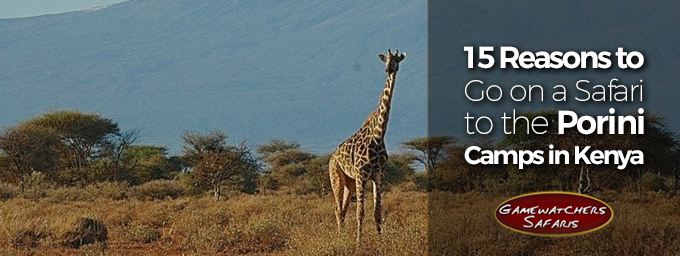
Concerned about the security of your booking and your own safety while on safari?
We fully appreciate your concerns when it comes to booking a safari in Africa and you can rest assured that your financial security when booking and your own personal safety when on safari is our highest priority. Gamewatchers Safaris is a member of the Kenya Association of Tour Operators bonding scheme, backed by a leading insurance company, to ensure your payments are fully protected if a bonded KATO member ceases trading.

- Recommended Kenya Safaris
- Specialist Safaris
- Kenya Safari Camps & Lodges
- Kenya Parks & Game Reserves
- Tanzania Safaris
- Rwanda Safaris
- South Africa Safaris
- Botswana Safaris
- Zambia Safaris
- Uganda Safaris
- Republic of the Congo Safaris
- Madagascar Tours
- Namibia Safaris
- Zimbabwe Safaris
- Kenya Beach Resorts
- Mozambique Beach Resorts
- Madagascar Beach Resorts
- Seychelles Holidays
- Mauritius Holidays
- Zanzibar Holidays
- Safari Honeymoon Packages
- Travel Information
- Frequently Asked Questions
- Customer Comments
Gamewatchers Safaris Ltd P.O. Box 388 - 00621 Village Market Nairobi Kenya
Tel UK: 07986 978985 Tel USA: 1-877-710-3014 Tel Kenya: +254-722-509200
- Privacy Policy
- About Cookies
Wild Wings Safaris
20 funniest guest questions on safari.
As a kid, whenever I asked something silly or said something funny in class, I was reminded by my teacher that everyone was not laughing at me, they were laughing with me. So in the spirit of shared giggles, we share with you some of the funniest questions and comments our guides have heard from guests on safari. Not made up, all genuine questions.
Don't worry, we'll keep them anonymous! And if you recognise your own question here, well done for asking! Remember, there's no such thing as a dumb question. Well... okay, I'm lying, I take that back. #17 is my favourite.
1. After entering the park, it was no surprise to see some herds of impala as the first animals. After seeing the third herd someone asked: "Are there enough rabbits in the park for the impalas to eat?"
2. On seeing ringbarked trees: "Is it the lions that ringbark the trees?"
3. "Do elephants have teeth?"
4. The python, Africa's biggest snake, known to devour small antelope. Someone asked hopefully: "What do they eat, insects?"
5. That first-moment enthusiasm! After seeing leopard, lions, and the endangered wild dog and black rhino all on one safari, at the end of the safari the guide asked what the highlight was. The answer: "The very first impala."
Are you the Lion King?
6. On seeing several open safari trucks in the Kruger Park: "I noticed that most of the safari vehicles have been converted by a specialist company. We don't have that company in the UK."
7. While discussing ostriches, a large bird landed in a tree just up ahead. "Was that the ostrich?" And during a barbecue dinner, the guide puts chicken drumsticks on the grill. "Is that ostrich meat?"
8. Guide: "What is the collective noun for impala?" Guest: "A shitload."
9. "Are the elephants allowed to push over the trees?"
10. "Are warthogs born alive?" Before the guide can answer, she elaborates: "... or do they hatch from eggs?"
11. In some smaller reserves, rhino's horns are sometimes cut off as a protective measure against poaching. On seeing one with the horn cut off, a guest wants to know: "Will they struggle to hunt now?"
12. "Are there any countries in Africa where there are no people?"
13. "Where in South Africa is Tanzania?" Before the guide can answer, another guest pipes up: "No, it's not in South Africa, it's near Australia." Perhaps this might explain the irrational fear of some people that they will get Ebola in South Africa, thousands of miles from where the Ebola outbreak is. - Ed
14. "Who does the landscaping in Kruger?"
And what sort of strange beast are you?
15. "Do you assist the impalas in giving birth?"
16. "Why didn't the impala climb higher up into the tree to get away from the leopard?"
17. "Was the 'Lion King' shot here?" Yes, it was. We had to reshoot it several times because Scar and the hyenas just wouldn't co-operate. - Ed
Here's looking at you!
18. "When is the feeding time?"
19. Kudus (a large antelope) are browsing on trees while some ground hornbills (a large bird) are seen on the ground, nearby. Guest: "Are the kudus going to eat those birds?"
Tongue-tired
20. From a true safari novice: "What's that animal with the black and white stripes?"
You may also want to look at
Best places to see rhinos, leopards, cheetahs or wild dogs.
What are the best destinations to see rhinos in Africa? What about some of the more elusive predators, such as leopards, cheetahs or wild dogs? These animal species are not equally common everywhere, and it helps to know where you might be most likely to see them.
Bush Babies: Tomorrow's Predators in the Making ...
It's baby season for big cat and canine predators in southern Africa and, on any game drive in one of the bigger parks and reserves, you're very likely to come across some very cute additions to the pride or pack or solitary cats.
Is it all right to be white?
Wildlife photographer, Christy Strever, was on her way through the Timbavati Private Game Reserve when she spotted a troop of vervet monkeys playing in the road. Stopping to watch their cute, humanlike antics, she was totally awestruck to see a snow-white monkey shoot out from the bushes, chasing its playmate.
About the author

Onne Vegter is the managing director of Wild Wings Safaris. He has a deep love for Africa's people, wildlife and natural heritage. Onne has travelled to most of Africa's top safari destinations and his writing is based on years of personal experience in the safari industry. Follow him on Twitter at @OnneVegter.
This price range is intended as an estimate only. The exact rate will depend on type of room, date of travel, and number of people. Please contact us to secure the best available rate for this property.
Need help with your trip?
Why not chat to one of our safari experts who can answer all your questions and help you design your dream trip to Africa.
Wilderness Safaris Africa Quiz Answers
Your Guide to Africa
Tenneil Zondagh
Here are the answers to our Safari Quiz run on 18 December 2021. How did you do?
1. Identify these African animals
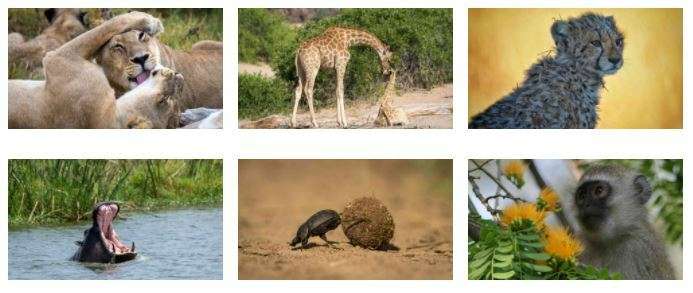
Lion Hippo Giraffe Dung beetle Cheetah Vervet monkey
2. Name these African birds
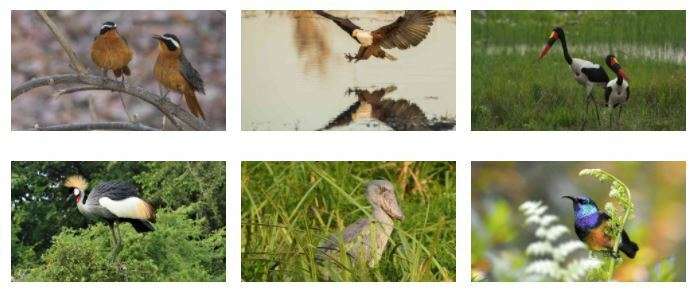
White-browed robin-chat African fish-eagle Saddle-billed stork Grey crowned crane Shoebill Variable sunbird
3. Name the African countries that play host to these landmarks

Rwanda Botswana Namibia South Africa
4. Name these African antelopes
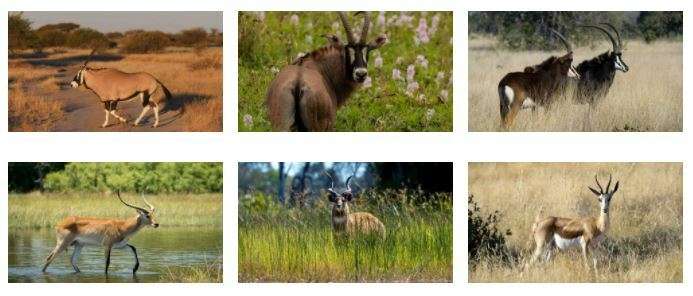
Gemsbok or oryx Roan Sable Red lechwe Sitatunga Springbok
5. Name this bird
Red-billed oxpecker
6. Also the national plant of Namibia, what is the name of this curious-looking plant?
Welwitschia
7. What is a group of zebras called?
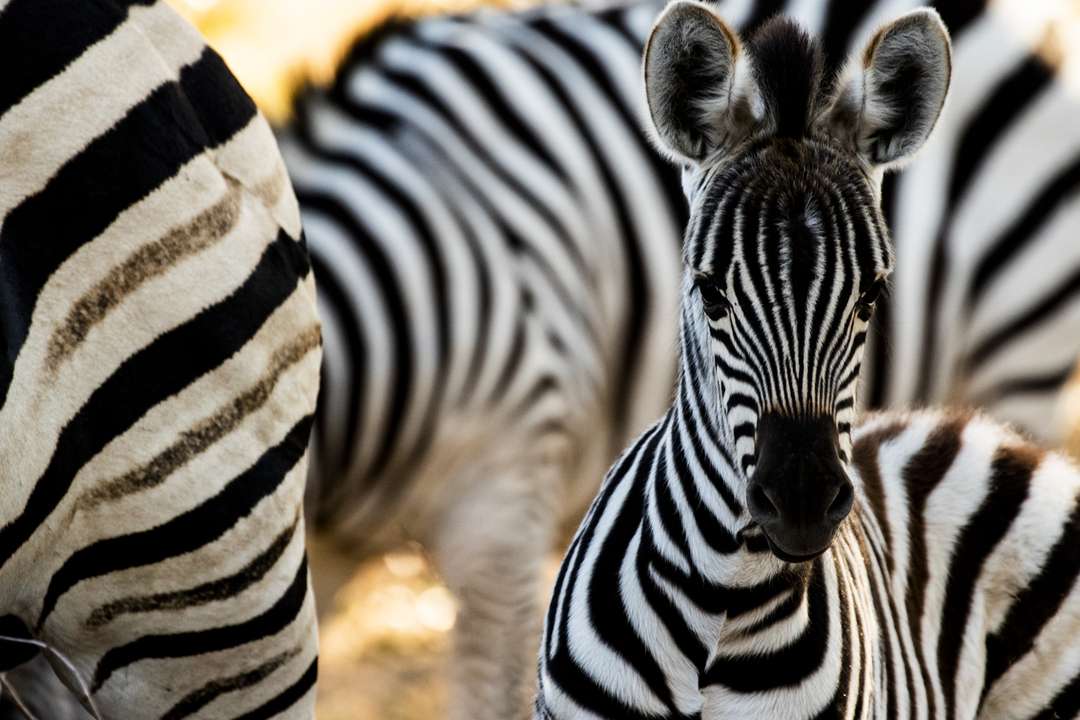
8. Name three species of [southern African] kingfishers
Terrestrial: Woodland, brown-hooded, grey-headed, striped, African pygmy
Aquatic: Giant, pied, half-collared, malachite, mangrove
9. What is the denning period of the African wild dog?
Approximately three months
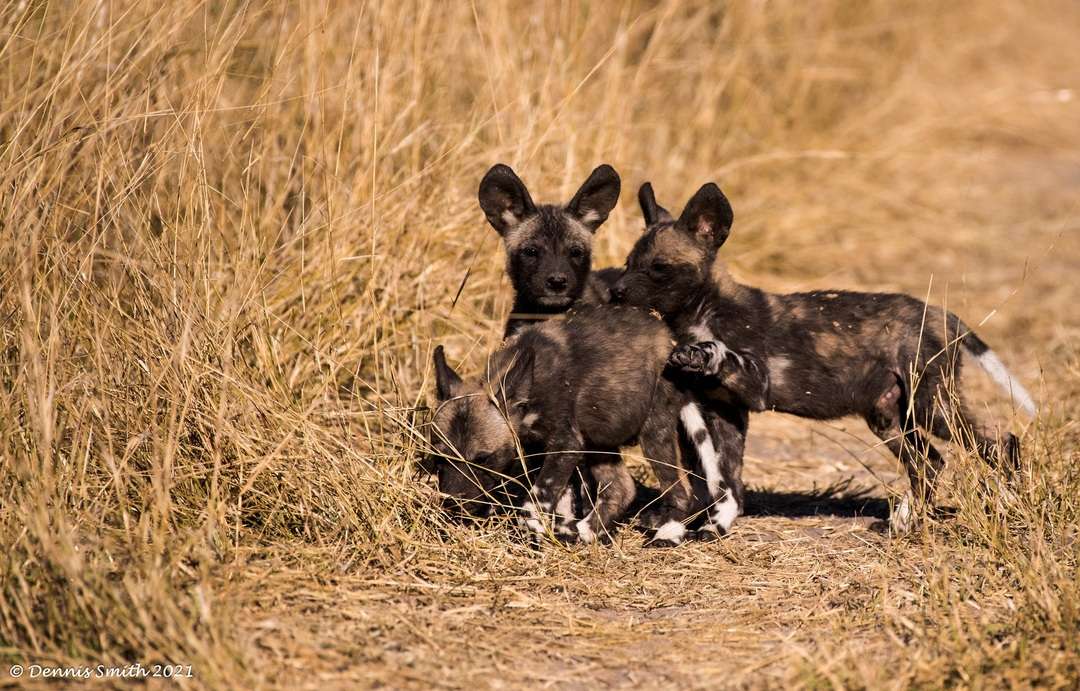
10. A baby lion is called a cub; what is a baby elephant called?
11. What are the largest and the smallest land mammals in Africa?
Largest: Elephant
Smallest: African Pygmy Mouse
12. The IUCN provides a list of endangered animals and their conservation risk status. What does IUCN stand for?
International Union for Conservation of Nature
13. Termites are the architects of the Okavango Delta. What is the name of their home?
Termitarium
14. Pumbaa, Zazu and Timon are famous Lion King characters. What species are they?
Pumbaa – warthog Zazu – red-billed hornbill Timon - meerkat
15. The “tree of life” is a common sighting in southern Africa, and is known by what name?
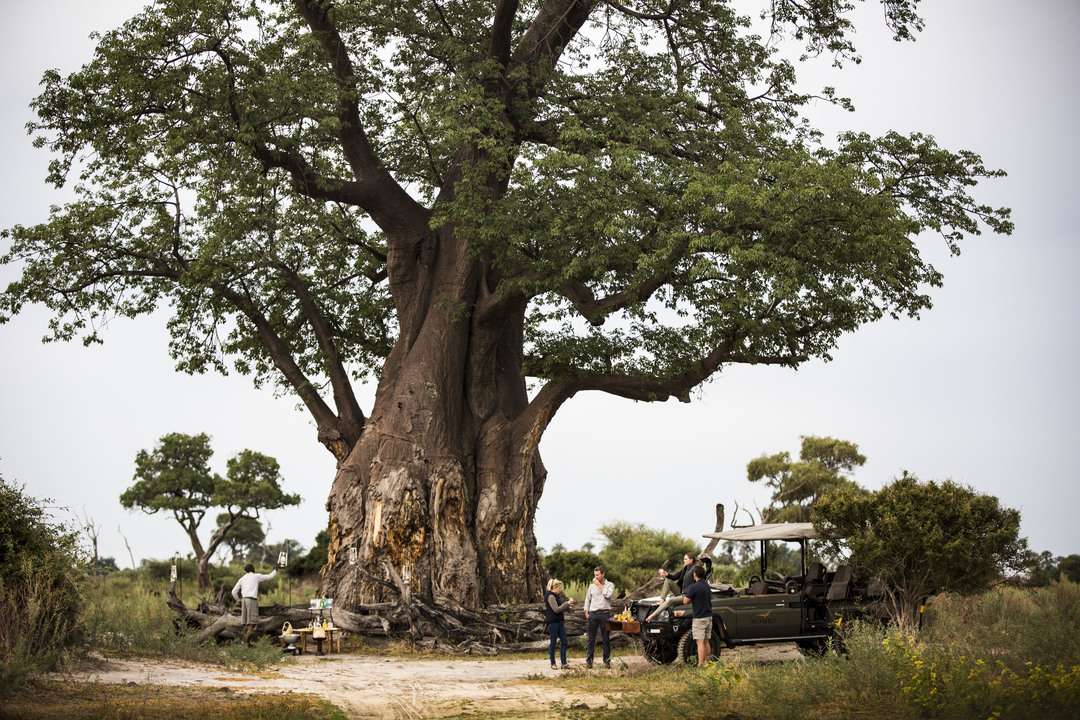
16. Newly built DumaTau in the Linyanti Wildlife Reserve has a spa and boutique area that also includes a gym and lap pool. What is this area named?
Osprey Retreat
17. Our non-profit partner is referred to as CITW and is celebrating 20 years of changing lives. What does CITW stand for?
Children in the Wilderness
18. Bisate Lodge in Rwanda opened their much-anticipated day lounge, Bisate Kwanda in 2021. What does Kwanda mean in English?
Kwanda means growth, expansion and in some translations also gift, making the Bisate Kwanda our gift to you.
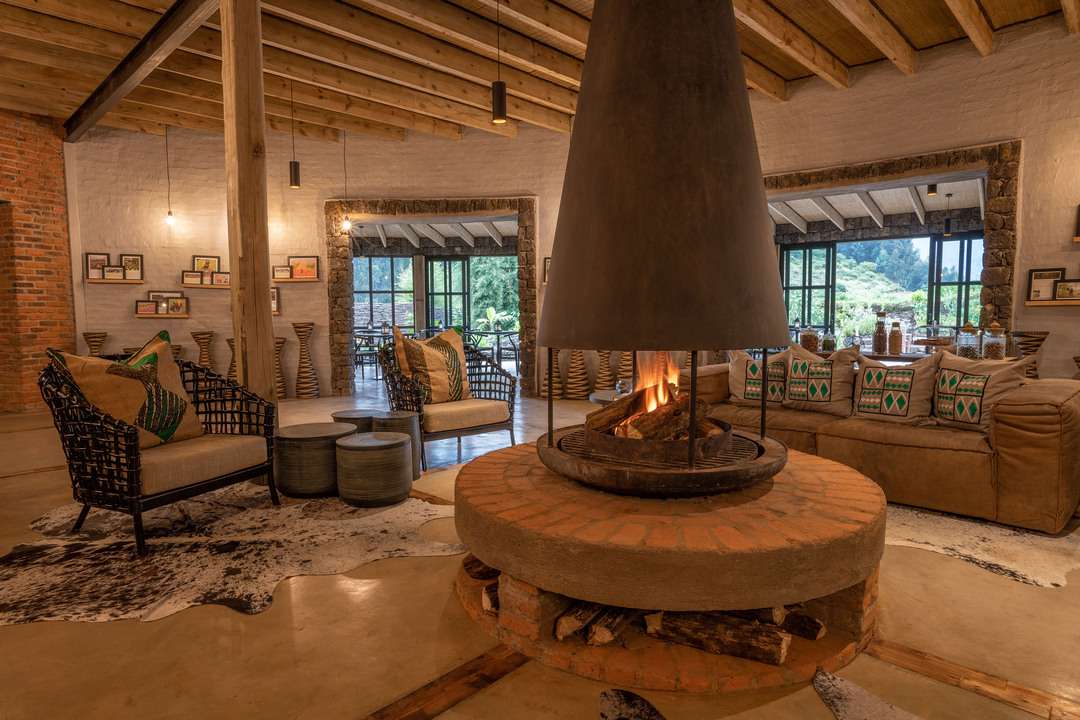
19. What Wilderness camp would you be staying at if you were enjoying an idyllic hot air balloon flight over the remote northern sector of Kafue National Park in Zambia?
Shumba or Busanga Bush Camp
20. Name the semi-nomadic people you can interact with during a trip to Serra Cafema in Namibia’s Kunene Region.

Let’s plan your next journey
When we say we’re there every step of the way, we mean it, literally. From planning the perfect circuit, to private inter-camp transfers on Wilderness Air, and easing you through Customs. We’re with you on the ground, at your side, 24-7, from start to finish. Ready to take the road less travelled? Contact our Travel Designers to plan an unforgettable journey.
Need some inspiration?
Be inspired by the latest news from Wilderness. Subscribe to our newsletter.
I've been on over 100 safaris across Africa and repeatedly see tourists make 11 big mistakes, from sleeping in to ignoring birds
- I've been on over 100 safaris and often see tourists make the same mistakes time and again.
- Some ignore birds, while others exit the vehicle to get closer to wildlife, which is dangerous.
- Here's my advice on what not to do on safari, plus tips to improve your chances of seeing wildlife.

I'm a travel writer living in Nairobi, and I've been on more than 100 safaris across Africa.
I currently live in Nairobi, Kenya, working as a travel writer and vlogger, and have been to about 15 countries in Africa over the last 10 years.
As part of my travels, I often go on safari where I'm always awed by how large elephants are, the cunning nature of hyenas, the agility of leopards, the social life of lions, and the beauty of lilac-breasted rollers.
I've been on well over 100 safaris for leisure or on assignment as a journalist, in countries like Tanzania, Uganda, Zambia, and my home, Kenya.
On many of those safaris, I've shared vehicles with other tourists, and met travelers from all over the world, from the United States to Russia and Europe. I've also observed some common mistakes that people seem to make when they take this type of trip.
Here are the biggest safari mistakes to avoid, plus my tips for how to maximize your experience.
Most often, I've observed tourists become disappointed when they don't see wildlife.
I've been to most of the wildlife parks in Kenya, like Amboseli , Samburu , Shaba , Tsavo East & West , Meru , and Lake Nakuru National Parks .
I always find the big cats impressive here, such as lionesses chasing a zebra through the plains, or a leopard hauling its prey up a tree as hyenas circle below hoping it falls.
On a recent safari, I observed two-month old lion cubs, still too young to eat meat, lapping up blood from a gazelle that their mother hunted and dragged under the shade of bushes. This sighting was, however, at the end of a three-hour morning game drive.
Whenever I'm sharing a vehicle with other tourists, particularly first timers, I see some becoming impatient after a few hours without such sightings.
It's understandable; you've come to Africa for the safari of a lifetime, and want to see and photograph it all. But as I've learned, you can't set up an appointment with wildlife. Sometimes, a leopard remains elusive.
I think you'll have a better time if you're able to relax and enjoy the sightings as they come.
In addition to being patient on drives, I don't think visitors communicate what they hope to see to their guide, or make enough attempts.
If there's an animal you really want to see, speak up.
Guides can use their expertise and knowledge of the landscape to drive to the areas where they know that you're more likely to spot the animals that you hope to see.
You should also plan to go on more than one game drive. For a two to three-day trip, I recommend going for both morning and evening drives, every day, to maximize your chances.
One of the biggest mistakes tourists make is thinking they can get out of the vehicle to take photos with wildlife. It could risk your life.
While on safari, I've seen tourists in other vehicles get out in areas to try and get close to wildlife where park rules prohibit them to do so.
You should always stay in the safari vehicle, and if you need to get out, communicate that to your guide who knows the landscape and will advise if it's safe.
Rather than risk your life, there are other places you can go if you want to get up close with animals.
In Nairobi, I like to spend time with orphaned baby elephants at Sheldrick Wildlife Trust and watch them mud bathe and guzzle milk formula. Another option I recommend is to feed pellets to Rothschild Giraffes at Giraffe Center.
And at Mosi-Oa-Tunya National Park in Zambia, visitors may join rangers to track the endangered southern white rhinos on foot, which will place you within a few feet of the animals.
Not only are experiences like these safe, but they still provide the thrill of an up-close encounter, and proceeds usually go back to the continued protection of the wildlife.
Often, I meet tourists who only go to the most popular parks, and in the high season. Then, they complain about how crowded it is.
Some of Africa's best-known parks are Serengeti National Park in Tanzania, Maasai Mara Game Reserve in Kenya, and Kruger National Park in South Africa. And I understand the popularity — all of these destinations have an abundance of wildlife and stunning landscapes.
According to Safari Outfitter & Beyond , who I've been with on safari a few times in Serengeti and Maasai Mara, the best time for a Kenyan safari is the high season from June to October, when sparse vegetation and limited water draws wildlife to waterholes making them easier to spot.
But because of this phenomenon, I've always found this time period to be busy and crowded, which can take away from the experience.
In my experience, guides tend to work collaboratively and radio one another whenever there's a sighting, and when word gets out that a coalition of cheetahs were spotted, soon there are 20 cars charging to surround them at the same time. I also find the parks become particularly busy during the annual wildebeest migration season, and lodges get fully booked as tourists travel to witness it.
I've seen first-timers then become frustrated that the experience isn't the remote safari they pictured.
If you prefer less crowds, choose a less popular park, or consider a visit at another time.
I've seen many tourists wrongly assume that Africa is hot all the time, and fail to pack warm clothing.
In my experience, visitors to Africa tend to have the perception that it will be really hot, all the time. I think this is probably because of documentaries and movies they might have watched where people are dressed as such, and that's how the landscape is portrayed.
But I've found that isn't always the case. I've experienced many cold nights in some parks, even if it's not the rainy season when it can be cold and wet.
According to Masai Mara , temperatures in that park can range between 52 and 82-degrees Fahrenheit, and I know it will feel quite cold when it hits that lower end.
I suggest that visitors bring warm clothing to layer like jackets, scarves, and even gloves. Plus, some safari vehicles are open on the sides, and in my experience, this can make it feel really cold when driving fast during the day, too.
Another big mistake I've witnessed is choosing not to wake up early for game drives.
Guides have explained to me that the best times for game drives are the cooler hours of the day, around sunrise and sunset.
They say this is because it's when the weather is more comfortable for animals. During later parts of the day, guides have said that animals prefer to stay tucked away under the shade to avoid the scorching heat. This means it's less likely you'll see much action if you choose to head out only in the afternoon.
To increase my chances of seeing wildlife, I choose morning drives that require wake-up calls as early as 4:30 a.m. On those drives, I've shared a vehicle with others where I heard them complain that it's too early.
It definitely is, and the roads can be rough, and the drives can be long and tiring, particularly if it's several days back to back. But I know morning is the best time to go if you want to see as many animals as possible.
I've spotted wildlife later in the day, too, but whenever I've come across a pride of lions around midday, for instance, they're usually sleeping.
Discuss with your guide to figure out a schedule that works best for you. If you can wake up early, though, I find the sunrises over the African bush are always so spectacular. Why would you want to miss such beauty?
Ignoring bird life is another commonly-made mistake.
It took me around 30 game drives to finally get into birdwatching.
I started off indifferent, but now I squeal with excitement when I spot a Marshall Eagle with its large wing-span perched atop a tree at Shaba National Reserve in Kenya, or if I've eyed a small gazelle, or a kettle of vultures stealing a zebra carcass from a hyena.
I wish I knew sooner that birds are really cool, and I think many visitors make this same mistake because they become too focused on just large wildlife.
I finally came to this realization thanks to helpful guides I met who helped me learn interesting facts about birds and their social life, and now I'm always left wanting to know more.
I don't think many people realize that there are many ways to do a safari.
With over 100 safaris under my belt, I've been on so many game drives that I started getting a little jaded about driving around and seeing animals from a land cruiser, every time.
So I decided to switch things up recently, and I don't think many people know there are other ways to see wildlife besides from a car.
I've now been on several hot air balloons, from which I've spotted elephants in Amboseli National Park with Mt. Kilimanjaro's snow-capped peak in the background. And it was from a balloon that I tracked black rhinos through the mud one rainy morning in Borana Conservancy .
I've also enjoyed camel-back safaris, boat cruises, and sunset walking safaris, and recommend working them into your itinerary to experience different perspectives.
Please stop bringing plastic bags and bottles into the parks.
Countries like Kenya and Rwanda have banned single-use plastics including water bottles, straws, disposable cups, and cutlery in protected areas like parks, forests, and beaches.
You're often not even allowed to bring your plastic bag carry-ons through the airports. According to section 144 of Kenya's Environmental Management and Co-Ordination act , if you're caught breaking this law, there are severe fines of one to four years in jail, or a $16,000 fine.
And while I haven't heard of cases of tourists being charged or fined, I still often see them trying to bring these items into the parks, where they're usually confiscated.
I think it's better to just plan ahead and adhere to the law, and also to make more efforts to be respectful of the land to preserve it for generations to come.
I wish lodge guests would be more considerate of others and keep the volume of their music down.
In my experience, many rooms at overnight lodges are located really close to each other.
In a few instances, I've struggled to sleep or relax as guests next to me played really loud music.
I can appreciate a good playlist as much as the next person, but I wish more tourists would be more considerate of other guests.
I find going to the bush to be a time for serenity and disconnecting from the bustle of city life. Returning to blasting music detracts from that feeling, in my opinion.
Instead, turn your music off and take your stay as a chance to listen to the sweet cacophony of nature. And should you strongly desire to still listen to Drake over the hippos grunting in the distance, please just keep your volume at a reasonable level.
Finally, I think too many tourists don't take advantage of the low season when it's much easier to plan a safari on a budget.
In the low season between March and May when there is often heavy rain, the roads get muddy and vegetation grows tall and thick.
In my experience, this draws less tourists, and as a result, lodges tend to reduce rates to attract visitors. I've found you can save a lot of money if you visit then instead of high season.
So if you're looking to go on safari on a budget and don't mind getting wet from time to time, you might want to come during this period, since I've seen firsthand that the wildlife is still visible. I also think it's a unique time since the vegetation is lush and green, the bird life is abundant, and new calves are birthed.
I've also seen that fewer tourist numbers means less congestion of vehicles in parks for a more isolated experience.
- Main content

- Use "Spacebar" or "Enter" to expand the My Account navigation menu.
- Use Down or Tab key to select next menu item.
- Use Up or Shift+Tab keys to select the previous item.
- Use Enter/Space key to visit the menu item.
- Use Esc key to leave the submenu.
- Use Left/Right arrow keys to allow users to navigate within the navigation links.
- Use Down arrow key to expand the submenu and up/down arrow keys to navigate within the submenu.
- Use Enter/Space key to select the menu/submenu items.
Save Up to 30% on Select Lawn & Pest Control Products- Shop Now »
Welcome Back!
- Sign in for a personalized shopping experience and faster checkout.
- Email Address:
- Remember Me
- Don't have an account? Sign up here
Safari 20SG Systemic Insecticide with Dinotefuran
Buy 2 or more: $137.95 each

In Stock. Normally ships in 1 business day.
For large order quotes, please call us at 866-581-7378.
Free Shipping*
Have a Question? Ask Our Pros!
You May Also Need
Average Rating
24 Reviews | 136 Q&A
Product Overview
Safari 20SG Systemic Insecticide with Dinotefuran is a super-systemic insecticide with quick uptake and knockdown, and controls a broad spectrum of ferocious and invasive pests, including Q- and B-biotype whitefly, hemlock woolly adelgid, emerald ash borer, mealybug, leafminer, fungus gnat, black vine weevil, glassy-winged sharpshooter, armored and soft scale and lacebugs some of the most costly pests that affect high value greenhouse and nursery crops such as poinsettia and hibiscus, as well as trees, shrubs and herbaceous ornamentals in the lawn and landscape market.
Product Documents
Features and Specs
Application to ornamental plants:.
- Safari 20 SG Insecticide can be applied as a foliar spray, a broadcast spray, a soil drench, soil injection and via chemigation for insect control in ornamental plants in greenhouses, nurseries, outdoor landscapes and interior plantscapes.
- Safari 20 SG Insecticide is a systemic product and will be taken up by the root system and translocated upward throughout the plant. When applied as a foliar spray, the product offers translaminar and locally systemic control of foliar pests.
- When applied to the soil, Safari 20 SG Insecticide will be translocated more quickly in herbaceous plants than in woody shrubs and trees. Speed of insect control will range from as little as one day for small herbaceous plants in containers, to several weeks in large trees growing in the landscape.
Application to Vegetable Transplants:
- Safari 20 SG Insecticide can be applied as a foliar spray or a broadcast spray for insect control in vegetable transplants.
Applications to Ornamental Plants, and Vegetable Transplants:
Safari 20 SG Insecticide can be applied using many different types of application equipment. Apply in sufficient water to ensure good coverage of ornamental plants. Tank mixing with a surfactant will produce better coverage when making applications to plants with hard to wet foliage such as holly or pine. If concentrate or mist type spray equipment is used, apply the same amount of Safari 20SG on the sprayed area as would be used in a dilute solution. To assure optimum effectiveness, Safari 20SG must be placed where the growing portion of the target plant can absorb the active ingredient. Applications can be made to foliage or as a soil drench.
Customer Reviews
See all 24 customer reviews »
White flies on coconut trees
By Doug on 04/27/2013
I followed directions and applied four times over a three week period. It didn't have any effect on white flies on coconut trees in SW Florida. I used Dominion 2L and it worked with one treatment in three weeks. Only cost $75 for three bottles to do 20 trees. Spent over $500 on Safari. Very disapointed. DMOPC was excellent to deal with on both products.
Was this review helpful to you? Yes No
36 of 43 people found this review helpful
Killing Spotted Lanternflies in Eastern PA
By James on 08/16/2019
used product to kill infestation of Spotted Lanternflies in Lancaster County, PA. Used Safari 20SG (recommended by PA Department of Agriculture) as a root drench on a pair of "Tree of Heaven" to create trap trees. Was done about 4 weeks ago. Trees or now covered with Lanternflies and the ground is covered with dead Lanternflies. I am very pleased, hopefully it will continue to kill Lanternflies until winter comes. Can send pics if you want them
32 of 33 people found this review helpful
Great product! Directions for use on palms would be helpful
By Cheryl on 09/05/2016
We just got around to using this product a few weeks ago. We used it to treat our sago palms for Cycad Aulacaspis scale. This product was what our County Extension recommended. There were no specific directions for what amount to use for sago palms, so we guessed at what strength to try. We used one teaspoon per gallon of water and used a hand pump sprayer to apply it. Within just a few days we noticed a big improvement in our palms. The scale became powdery and fell off when brushed, so we used a garden hose on high pressure to blast a lot of it off. We followed up the initial treatment with Safari a couple of weeks later, and the scale is nearly all gone from the palms now. We will treat a third time in a few more weeks, and I fully expect the Safari to eradicate the scale after that.
31 of 31 people found this review helpful
By Anonymous on 07/30/2013
Worked great on my Sago Palm Scale and the scale on my crotons.
29 of 30 people found this review helpful
Safari 20SG
By Jeff on 05/28/2014
I bought two 3 pound bottles to tree my hemlock trees in Fannin County, GA. I recommend that you find a clean container to hold your water and this chemical. Mix thoroughly in it first and then transfer to your sprayer.
24 of 27 people found this review helpful
See all 24 customer reviews
Questions & Answers
I can't seem to find the mix rate for Safari 20 when used as a soil drench around ash trees to treat the Emerald Ash Borer. I did note that the mix could also be sprayed directly on the bark around the trunk of the tree. Which is more effective and requires the least amount of chemical?
The mixing ratio of Safari 20SG Systemtic Insecticide is 1.5 - 2.0 fl. oz. per inch of the trunk diameter. This needs to be mixed in at least 5-10 gallons of water. Remember, the important thing about using this product is that the water is a carrier. The amount of product is what is important.
Was this answer helpful to you? Yes No
56 of 79 people found this answer helpful
We are trying to see how long it takes the product to start to degrade and lose its effectiveness.
53 of 64 people found this answer helpful
51 of 55 people found this answer helpful
Safari can be applied as a basal trunk spray. It is part of a product label that is distributed by the manufacturer.
46 of 72 people found this answer helpful
Does this kill bumblebees, honeybees or ladybugs?
35 of 37 people found this answer helpful
See all 136 customer questions
From $139.98 + Free Shipping* Buying Options
- Sign into your account to receive your members only Savings.
Apple Event: May 7th at 7 am PT
> Learn more
> Add to your calendar
Looks like no one’s replied in a while. To start the conversation again, simply ask a new question.
Safari says there's 2 tabs in settings while I only have one open
So I was going to clear all of my history in settings and then I saw I somehow only had two tabs open but when I check in safari, I only had one open and I didn’t have any private tabs and it says that when you are going to clear history in safari. I think it is a hacker
[Re-Titled by Moderator]
iPhone XR, iOS 17
Posted on Dec 29, 2023 5:09 AM
Posted on Jan 20, 2024 5:22 PM
This has occurred with me as well. I cleared my history recently with only 2 tabs open, that I was aware of, and it said I was about to clear 9. Where are these tabs? Are they on someone else’s screen, somehow? I’d love for someone at Apple to have an answer for this as well as safari’s disappearing tabs and how any of these “hidden” tabs can be seen and who may be accessing them.
Similar questions
- Seems that my safari has been hacked I can not, for the life of me, change the first page that safari starts on and right now, it defaults to this shady search "engine".... I wouldn't recommend clicking on it. But I want it gone and can't figure it out!!! http://search.anysearchmanager.com/?_pg=C7765675-ADD7-5A99-BBC6-C581E23C0AEB&affid=A1ATP_set_bsf_T&type=t 525 5
- I think my iPhone SE has possibly been hacked I think my Apple SE 2020 phone has be hacked. At times throughout the day a new tab will open in safari which is not one I have opened. Is there a way to fix this? [Re-Titled by Moderator] 649 1
- Is Safari pop-up legit Today a Safari pop-up suggesting password for apple.com and others have appeared in a data leak. I have not clicked on where it suggests I can remedy this but when I go into Safari > Preferences > Passwords, I do see an ! on numerous sites. I deleted and/or changed these passwords but really, is this a thing? Thank you! 899 4
Loading page content
Page content loaded
Jan 20, 2024 5:22 PM in response to kATHY324
Feb 19, 2024 4:58 AM in response to kATHY324
Start Page changed.
Top Right now has See All (or less), when ‘seeing all’ your favorites are displayed by default, ‘seeing less’ shows Privacy Report and an Edit button, when the update occurred that was default view. Select Edit and find all new features/options.
The one that is bringing up your concern is iCloud is on.
This feature allows you to see the open tabs on your other logged in Apple devices. I am not Apple savvy, using iPhone only 2 years and this utterly drove me crazy. I’m not on reddit either but it was also asked there and someone suggested malware, it certainly felt like that to me.
Turning off iCloud tabs resolves this.
HAPPY 25TH ANNIVERSARY TO WPS! Just have a phone? No problem! We love Smartphone cameras!

YES! You Can Outsmart Your Camera! A Photo Safari To Answer Your Favorite 20 Questions~ Via Zoom!
A safari designed to answer the 20 most commonly asked questions we get on our safaris via Zoom
Quick Details
- Tags Subject Matter: Architecture , Museums , Travel Photography
- Hour Glass Duration: 2 Hours
- Open Book Instructor: E. David Luria
- Users Ages: 18+
- Magnifying Glass Focus Skills: General Camera Use
- Clock Time: Via Zoom: 7-9p
The Safari takes place via Zoom, so you can learn from the comfort and safety of your home, while sitting in front of your computer!
Bring your camera, its manual, a tripod, a level, a circular polarizing filter, a No. 9 neutral density filter and all your lenses, and we’ll answer the following questions while you try the suggestions and settings on your camera at home.
1) How do I get the correct focus? The camera often seizes and won’t focus, or it focuses on something I did not want. 2) How do I keep my pictures from being blurry when I put them on the computer? They looked good on my little LCD screen! 3) How can I keep the flash from popping up when the museum sign says I am not allowed to use the flash? 4) How can I make my landscape pictures as pretty as what I saw? I love to do landscapes and mountaintop views, but these pictures are often boring, they do not capture what I saw! 5) What is ISO and what does it have to do with shutter speed and why do I have to worry about it? 6) How can I get the background to be really blurred? Or sharp? Is there an easy-to remember way tp understand F stops? 7) Why are my indoor pictures too yellow, and my outdoor pictures too blue? And what does the Kelvin Scale do? 8) Why are my pictures on overcast or cloudy days always l too dark? 9) Why does my camera offer all these focus and metering modes and what do I do with them? 10) How do I stop fast-moving kids, people, and cars? 11) Do I really need to take a tripod when I travel! It’s so HEAVY and BULKY! 12) Should I shoot RAW or JPEG, does it matter? 13) What is the difference between Auto Mode and the “P” or “Program,” Mode? 14) What lenses do I really need for the photography I want to do, and what is the difference between “prime” lenses and “zoom” lenses? How do I make sense out of focal length numbers? And why are some lenses so very expensive? 15) What is the minimum recommended shutter speed when I hand-hold my camera? 16) Why does my camera offer so many shooting modes, like S, or One Shot, Or Servo/ Continuous, or Mirror Up, or Self Timer, or Remote? 17) How can I make moving cars and people disappear and how do I get those nice streaking headlights and taillights at night? 18) How do I get my off-camera flash to keep up with the rapid-shooting mode of my camera? 19) What do the Exposure Lock (AEL) and Focus Lock (AFL) and Exposure Compensation (+-) buttons do? 20) How do I get that nice silky water look on waterfalls and fountains, surf, and rivers
- Chevron down What to Bring
- Extra memory cards
- Extra charged battery
- Accessories such as filters, remote release
- Camera Manual
- Chevron down Where to Meet
Meet in front of your computer, online via Zoom. Login credentials will be sent after registration.
- Chevron down Your Instructor
E. David Luria is founder and director of the Washington Photo Safari, which has trained over 41,500 amateur photographers – an average of 5 people every day, 365 days a year, since it was founded in 1999. Trained in Paris by a protégé of Henri Cartier-Bresson, Mr. Luria is a member of the American Society of Media Photographers and the Society of Photographic Educators and has had his images of DC appear in over 100 publications, calendars, and postcards and on 30 magazine covers.
Related Safaris
- Ask Us About This Safari
- Sun Day Safari
- Hour Glass 2.5 Hours
National Portrait Gallery/American Art Museum
National Portrait Gallery/American Museum of Art is a photographer’s delight, and most of the exhibits are open to photography. You could spend a day in here and not see all of the spectacular exhibits this museum has to offer!
- Hour Glass 2 Hours
“It’s The Composition, Stupid!”: A Workshop Inside NGA’s East Building
Photograph one of the most excitingly beautiful venues in Washington: the East Building of the National Gallery of Art.
- Starting a Business
- Growing a Business
- Small Business Guide
- Business News
- Science & Technology
- Money & Finance
- For Subscribers
- Write for Entrepreneur
- Entrepreneur Store
- United States
- Asia Pacific
- Middle East
- South Africa
Copyright © 2024 Entrepreneur Media, LLC All rights reserved. Entrepreneur® and its related marks are registered trademarks of Entrepreneur Media LLC
I've Co-founded Over 20 Firms — These Are the Five Critical Questions You Need to Ask to Evaluate Your Startup's Health Have you checked your startup's pulse recently? If not, here are five questions to assess how your company is doing and which areas need more attention.
By Hilt Tatum IV • May 10, 2024
Key Takeaways
- Ask yourself the following five questions: How are my employees doing and how can I improve their well-being? How are we handling failure? Are we attracting the correct type of people to hire? How well do you understand where you're spending money? Are your employees taking initiative?
Opinions expressed by Entrepreneur contributors are their own.
If you ask me, entrepreneurship is one of the most challenging roles you could ever undertake. The stress and burden of starting and building a successful business — not to mention the pressure of keeping people gainfully employed — falls squarely on your shoulders.
It can be far too easy to become distracted by growing your revenue and sales to appease your investors that you forget to look at your company's health. The bigger your company gets, the heavier that load becomes. Yet, for those who have the fortitude to take it on, it's an exciting and rewarding experience, full of daily joys and challenges.
Regardless of your business type, every entrepreneur must take a step back from the daily grind and evaluate where their company is and if it is healthy . As an entrepreneur and venture capitalist, I always try to judge the overall well-being of a startup and focus on these five areas to make it a healthier company.
Related: I Wish I Received This Advice as a Young Entrepreneur
1. How are my employees doing and how can I improve their well-being?
No healthy startup stays that way if the people who keep it moving aren't healthy. If the pandemic showed us anything, it's that providing support and resources for health and wellness can positively impact employee morale .
A startup's commitment to creating a supportive and healthy work environment can help reduce stress and improve employee motivation, increasing engagement and productivity. I'm not talking about a general, one-size-fits-all approach that will simply be seen as a half-measure. Every person on your team is different, and each person's wellness needs differ.
Improving employee wellness
If your startup is still small, don't be afraid to talk to your employees directly to ask them how they're doing and to understand their wellness routines. These conversations will help you develop an informed strategy for the company to support their needs better.
For larger companies, reach out to an employee wellness consulting firm. Ask them to collect employee feedback, find out what your competitors are doing and use these data points to build a customized plan for your workforce. Don't exclude your own health in this area, either. As a leader, you must be on top of your game, setting an example for others to do the same.
2. How are we handling failure?
Depending on your personality type, risking failure may be the best or worst part of your startup life.
Most entrepreneurs realize that failure can be a good thing, but only if it's handled in the right way. While this can be hard to measure, here are a few probing questions to help get a clearer picture:
- Do I or my team dwell on failures longer than we should?
- Are we consistently repeating the same mistakes?
- Does fear of failure impact our motivation or creativity?
Strong leadership is critical
Ultimately, it falls on the leadership team to encourage a culture of learning from failure and implementing structures to leverage these lessons while preventing reoccurrences.
Encouraging leaders and employees to think critically and evaluate where things went wrong is vital. Meet with your teams and discuss these questions:
- What was in their control vs. out of their control?
- Looking back, were there any early signs that now seem apparent this would be a failure?
- What can we change in our process to better detect issues earlier?
Related: The Difference Between Startup Success and Failure Comes Down to This One Thing
3. Are we attracting the correct type of people to hire?
There are generally two types of employees: those working for a bigger paycheck and those working because they believe in the direction and culture . Is your business built for one type over the other?
It is vital to focus on building a business where people want to work rather than those who will just work there because they get paid above market rates. With younger employees, compensation is essential, but role and company fit are equally if not more important. This is another challenging area to check the status of, but a good sign is that you regularly receive inbounds on LinkedIn and directly from job seekers.
Hiring the best fits for your startup
So, where can you find suitable candidates?
Your employees are your greatest advocates , and while you need to be careful, you often find high-quality candidates from within their networks. Encourage your employees to take some ownership and let them be more involved in the hiring process, especially if your team is smaller.
4. How well do you understand where you're spending money?
You would be shocked at how often companies do not know how much money they spend per month, quarter or year. If you find yourself in this category — and it's okay to admit it — or you want to understand your financial picture more clearly, here are a few questions to ask yourself and your team:
- Do you have a budget, and is it realistic? Have other people in the organization sanity-checked it?
- How are you currently tracking compared to your budget?
- How well is spending aligned with your core strategy compared to new opportunities or potential distractions?
These are simple questions, but they can help you uncover significant flaws in your financial process.
An early focus on finances
Building a robust financial function early in the company's life cycle may cost more upfront. Still, it saves you and your startup headaches and costs in the future, especially when you start dealing with investors and auditors.
If your company is more mature and making significant financial progress, it may be time to invest in a strong CFO if you haven't done so already. You'll want to bring someone in who can tie company strategy back to your budget and spending and support the finance team.
5. Are your employees taking initiative?
Earlier, I mentioned the importance of hiring the right people for your organization. This aspect becomes solidified when you examine how often employees step up and take ownership — and whether you, as a leader, are encouraging it. As they experience the ins and outs of company life daily, your employees likely know the inner workings of your business better than you do. This is a good thing. It means they're deeply involved and invested.
However, it's essential to recognize whether your employees are bringing you new ideas of their own volition or simply obeying orders. Are they expressing their thoughts and opinions in meetings or sitting silently and listening only?
Promoting a culture of initiative
One of the best things you can do as a leader is to take the initiative yourself and speak with your employees, encouraging them to be critical of operations and providing them with a safe environment in which to do so. On certain occasions, this is better done through an external firm or using an anonymous method. As an investor, I've found more success speaking with employees directly and communicating feedback to management.
Related: 7 Easy Steps for Encouraging Employees to Take Initiative
A healthy perspective
Evaluating the overall health of your startup means paying attention to details beyond financial metrics. An entrepreneur must consistently assess the company's well-being and adjust as necessary to ensure long-term success. These five questions aren't comprehensive, but they are essential to building a healthy and sustainable business.
All of these require a keen sense of self-awareness as a leader. Leaders often operate isolated with "blinders on" in pursuit of their goals or revenue objectives, sacrificing the broader foundation of the business and how it will affect future scalability. As a long-term investor, I firmly believe in building a solid foundation, even if it means taking things a bit slower.
Entrepreneur Leadership Network® Contributor
CEO of Dale Ventures Group of Companies
Want to be an Entrepreneur Leadership Network contributor? Apply now to join.
Editor's Pick Red Arrow
- This Mother and Daughter Were 'Kind of Fringe Weirdos' When They Started an Uncommon Business in Their Garage. Now They're in Major Retailers — and Victoria Beckham Is a Fan.
- Lock A Leadership Shortage Is Coming. Here's What Needs to Happen to Prevent It.
- Lock The Author of 'Million Dollar Weekend' Says This Is the Only Difference Between You and the Many 'Very, Very Dumb People' Making a Lot of Money
- What the NLRB Appeal of the Expanded Joint Employer Rule Judgment Means for Your Business
- Lock 12 Books That Self-Made Millionaires Swear By
- The Sweet Side Hustle She Started in an Old CVS Made $800,000 in One Year. Now She's Repeating the Success With Her Daughter — and They've Already Exceeded 8 Figures.
Most Popular Red Arrow
63 small business ideas to start in 2024.
We put together a list of the best, most profitable small business ideas for entrepreneurs to pursue in 2024.
Get Microsoft Office Plus Windows 11 Pro for $70 This Week Only
Use Microsoft Office to streamline productivity and Windows 11 Pro for security, collaboration, and more.
Save 20% and Stay Loose with This Massager
Tension can be a distraction, which is bad for business.
Warren Buffett Had to Work From His iPhone After Telephone Lines Went Down at Berkshire Hathaway: 'I'm Glad We Didn't Sell All of Our Apple'
Berkshire sold around $20 billion worth of Apple recently.
How Small Businesses Can Master a Complex Labor Market
Navigating today's labor market is a high-stakes game for small businesses as they compete to attract top talent. Here are a few strategies for small businesses to consider as they build and strengthen their teams.
Drive Safe on Business Trips with This Car Display, Discounted to $90
Compatible with Apple CarPlay and Android Auto, this touchscreen display makes safer navigation easier.
Successfully copied link
Abbotts Greenhouse
Location & hours.
Suggest an edit
18975 County Rd 20
Foley, AL 36535
You Might Also Consider

Coastal Paint & Supplies
2.2 miles away from Abbotts Greenhouse
Supplying and Servicing Coastal Alabama with Quality PPG Coatings. Helping Homeowners, Painters and Finishers with there Residential, Commercial, Architectural and Industrial needs with 40 years Coatings Industry. read more
in Paint Stores
Recommended Reviews
- 1 star rating Not good
- 2 star rating Could’ve been better
- 3 star rating OK
- 4 star rating Good
- 5 star rating Great
Select your rating
Overall rating

If you can take the time to walk through the nursery you will find what you are looking for in all likelihood. We had been in the market for a Crepe Myrtle and didn't want you to pay $145.00 for one at a big box store. They had several here that ranged in price from $55 to $75. Also much better question and choices. They have staff that can assist you in loading your plants. I like the fact that they charge by whatever gallon container of plant you purchase. We will be back. Plants are also all healthy looking

Wonderful selection of plants and flowers at excellent prices!!! Knowledgeable, friendly folks that will help you and answer all questions!!! You just can't beat their price on vegetable plants, trees, cactus, flowers and more!!! If you are needing some flowers and/or plants please check them out!!!! Excellent nursery!!!!
2 other reviews that are not currently recommended
People Also Viewed

Slay’s Nursery

Magnolia Landscape Supply

Shore Acres Plant Farm

Davis Nursery

Cooper Farms

Corner Copia Gardens

The Greenhouse Garden Center

Pensacola Seed & Garden
Taylor’s Roses

GTF Nursery
Browse Nearby
Things to Do
Restaurants
Hardware Stores
Hydroponics
Farmers Market
Other Nurseries & Gardening Nearby
Find more Nurseries & Gardening near Abbotts Greenhouse
Related Cost Guides
An official website of the United States Government
- Kreyòl ayisyen
- Search Toggle search Search Include Historical Content - Any - No Include Historical Content - Any - No Search
- Menu Toggle menu
- INFORMATION FOR…
- Individuals
- Business & Self Employed
- Charities and Nonprofits
- International Taxpayers
- Federal State and Local Governments
- Indian Tribal Governments
- Tax Exempt Bonds
- FILING FOR INDIVIDUALS
- How to File
- When to File
- Where to File
- Update Your Information
- Get Your Tax Record
- Apply for an Employer ID Number (EIN)
- Check Your Amended Return Status
- Get an Identity Protection PIN (IP PIN)
- File Your Taxes for Free
- Bank Account (Direct Pay)
- Payment Plan (Installment Agreement)
- Electronic Federal Tax Payment System (EFTPS)
- Your Online Account
- Tax Withholding Estimator
- Estimated Taxes
- Where's My Refund
- What to Expect
- Direct Deposit
- Reduced Refunds
- Amend Return
Credits & Deductions
- INFORMATION FOR...
- Businesses & Self-Employed
- Earned Income Credit (EITC)
- Child Tax Credit
- Clean Energy and Vehicle Credits
- Standard Deduction
- Retirement Plans
Forms & Instructions
- POPULAR FORMS & INSTRUCTIONS
- Form 1040 Instructions
- Form 4506-T
- POPULAR FOR TAX PROS
- Form 1040-X
- Circular 230
Disaster relief frequently asked questions: Retirement plans and IRAs under the SECURE 2.0 Act of 2022
More in news.
- Topics in the News
- News Releases
- Multimedia Center
- Tax Relief in Disaster Situations
- Inflation Reduction Act
- Taxpayer First Act
- Tax Scams/Consumer Alerts
- The Tax Gap
- Fact Sheets for Frequently Asked Questions
- IRS Tax Tips
- e-News Subscriptions
- IRS Guidance
- Media Contacts
- IRS Statements and Announcements
FS-2024-19, May 2024
This fact sheet issues frequently asked questions about SECURE 2.0 Act of 2022 (SECURE 2.0) that provides for special rules for distributions from retirement plans and individual retirement arrangements (IRAs) and for retirement plan loans, for certain individuals impacted by federally declared major disasters.
These FAQs are being issued to provide general information to taxpayers and tax professionals as expeditiously as possible. Accordingly, these FAQs may not address any particular taxpayer’s specific facts and circumstances, and they may be updated or modified upon further review. Because these FAQs have not been published in the Internal Revenue Bulletin, they will not be relied on or used by the IRS to resolve a case. Similarly, if an FAQ turns out to be an inaccurate statement of the law as applied to a particular taxpayer’s case, the law will control the taxpayer’s tax liability.
Nonetheless, a taxpayer who reasonably and in good faith relies on these FAQs will not be subject to a penalty that provides a reasonable cause standard for relief, including a negligence penalty or other accuracy-related penalty, to the extent that reliance results in an underpayment of tax. Any later updates or modifications to these FAQs will be dated to enable taxpayers to confirm the date on which any changes to the FAQs were made. Additionally, prior versions of these FAQs will be maintained on IRS.gov to ensure that taxpayers, who may have relied on a prior version, can locate that version if they later need to do so.
More information about reliance is available . These FAQs were announced in IR-2024-132 .
The SECURE 2.0 Act of 2022 (SECURE 2.0), enacted on Dec. 29, 2022, amended the Internal Revenue Code to provide for special rules for distributions from retirement plans and individual retirement arrangements (IRAs) and for retirement plan loans, for certain individuals impacted by federally declared major disasters occurring on or after Jan. 26, 2021 (the date that is 30 days after the enactment of the Taxpayer Certainty and Disaster Tax Relief Act of 2020).
Prior to the changes made by SECURE 2.0, there was no disaster relief allowing these distributions and loans that applied generally for all major disasters; instead, Congress would enact relief on a disaster-by-disaster or year-by-year basis. Under SECURE 2.0, Congress has provided for ongoing disaster relief for these distributions and loans in the case of federally declared major disasters.
These questions and answers are divided into four categories, to assist taxpayers in applying the SECURE 2.0 disaster relief:
General information
Taxation and reporting of qualified disaster recovery distributions, repayment of qualified distributions taken for the purpose of purchasing or constructing a principal residence in a qualified disaster area, loans from certain qualified plans, q1. what are the special disaster relief rules for retirement plans and iras in secure 2.0.
A1. As described in more detail in the frequently asked questions below, in general, section 331 of SECURE 2.0 provides for:
- Expanded distribution and tax relief : Expanded distribution options and favorable tax treatment for up to $22,000 of qualified disaster recovery distributions from eligible retirement plans (certain employer-sponsored retirement plans, such as section 401(k) and 403(b) plans, and IRAs), to qualified individuals, as well as special rollover and repayment rules with respect to such distributions.
- Relief to repay distributions taken for principal residence purchase/construction : The ability for an individual to repay a first-time homebuyer distribution from an IRA or a hardship withdrawal from a section 401(k) or 403(b) plan if the distribution was to be used to purchase or construct a principal residence in a qualified disaster area but was not so used because of the qualified disaster.
- Plan loan relief : Increased limit on the amount a qualified individual may borrow from the individual’s account under an eligible retirement plan (not including an IRA). An employer may also provide qualified individuals up to an additional year to repay their plan loans.
Q2. Who is a qualified individual?
A2. An individual is a qualified individual if:
- The individual’s principal residence at any time during the incident period of any qualified disaster is in the qualified disaster area with respect to that disaster, and
- The individual has sustained an economic loss by reason of that qualified disaster.
Q3. What is the incident period of a qualified disaster?
A3. The incident period for a qualified disaster is the period specified by the Federal Emergency Management Agency (FEMA) as the period during which the disaster occurred. An incident period might be a single day (for example, in the case of a tornado) or it might be multiple days (for example, in the case of a hurricane or snowstorm). The incident period for a qualified disaster can be located by referring to the FEMA website on declared disasters .
Q4. What does it mean for an individual to sustain an economic loss by reason of a qualified disaster?
A4. Examples of an economic loss include, but are not limited to:
- Loss, damage to, or destruction of real or personal property from fire, flooding, looting, vandalism, theft, wind, or other cause,
- Loss related to displacement from the individual’s home, or
- Loss of livelihood due to temporary or permanent layoffs.
Q5. What is a qualified disaster?
A5. A qualified disaster is any disaster with respect to which a major disaster has been declared by the President after Dec. 27, 2020 (the date of enactment of the Taxpayer Certainty and Disaster Tax Relief Act of 2020). Use the FEMA disaster declaration search tool , filtering for declaration type: Major Disaster Declaration, to determine if a specific disaster qualifies. Note that, on occasion, the disaster declaration type identified by FEMA may change if new information becomes available regarding the severity of impact of the event on individuals and businesses. For example, a disaster may initially be declared to be an “emergency” but may subsequently be declared to be a “major disaster.” The relief provided under SECURE 2.0 only applies in the case of declared major disasters .
Q6. What is a qualified disaster recovery distribution?
A6. A qualified disaster recovery distribution is a distribution to a qualified individual that is made from an eligible retirement plan on or after the first day of the incident period of a qualified disaster and before the date that is 180 days after the latest of the following three dates:
- Dec. 29, 2022,
- The first day of the incident period with respect to the qualified disaster, or
- The date of the disaster declaration with respect to the qualified disaster.
With respect to a particular disaster, a maximum aggregate amount of distributions of $22,000 from all plans and IRAs of an individual can be treated as a qualified disaster recovery distribution.
Q7. Is it optional for employers to adopt the expanded distribution and loan rules?
A7. Yes. An employer is permitted to choose whether, and to what extent, to amend its plan to provide for qualified disaster recovery distributions and/or loans that satisfy the provisions of SECURE 2.0. For example, an employer may choose to provide for qualified disaster recovery distributions but choose not to change its plan loan provisions or loan repayment schedules.
Even if an employer does not treat a distribution as a qualified disaster recovery distribution, an individual may still treat a distribution as such on their federal income tax return if they are a qualified individual and the distribution meets the requirements to be a qualified disaster recovery distribution. Use Form 8915-F, Qualified Disaster Retirement Plan Distributions and Repayments PDF to report qualified disaster recovery distributions. For more information, see How do qualified individuals report qualified disaster recovery distributions? (relating to how qualified individuals report qualified disaster recovery distributions) and section 4.A of Notice 2005-92 .
Q8. Does SECURE 2.0 provide additional distribution rights to participants or otherwise change the rules that apply to plan distributions?
A8. Under SECURE 2.0, a qualified disaster recovery distribution is treated as meeting the distribution restrictions for a section 401(k) plan, a money purchase pension plan, a section 403(b) plan, or a governmental section 457(b) plan. For example, a section 401(k) plan may permit a qualified disaster recovery distribution, even if the distribution would be made before an otherwise permitted distributable event (such as severance from employment, disability, or attainment of age 59½).
However, SECURE 2.0 does not otherwise change when plan distributions are permitted to be made from employer-sponsored retirement plans. For example, a defined benefit pension plan is not permitted to make a distribution (such as an in-service distribution) before an otherwise permitted distributable event merely because the distribution, if made, would qualify as a qualified disaster recovery distribution. Further, a pension plan is not permitted to make a distribution in a form that is not a qualified joint and survivor annuity without spousal consent merely because the distribution, if made, could be treated as a qualified disaster recovery distribution. See section 2.A of Notice 2005-92 .
Q9. May an individual repay a qualified disaster recovery distribution?
A9. In general, yes, a qualified individual may repay all or part of the amount of a qualified disaster recovery distribution to an eligible retirement plan, provided that the qualified individual completes the repayment within the 3-year period beginning on the day after the date that the distribution was received. If the qualified individual repays a qualified disaster recovery distribution, the distribution will be treated as though it were repaid in a direct trustee-to-trustee transfer so that that qualified individual does not owe federal income tax on the distribution.
For example, assume a qualified individual received a qualified disaster recovery distribution in 2022, and chose to include the distribution amount in income in equal amounts over a 3-year period (2022, 2023, and 2024). In 2024, that individual chooses to repay the full amount of the 2022 distribution to an eligible retirement plan. As a result of the repayment, the individual may file amended federal income tax returns for 2022 and 2023 to claim a refund of the tax attributable to the amount of the distribution that was included in income for those years, and the individual will not be required to include any amount in income in 2024 with respect to the 2022 distribution. See sections 4.D, 4.E, and 4.F of Notice 2005-92 , as well as the instructions to Form 8915-F PDF , for additional examples regarding repayment.
Q10. Is an eligible retirement plan required to accept repayment of a participant's qualified disaster recovery distribution?
A10. In general, the IRS anticipates that eligible retirement plans will accept a qualified individual’s repayments of a qualified disaster recovery distribution, which are to be treated as rollover contributions. However, eligible retirement plans generally are not required to accept rollover contributions. For example, if a plan does not accept any rollover contributions, the plan is not required to change its rollover terms or procedures to accept repayments of qualified disaster recovery distributions.
Q11. May a plan sponsor or plan administrator rely on a participant’s reasonable representations that the participant is a qualified individual?
A11 . A plan sponsor or plan administrator is permitted to rely on a participant’s reasonable representations that the participant is a qualified individual who qualifies for this special treatment for distributions and loans, unless the plan administrator (or other responsible person) with respect to the qualified employer plan has actual knowledge to the contrary.
Q1. Is a qualified disaster recovery distribution from a retirement plan or IRA subject to the 10% additional tax?
A1. No, regardless of how a distribution is reported by the employer on Form 1099-R , the 10% additional tax on early distributions does not apply to any qualified disaster recovery distribution made to a qualified individual. See Is it optional for employers to adopt the expanded distribution and loan rules? , How do qualified individuals report qualified disaster recovery distributions? , and Form 8915-F PDF for more information on reporting by the individual of a qualified disaster recovery distribution.
Q2. When does an individual have to pay income tax on qualified disaster recovery distributions?
A2. Qualified disaster recovery distributions generally are included in income in equal amounts over a 3-year period, starting with the year in which the distribution is received, unless the individual elects to include the entire distribution in income in the year of receipt by making an election on that year’s Form 8915-F PDF . For more information, see the question about how qualified individuals report distributions in How do qualified individuals report qualified disaster recovery distributions? , as well as the instructions for Form 8915-F.
Q3. How do qualified individuals report qualified disaster recovery distributions?
A3 . A qualified individual may designate any eligible distribution as a qualified disaster recovery distribution as long as the total amount designated for a particular qualified disaster is not more than $22,000. As noted in Is it optional for employers to adopt the expanded distribution and loan rules? , a qualified individual may treat a distribution that meets the requirements to be a qualified disaster recovery distribution as such a distribution, regardless of whether the eligible retirement plan treats the distribution as a qualified disaster recovery distribution.
A qualified disaster recovery distribution received by a qualified individual should be reported on the individual’s federal income tax returns, including Form 8915-F PDF , over the 3-year period beginning with the year of receipt, unless the qualified individual elects on Form 8915-F to include the entire amount in income in the year of receipt. For example, a qualified individual who received a qualified disaster recovery distribution in 2023 must include the taxable portion of the distribution in income in equal amounts over the 3-year period – 2023, 2024, and 2025 – unless the qualified individual elects on the 2023 Form 8915-F to include the entire amount in income in 2023. Whether or not a qualified individual is required to file a federal income tax return, that individual would use Form 8915-F to report any receipt or repayment of a qualified disaster recovery distribution and to determine the amount of any qualified disaster recovery distribution includible in income for a year. See section 4 of Notice 2005-92 .
Q4. How do plans and IRAs report qualified disaster recovery distributions?
A4. The payment of a qualified disaster recovery distribution to a qualified individual must be reported by the eligible retirement plan on Form 1099-R , Distributions from Pensions, Annuities, Retirement or Profit-Sharing Plans, IRAs, Insurance Contracts, etc. This reporting is required even if the qualified individual repays the qualified disaster recovery distribution in the same year. See section 3 of Notice 2005-92 .
Q1. What is a qualified distribution taken for the purpose of purchasing or constructing a principal residence in a qualified disaster area?
A1. A qualified distribution taken for the purpose of purchasing or constructing a principal residence in a qualified disaster area means any distribution that is a qualified first-time homebuyer distribution from an IRA or a hardship distribution from a section 401(k) or section 403(b) plan, which:
- Was to be used to purchase or construct a principal residence in a qualified disaster area, but which was not so used because of the qualified disaster (as defined in What is a qualified disaster? ) that affected that area, and
- Was received during the period beginning 180 days before the first day of the incident period of that qualified disaster and ending 30 days after the last day of that incident period.
Q2. May an individual repay a qualified distribution that was to be used to purchase or construct a principal residence in a qualified disaster area?
A2. Yes, an individual who received a qualified distribution that was to be used to purchase or construct a principal residence in a qualified disaster area (as described in What is a qualified distribution taken for the purpose of purchasing or constructing a principal residence in a qualified disaster area? ) may, within a specified period of time, repay any or all of the distribution. Under SECURE 2.0, a qualified distribution may be repaid during the period beginning on the first day of the incident period of the qualified disaster and ending on the date that is 180 days after the latest of the following three dates:
The total of any repayment contributions must be no more than the amount of the qualified distribution, and the contributions must be made solely to an eligible retirement plan of which that individual is a beneficiary and to which a rollover contribution of that distribution can be made. If the qualified individual repays a qualified distribution for the purpose of purchasing or constructing a principal residence in a qualified disaster area, the distribution will be treated as though it were repaid in a direct trustee-to-trustee transfer so that the qualified individual does not owe federal income tax on the distribution. For more information on reporting repayments of qualified distributions, including filing an amended return using Form 1040-X , see the Amending Form 8915-F paragraph in the instructions to Form 8915-F.
Q1. What plan loan disaster relief is provided under SECURE 2.0?
A1. With respect to a qualified individual, SECURE 2.0 permits an additional year for repayment of loans from eligible retirement plans (not including IRAs) and relaxes certain dollar limits on loans.
Certain loan repayments may be delayed for one year: SECURE 2.0 permits employers to provide additional time (up to one year) for qualified individuals with respect to a qualified disaster to repay certain plan loans if the plan loan is one that was outstanding on or after the latest of three dates:
In the case of any repayment on such a loan that is due from the first day of the disaster’s incident period to the date that is 180 days after the last day of the incident period, the due date for repayment may be delayed under the plan for up to one year. Any payments after the suspension period will be adjusted to reflect that delay and any interest accruing during the delay. See section 5.B of Notice 2005-92 .
Loan limit may be increased: SECURE 2.0 also permits employers to increase the maximum loan amount available to qualified individuals. Generally, the maximum amount that a plan can permit as a loan is (1) the greater of $10,000 or 50% of the individual’s vested benefit under the plan, or (2) $50,000, whichever is less. Under this loan provision, for plan loans made during a specified period following a major disaster, an employer may increase the dollar limit for plan loans up to the full amount of the individual's vested benefit under the plan, but not more than $100,000 (minus outstanding plan loans of the individual). See section 5.A of Notice 2005-92 .

IMAGES
VIDEO
COMMENTS
15. Be Medically Prepared. Being medically prepared is one of the key African safari travel tips for first-timers. Before your trip, make sure you visit a travel clinic or consult with your healthcare provider, and check the CDC's recommendations to ensure you are up to date on any recommended vaccinations.
Be clear about your objectives and communicate them to your planner. 2. National Parks vs Private Reserves and Budget vs Luxury. These factors are usually entwined but hugely important in your decision making. An African Safari is usually a bucket-list trip and you need to carefully consider the quality of experience and cost of a private ...
First Time Safari Tip #3: Now! Now! Anyone familiar with "Africa time" will understand that there are several meanings to the word now. There is "now," "just now," and "now now." "Now" could mean anywhere from five minutes to two months later. "Just now" means in the next hour or so.
Top safari packages: 13 day Uganda wildlife Safari with Gorillas and Tree climbing Lions. 8 Days Uganda Gorillas - Chimps and wildlife Tour. 7 Days Uganda Gorilla safari and Chimpanzee Trekking. 7-Day Best of Uganda -Luxury Comfort Tour. 6 Day Uganda wildlife Safari with Mountain Gorillas. 5 Day Gorillas and Lion Tour.
Safari extensions add functionality and are a great way to personalize and enhance your browsing experience. Learn how to install extensions; ... Find answers, ask questions, and connect with other Apple users. Ask or search now; Get Support. We can help you find the best support options. Start now;
Got questions about a safari with kids? We answer 24 common questions about planning a family safari. Get your expert answers here! +1 (212) 226-7331 Plan Your Trip Back. ... transportation, lodging… The Extraordinary Journeys team collectively spends 20-100 hours per trip, and they're the experts. Your time is precious, especially as a ...
Consider which landscapes are on your bucket list and decide exactly what animals are on your wildlife checklist." -Claire Trickett, Editor, andBeyond. "For a first safari, choose a region ...
3. Be on the look-out to spot the wild animals. One of the important tips for an African safari for first-timers is to always be on the lookout while game-driving. Safaris are absolutely different from zoos which means that you can drive a long journey without seeing the big fives.
Time. Plan on at least two weeks. That should allow for at least three different camps in different areas, for three nights each. Generally, you get an early morning game drive and a late ...
The animals on safaris will not always be in close proximity, so yes, bring a pair of binoculars. Even when they are relatively close, binoculars allow you to view the animals in great detail. The best binoculars for African safaris are lightweight and fog proof, with at least 8x magnification and a 42-millimetre lens.
An Africa safari trip promises an enchanted world of discovery, where each expedition and place holds the potential to reveal a captivating tale. Every area of this enormous continent, from the ...
20 Questions is a classic guessing game that people have been enjoying for decades. The basic premise is that one person chooses something (really anything) and gives the category it belongs to (such as person, place or thing). Then, the other player is allowed to ask up to 20 yes/no questions to try to determine what it is.
After 20 years in African travel, we've fielded some giggle-worthy gems, very often from travellers who've gone on to become safari aficionados and our good friends. While our safari experts take every question seriously, we did share a few grins with our long term clients looking back at their early correspondence with us.
First, I explain the instructions, hand signals, and communication strategies we use on a walking safari. We keep noise to a minimum, since animals pick up human voices easily, so I explain to the guests how to get a guide's attention, by clicking for example. I make sure they understand the instructions clearly, and brief them on what to do ...
What you want to know about a safari in Africa. When it comes to Africa, often the questions that you least expect people to ask, somehow come up. Questions range from the more 'basic', to extreme cases such as 'Do wild animals roam the streets?'.There is this preconceived idea that Africa has wild animals roaming the streets and that ...
10. Can you name three resident species in the bee-eater family (Meropidae)? 11. In what country would you find these landmarks? 01 / 03. 12. Wilderness Safaris operates in how many African countries? 13. The Victoria Falls is also known as "Mosi-oa-Tunya", which means?
Like all clichés, it's a tired truth. Most people become overwhelmed with all the safari options. It is far easier to compare apples to oranges. After seeing the price tag, ask the following 10 ...
At the camps and lodges, open sided vehicles with high canvas roofs are used. These are perfect for wildlife viewing and photographic opportunities. Road safaris use closed sided vehicles with sliding glass windows and roof hatches, as these protect passengers from weather conditions and dust on the main roads. 10.
4. The python, Africa's biggest snake, known to devour small antelope. Someone asked hopefully: "What do they eat, insects?" 5. That first-moment enthusiasm! After seeing leopard, lions, and the endangered wild dog and black rhino all on one safari, at the end of the safari the guide asked what the highlight was.
Here are the answers to our Safari Quiz run on 18 December 2021. How did you do? 1. Identify these African animals. Lion Hippo Giraffe Dung beetle Cheetah Vervet monkey 2. Name these African birds. White-browed robin-chat African fish-eagle Saddle-billed stork Grey crowned crane Shoebill Variable sunbird. 3.
Safari® 20 SG is a super-systemic insecticide with quick uptake and knockdown of tree, shrub, and herbaceous ornamental pests. It controls a broad spectrum of invasive pests including Q- and B-biotype whiteflies, emerald ash borers, mealybugs, leafhoppers, leafminers, and armored and soft scales — some of the most costly pests that affect the production ornamental market.
For a two to three-day trip, I recommend going for both morning and evening drives, every day, to maximize your chances. One of the biggest mistakes tourists make is thinking they can get out of ...
A. The mixing ratio of Safari 20SG Systemtic Insecticide is 1.5 - 2.0 fl. oz. per inch of the trunk diameter. This needs to be mixed in at least 5-10 gallons of water. Remember, the important thing about using this product is that the water is a carrier. The amount of product is what is important.
Posted on Jan 20, 2024 5:22 PM This has occurred with me as well. I cleared my history recently with only 2 tabs open, that I was aware of, and it said I was about to clear 9. ... Similar questions. Seems that my safari has been hacked I can not, for the life of me, change the first page that safari starts on and right now, it defaults to this ...
A Florida sheriff's office publicly released bodycam footage from a deputy who fatally shot a Black airman in his home last week, and disputed claims from the victim's family that the deputy ...
The Safari takes place via Zoom, so you can learn from the comfort and safety of your home, while sitting in front of your computer! Bring your camera, its manual, a tripod, a level, a circular polarizing filter, a No. 9 neutral density filter and all your lenses, and we'll answer the following questions while you try the suggestions and ...
Encourage your employees to take some ownership and let them be more involved in the hiring process, especially if your team is smaller. 4. How well do you understand where you're spending money ...
2 reviews of ABBOTTS GREENHOUSE "Wonderful selection of plants and flowers at excellent prices!!! Knowledgeable, friendly folks that will help you and answer all questions!!! You just can't beat their price on vegetable plants, trees, cactus, flowers and more!!! If you are needing some flowers and/or plants please check them out!!!!
The Biden administration said Friday that it is "reasonable to assess" that US weapons have been used by Israeli forces in Gaza in ways that are "inconsistent" with international ...
FS-2024-19, May 2024 — This fact sheet issues frequently asked questions about SECURE 2.0 Act of 2022 (SECURE 2.0) that provides for special rules for distributions from retirement plans and individual retirement arrangements (IRAs) and for retirement plan loans, for certain individuals impacted by federally declared major disasters.